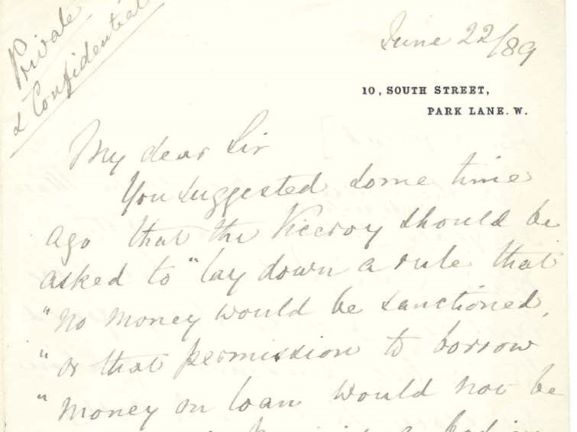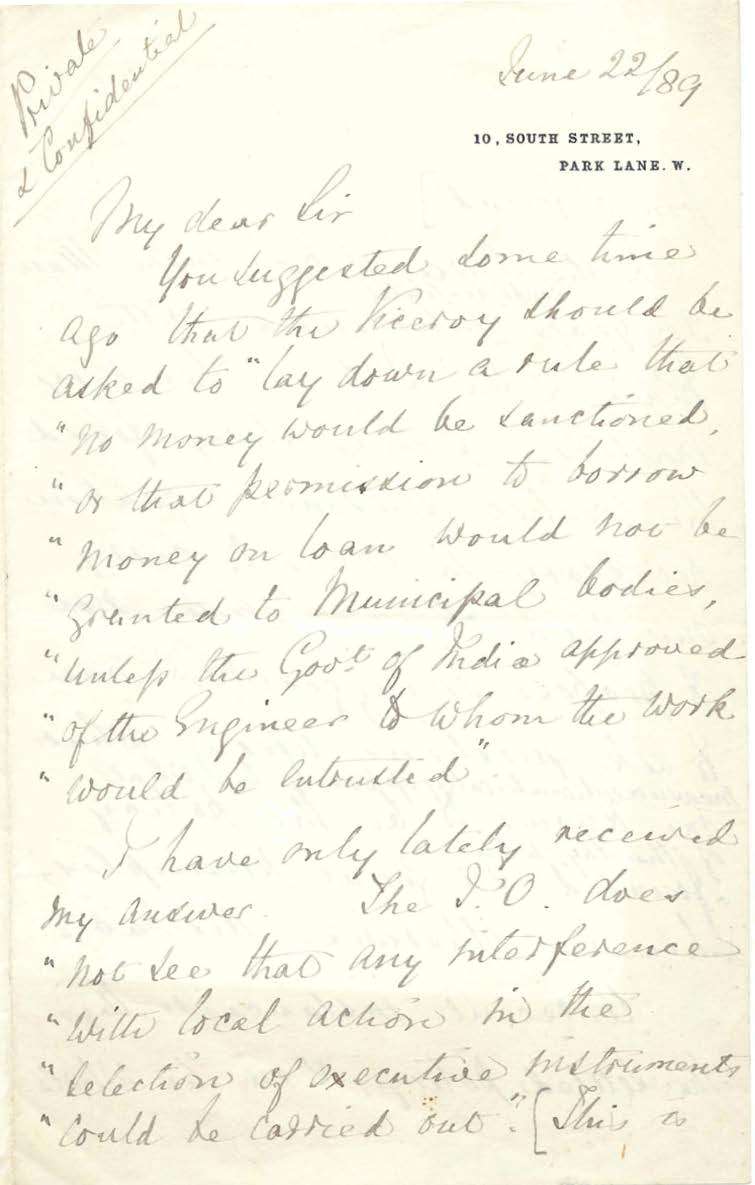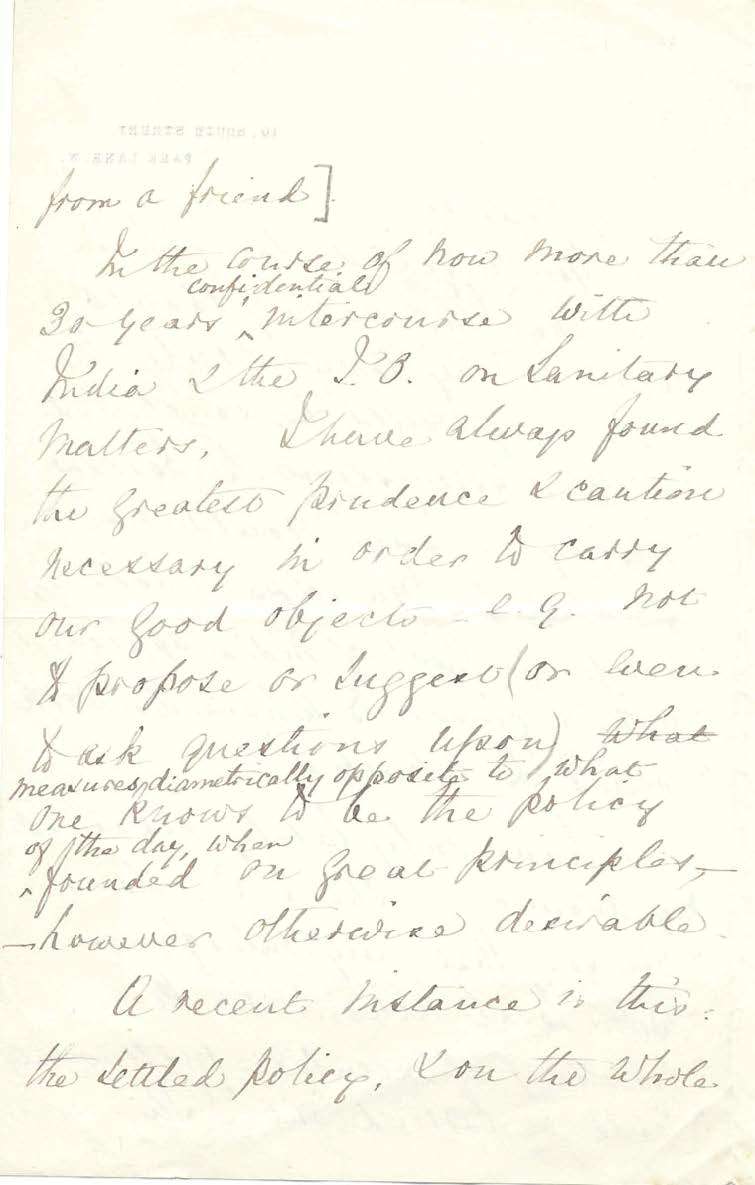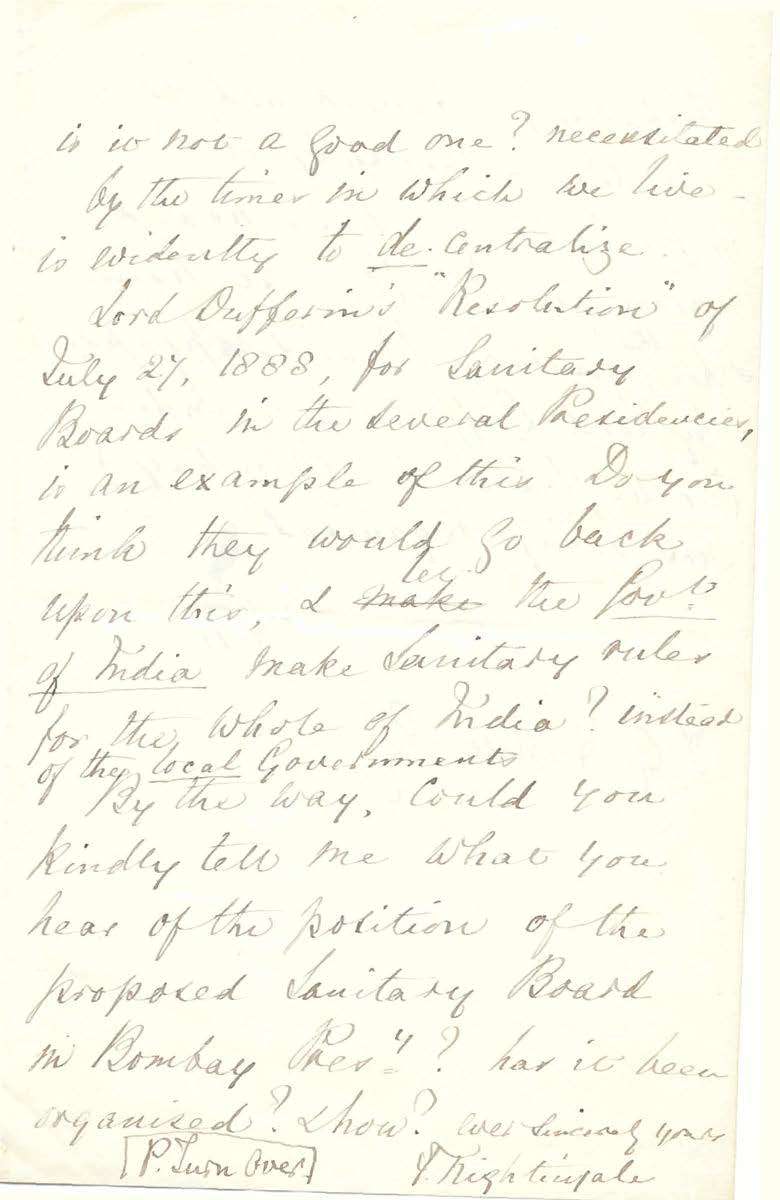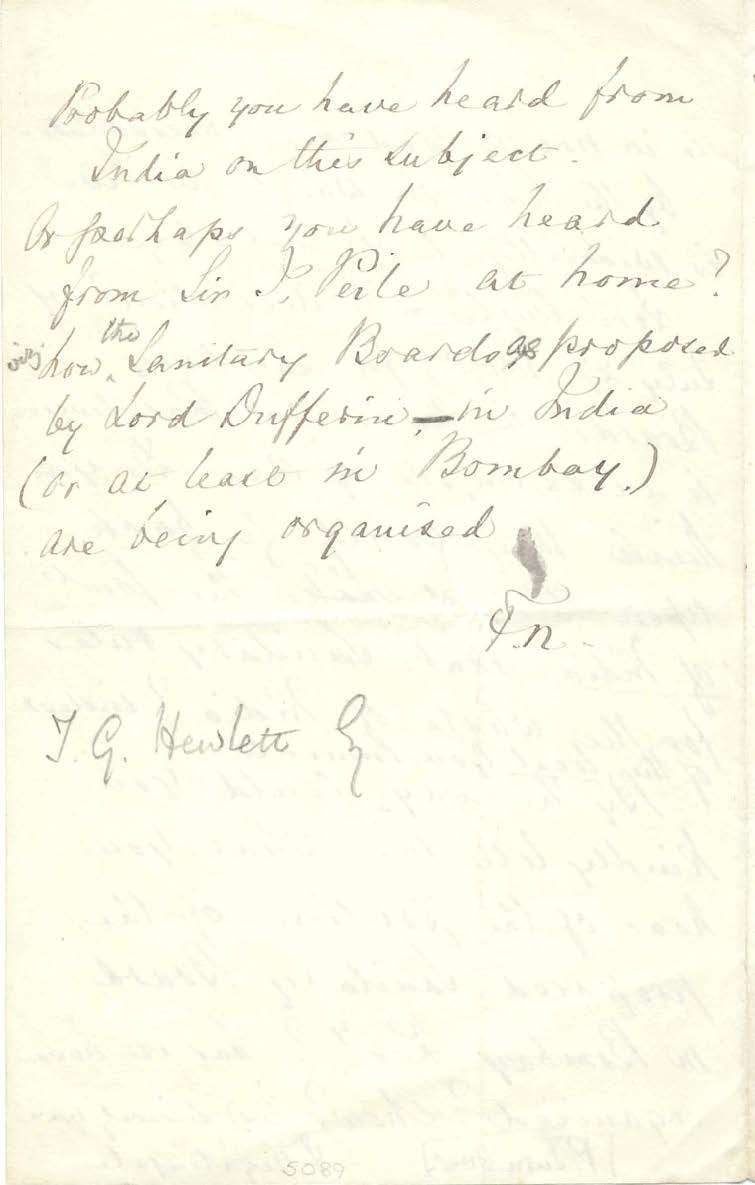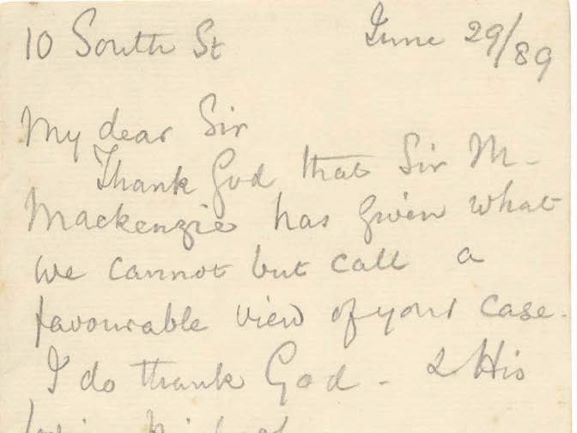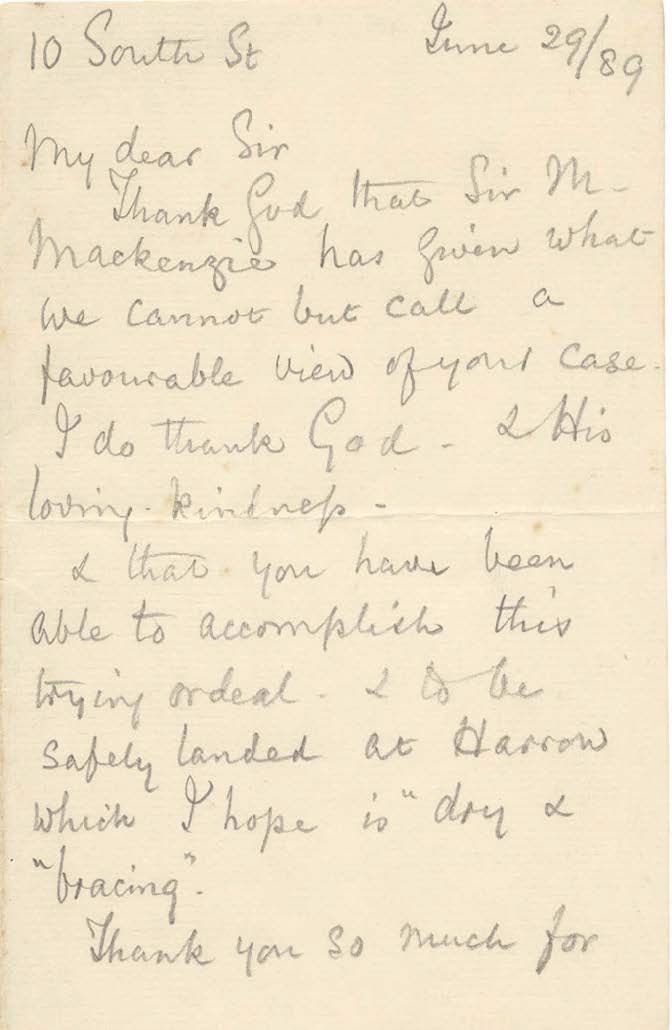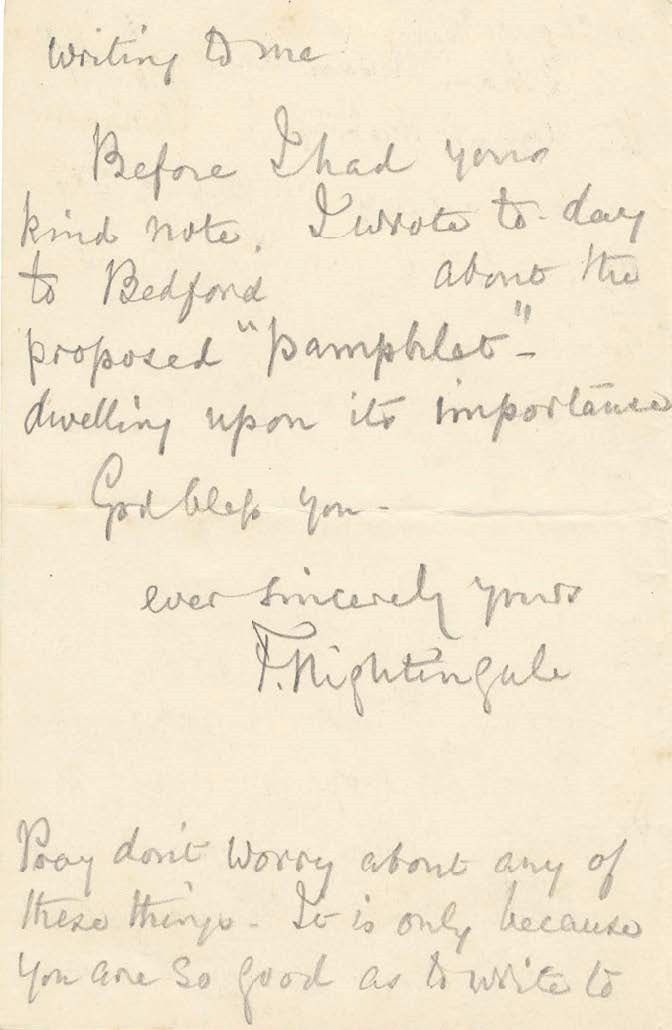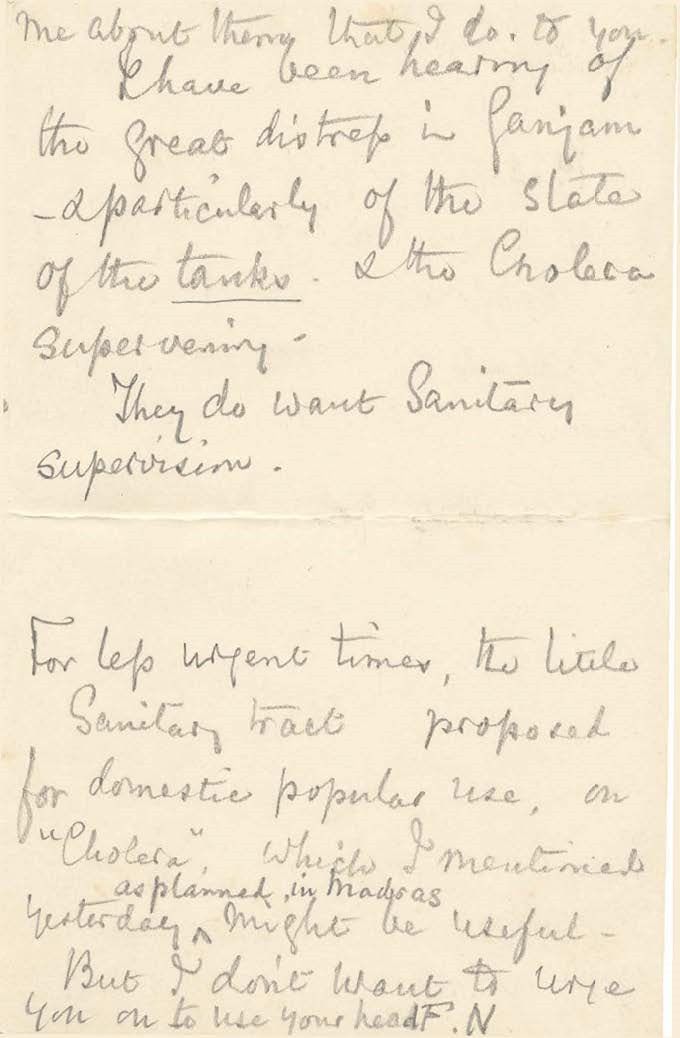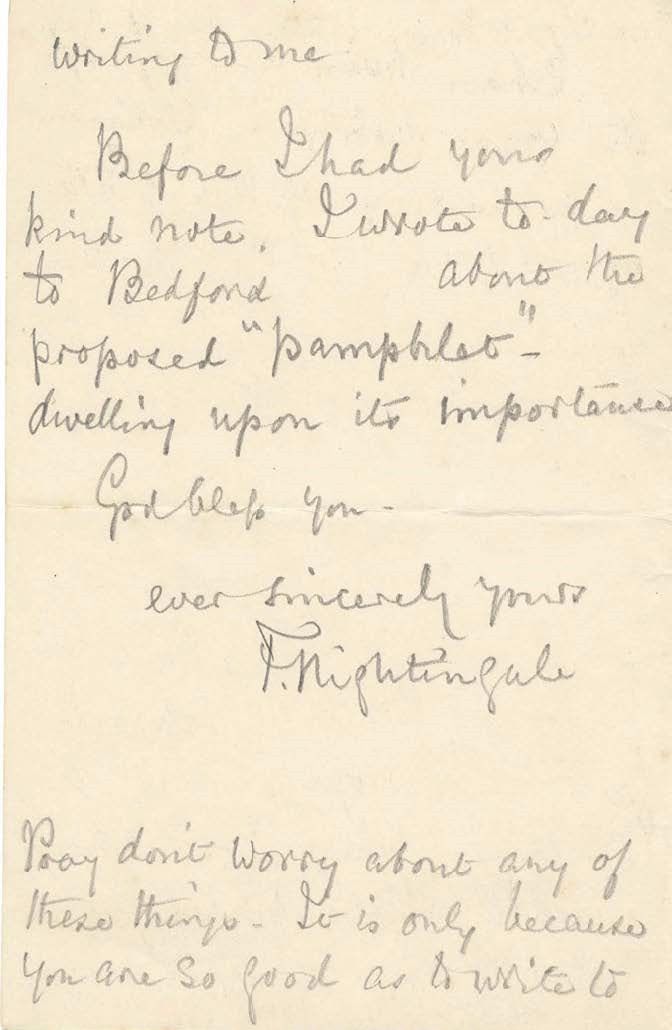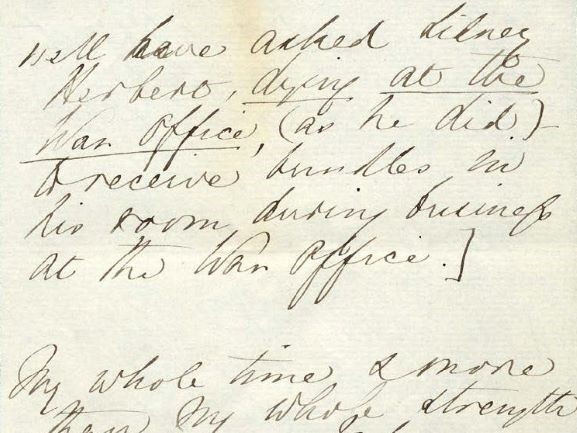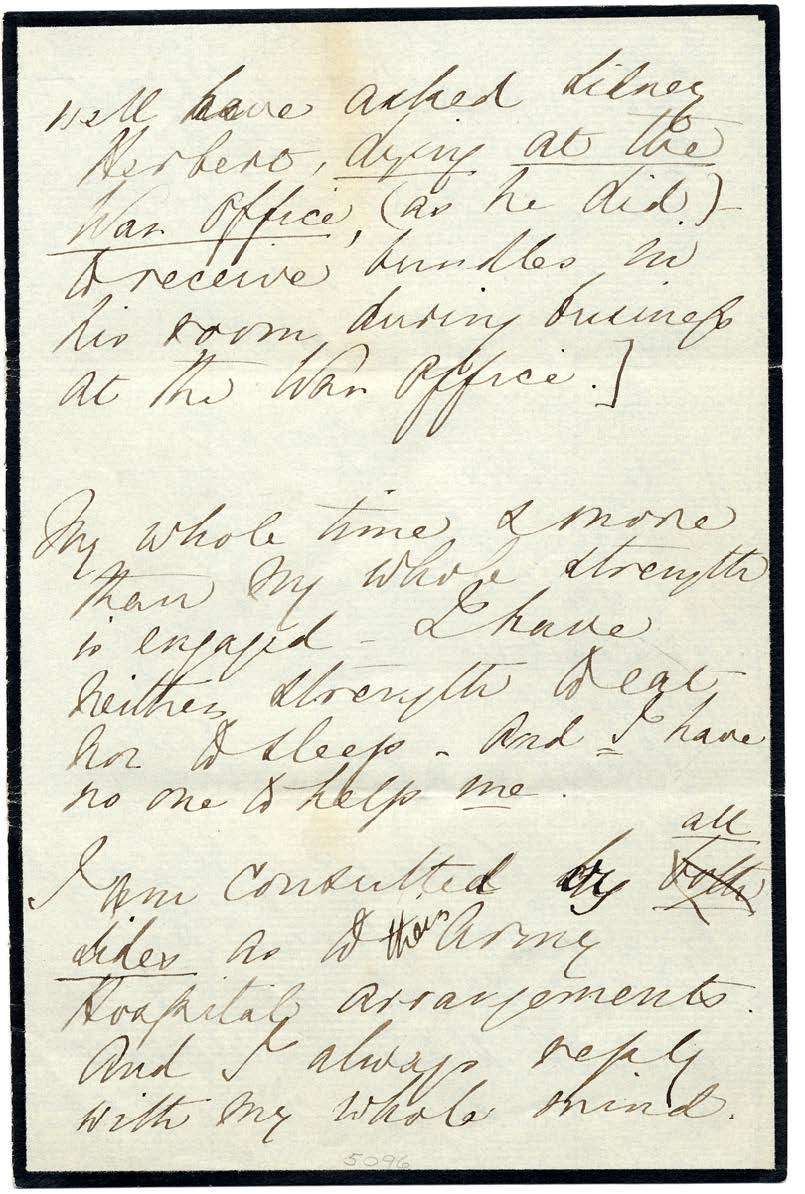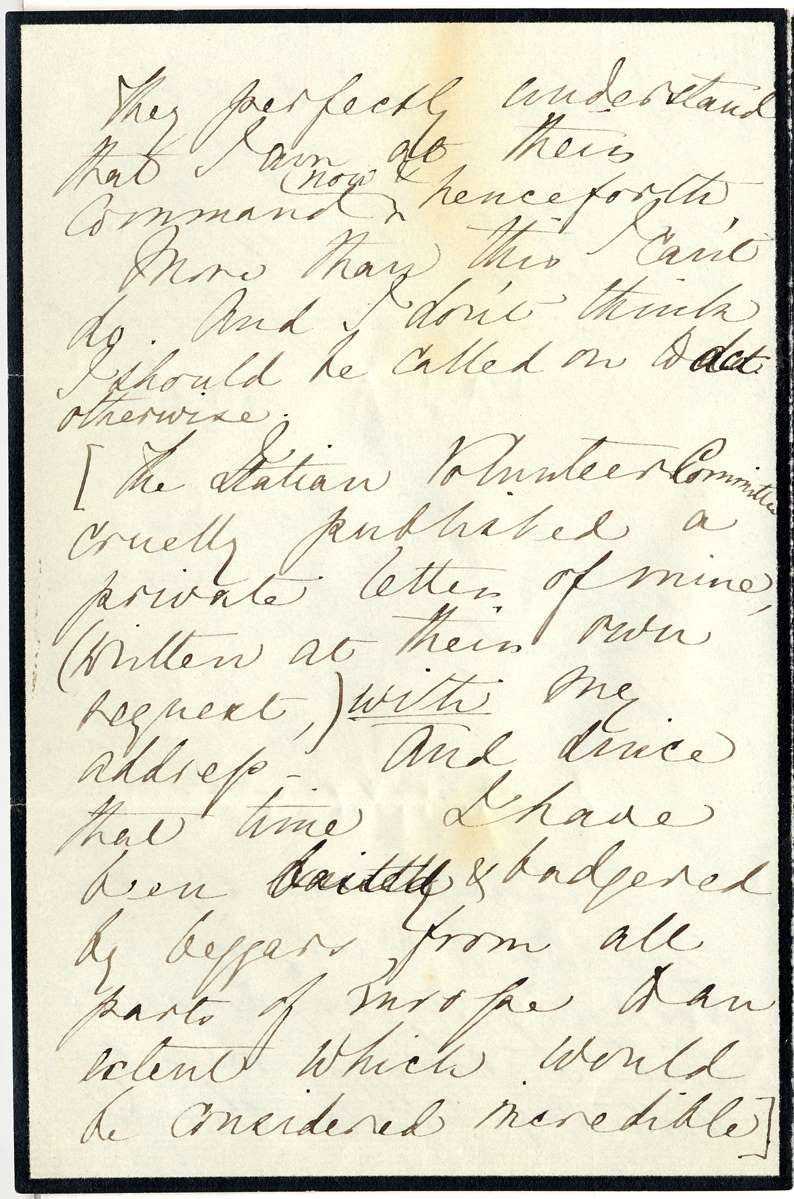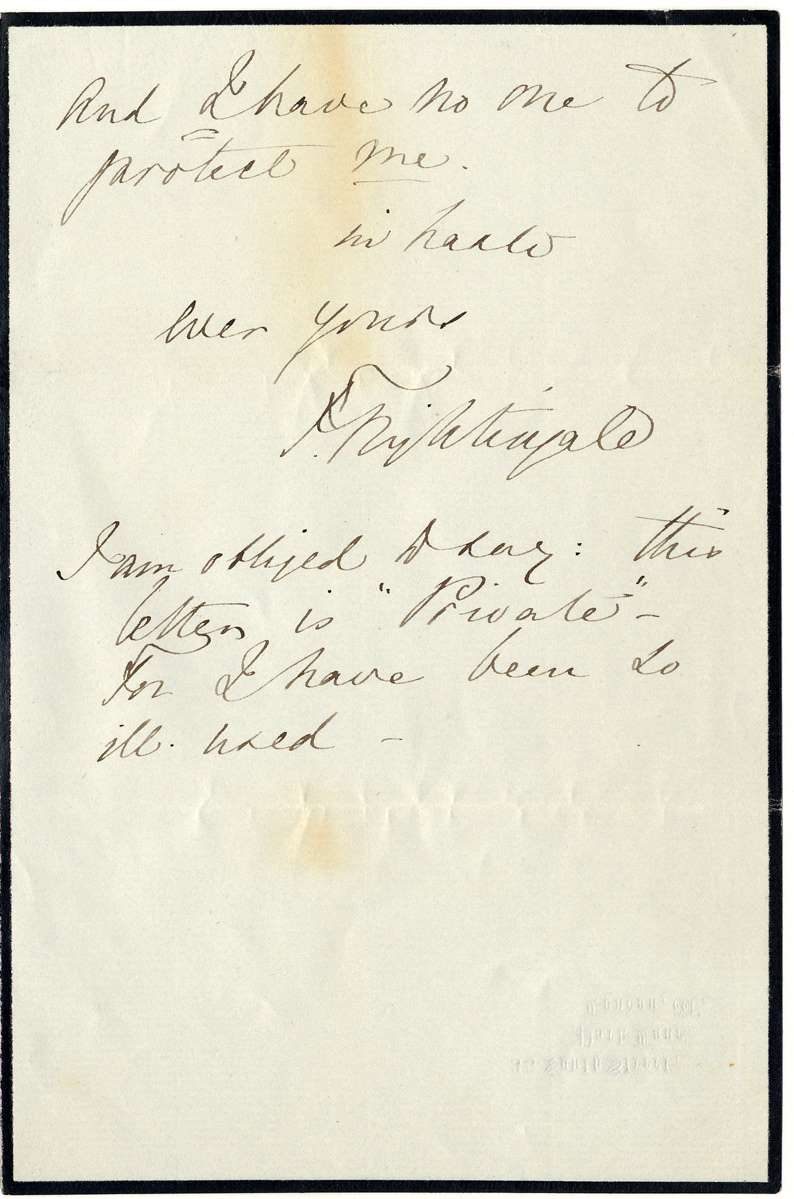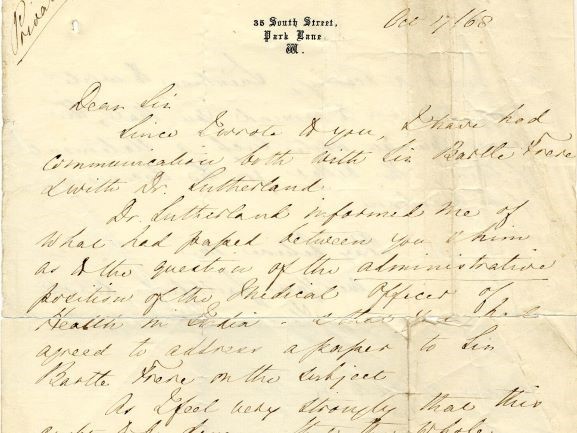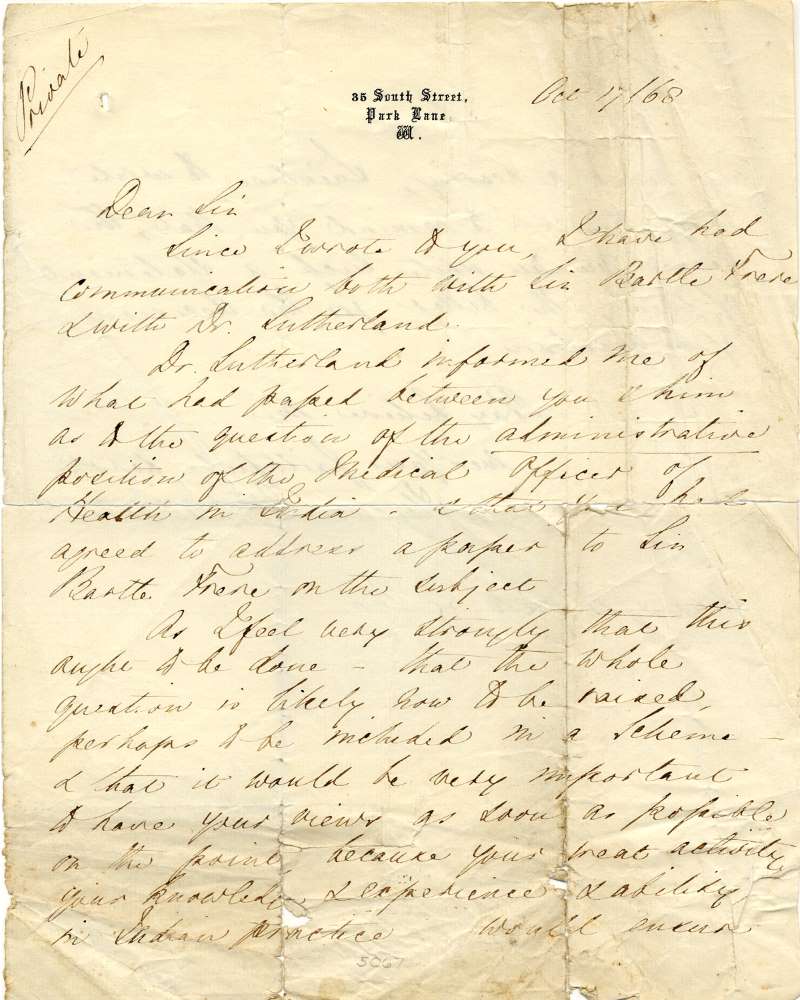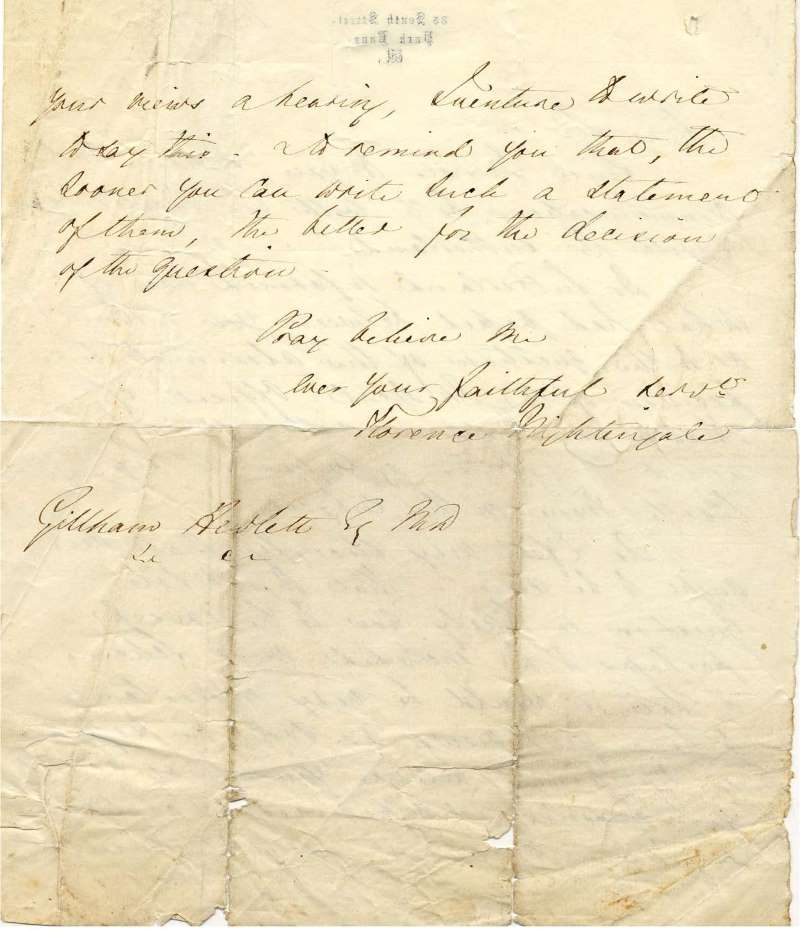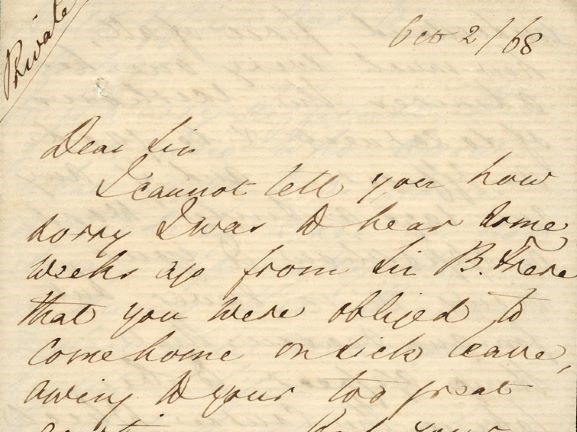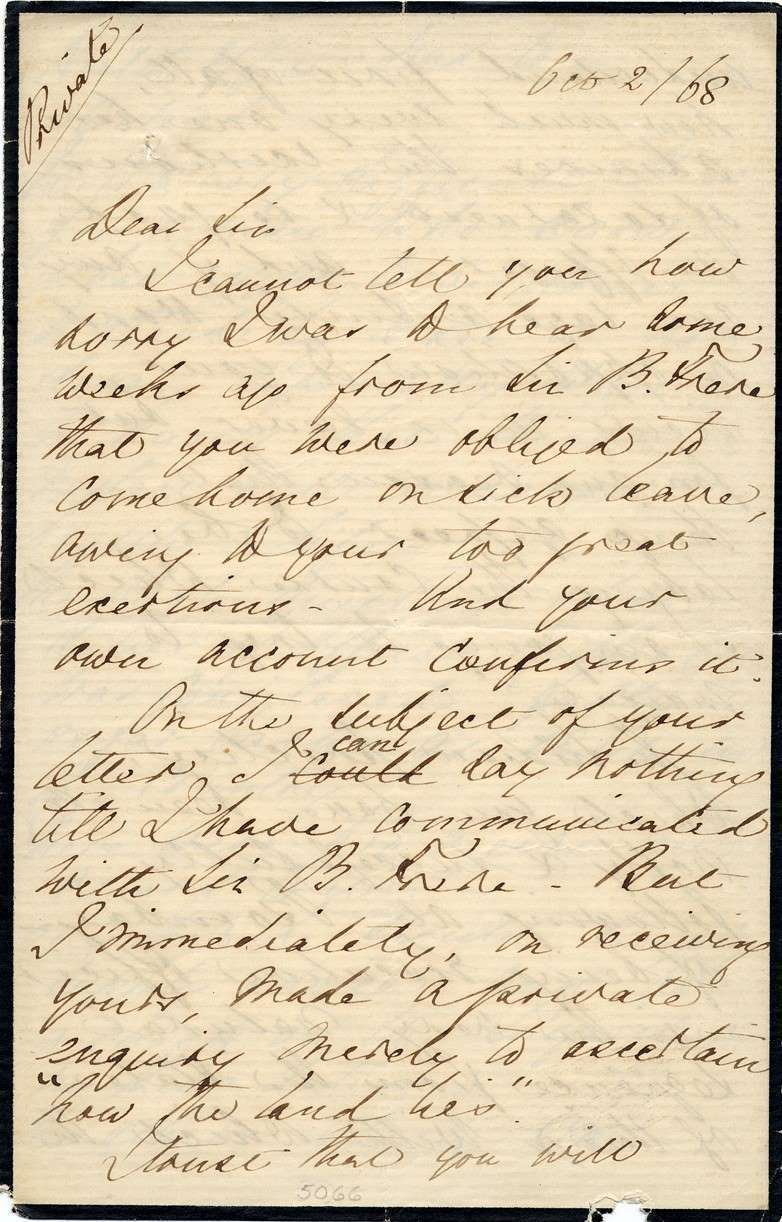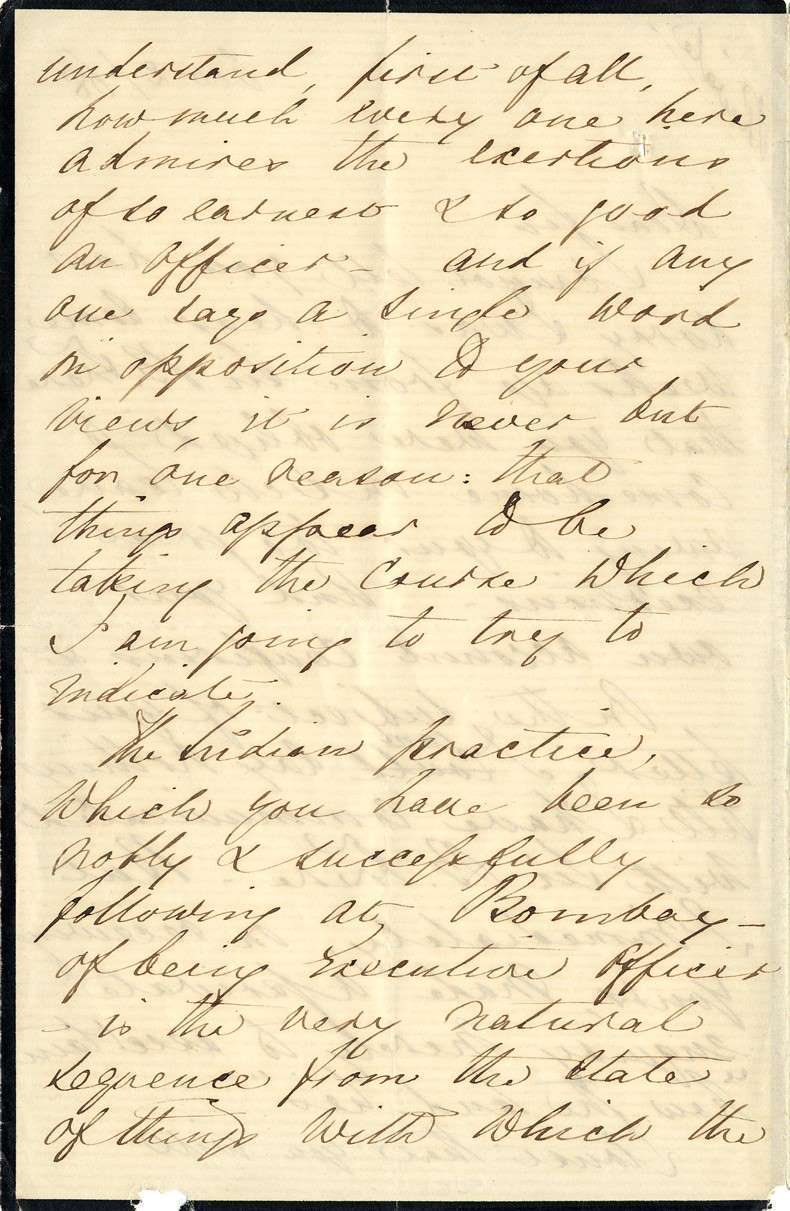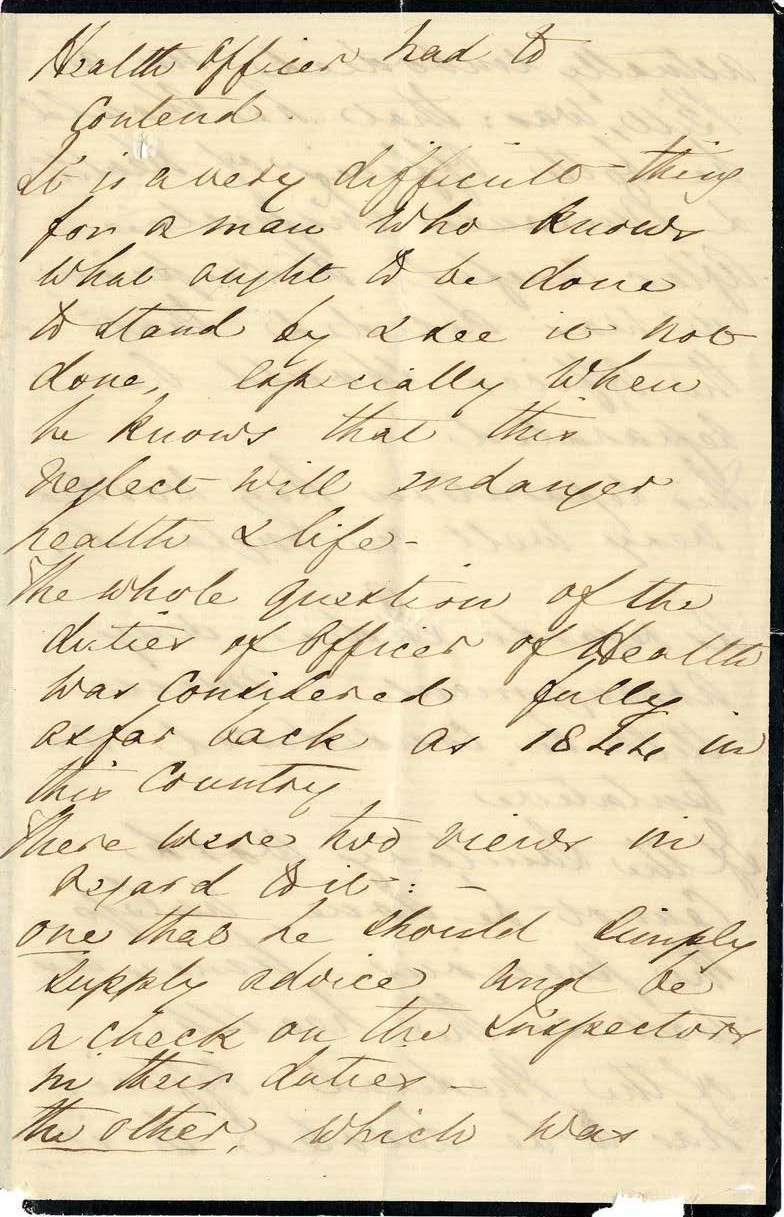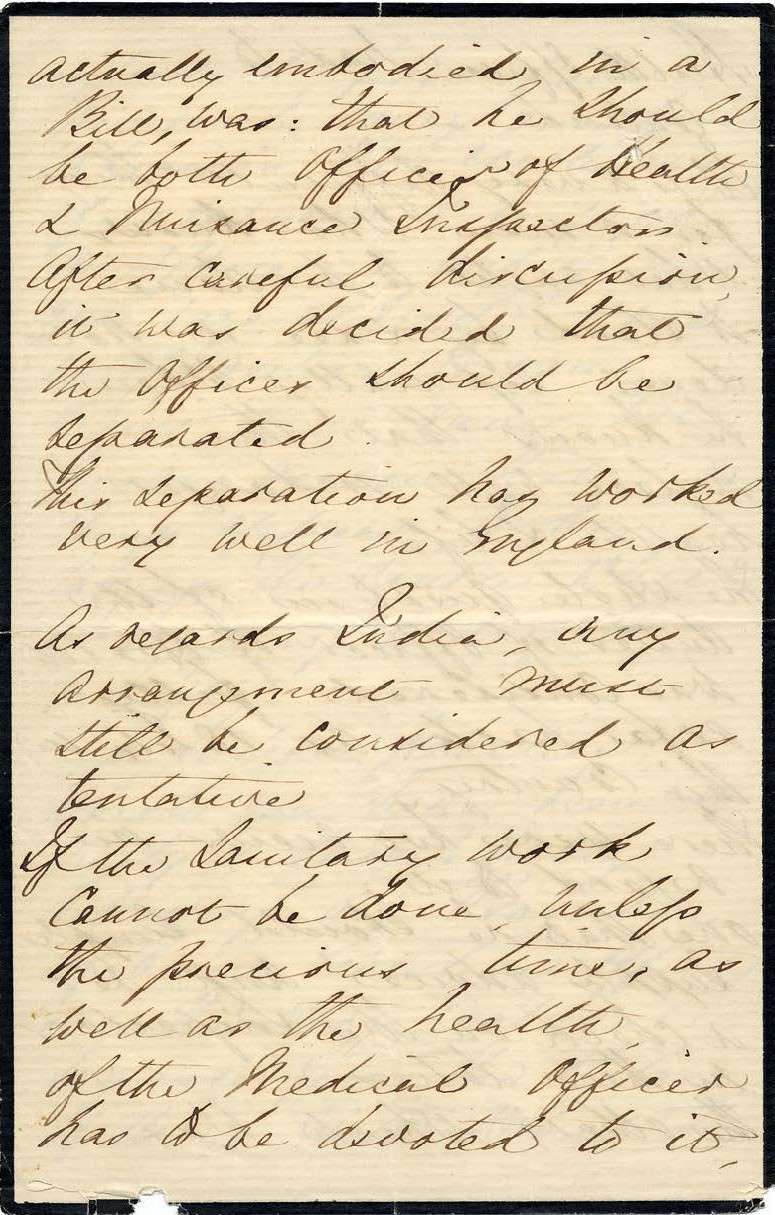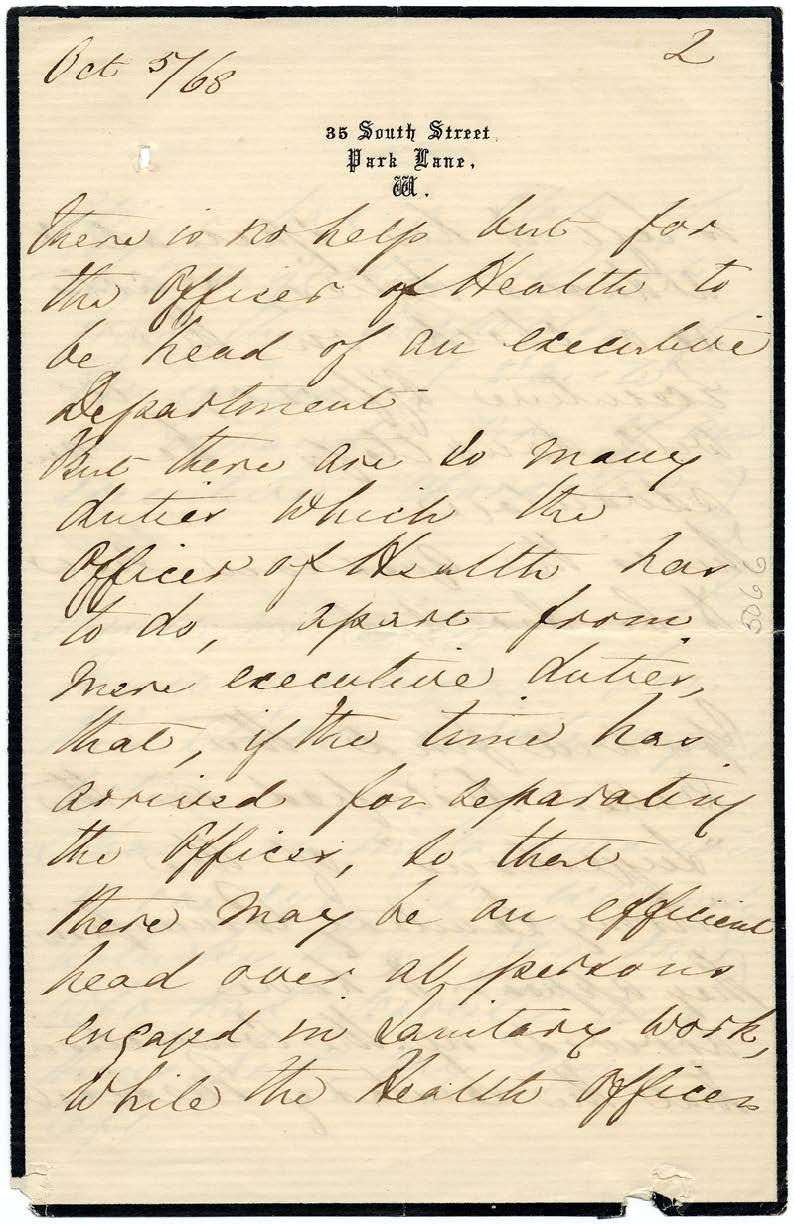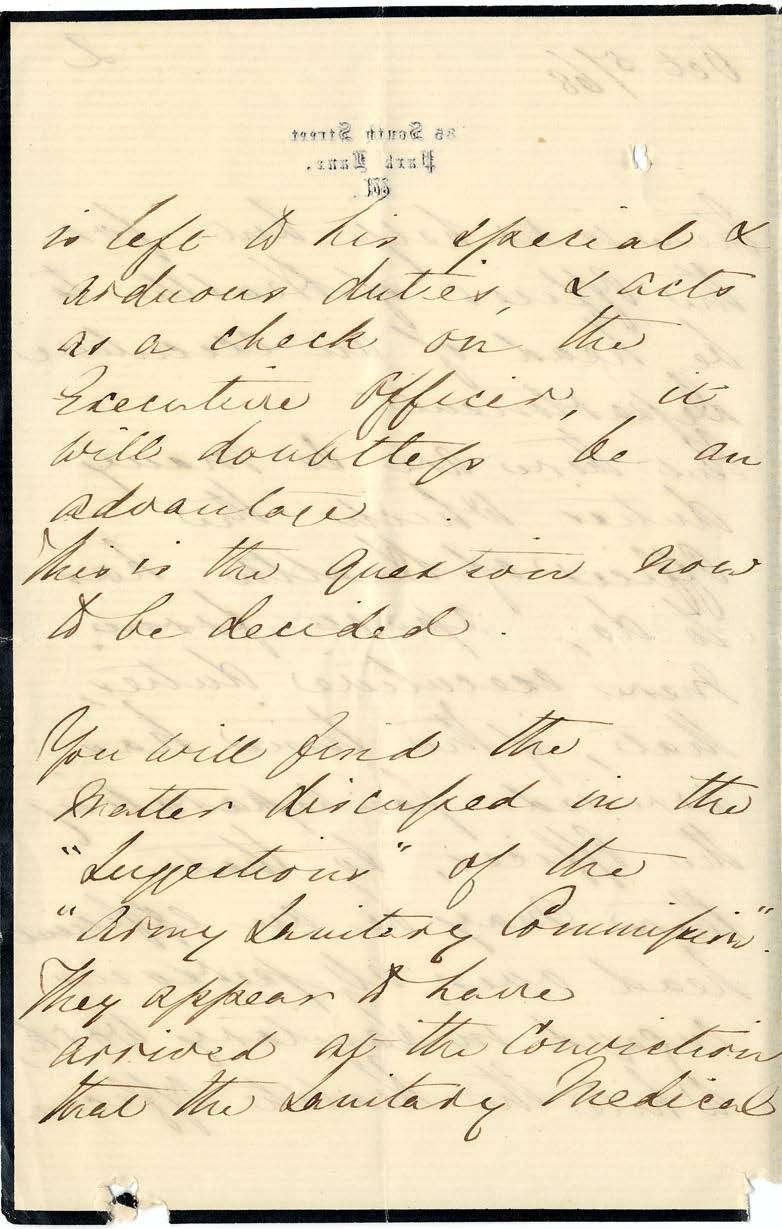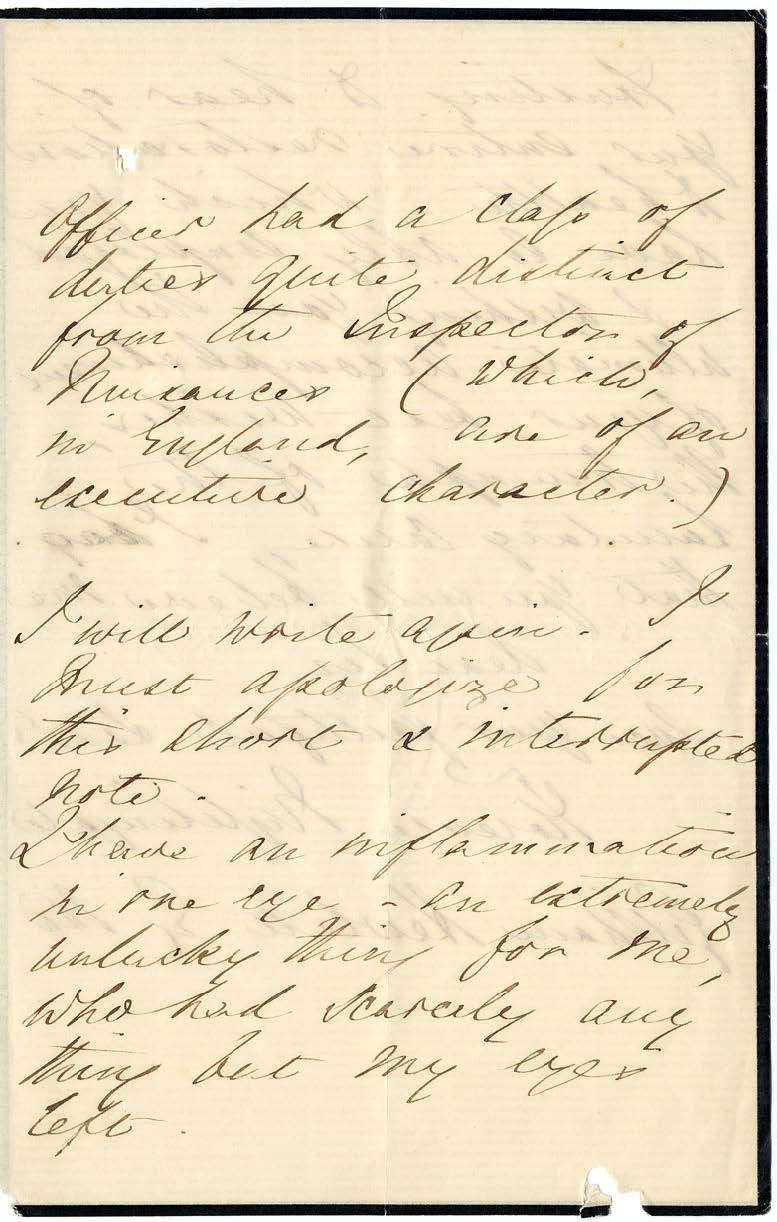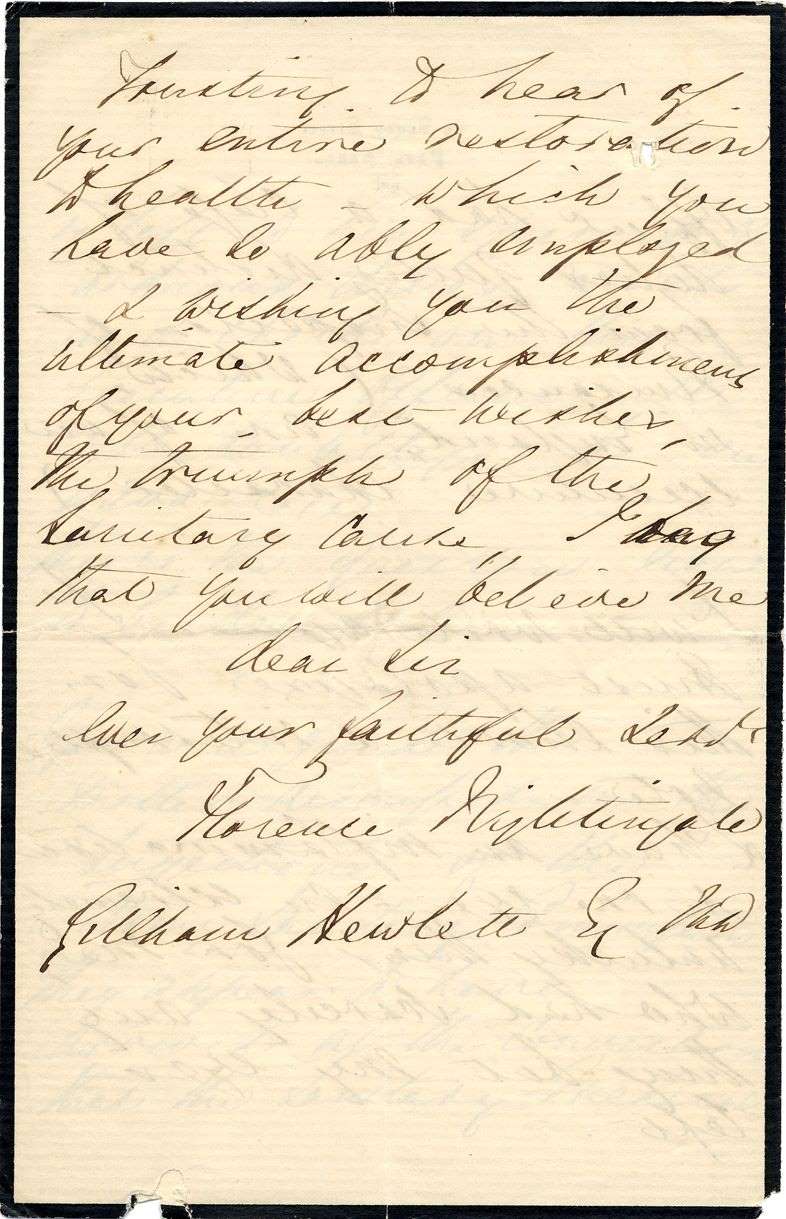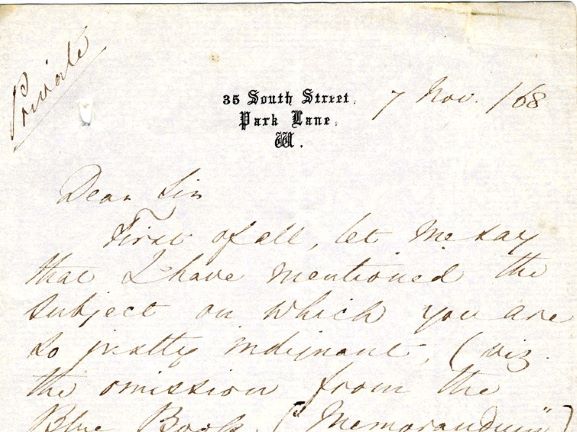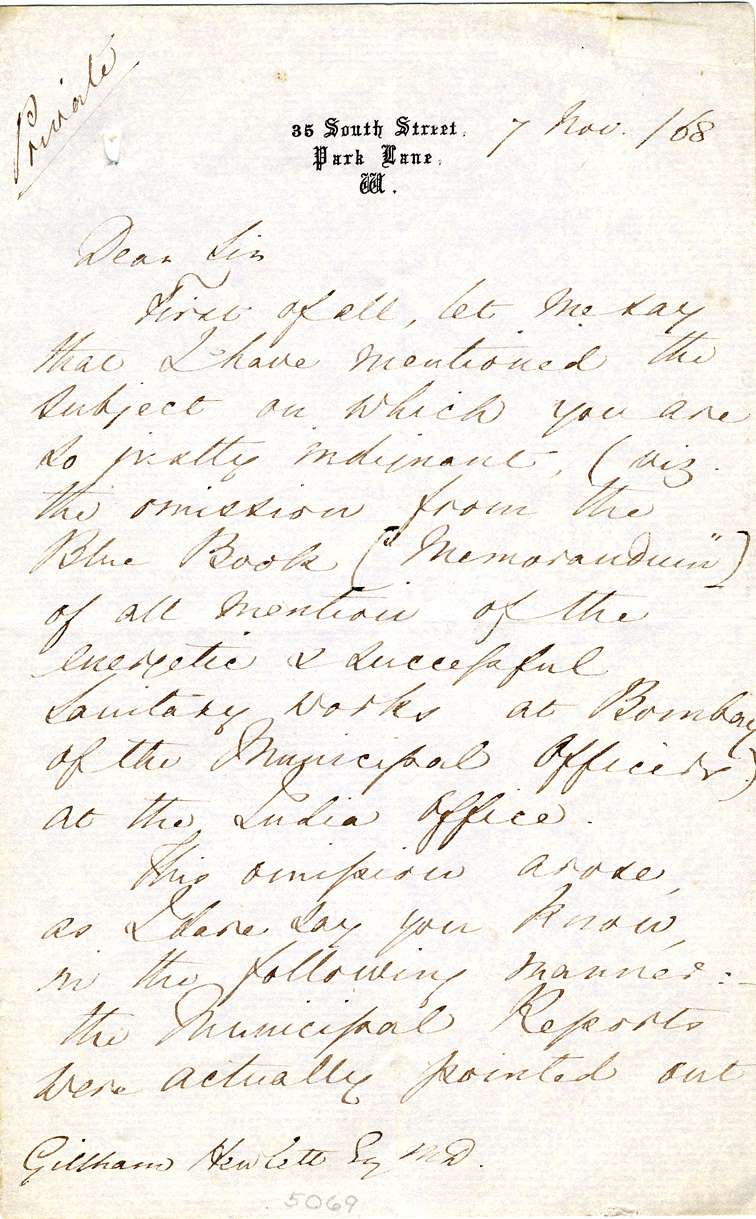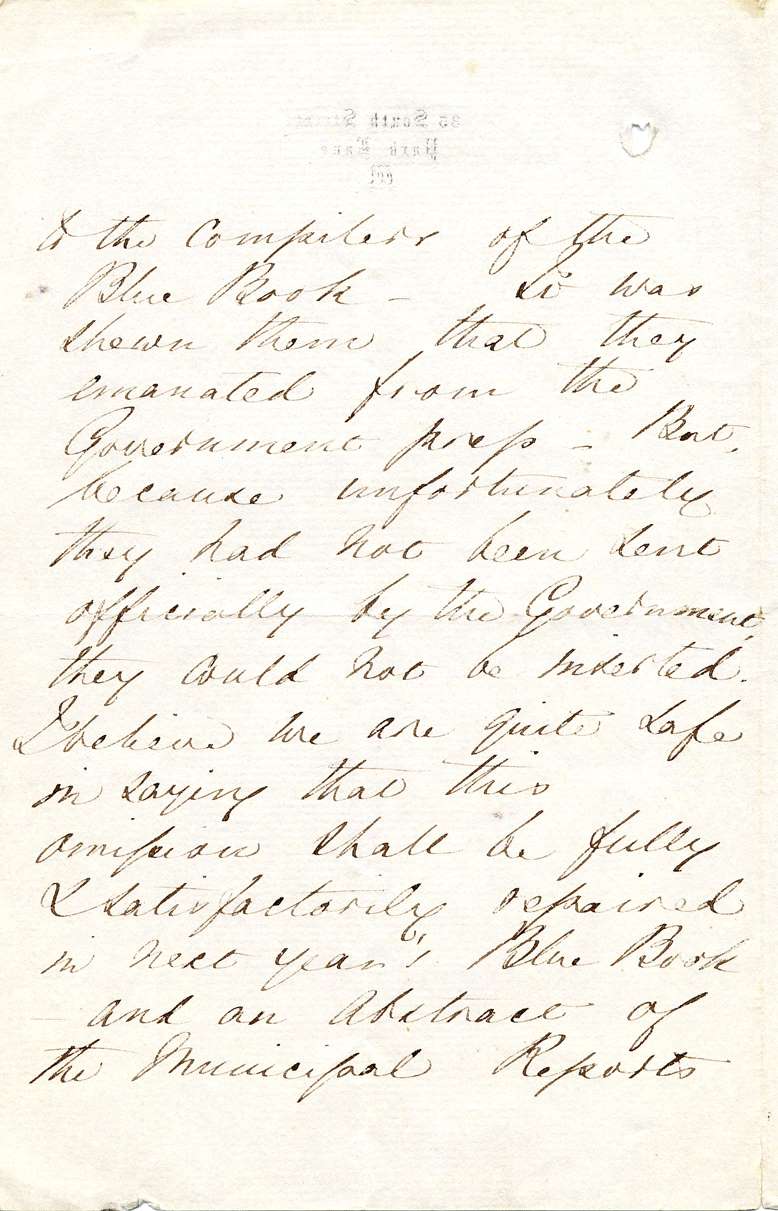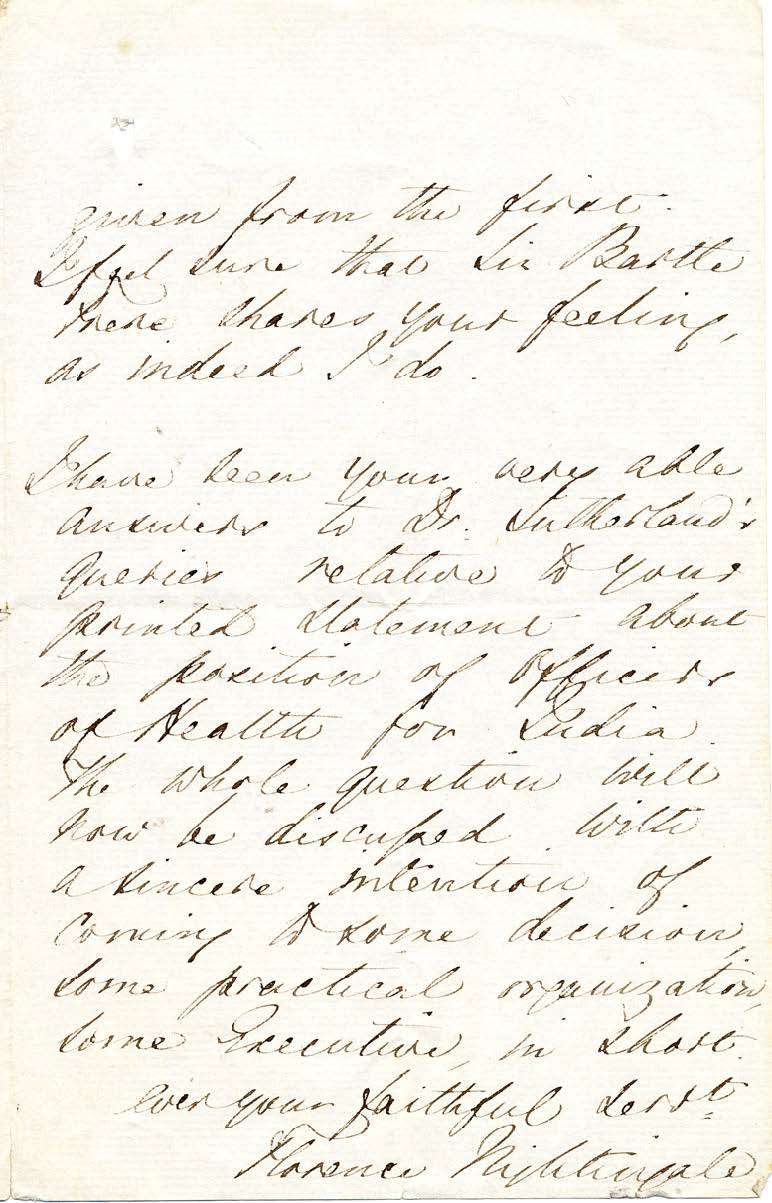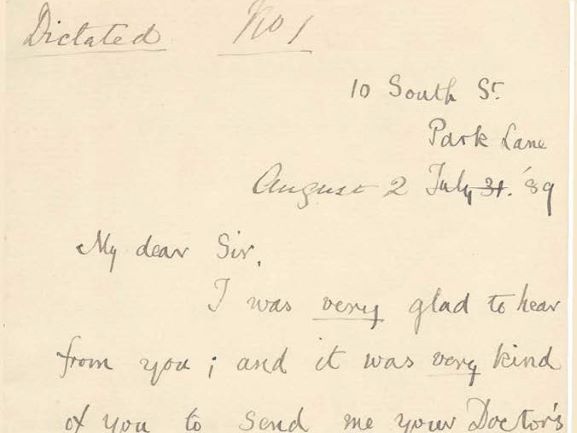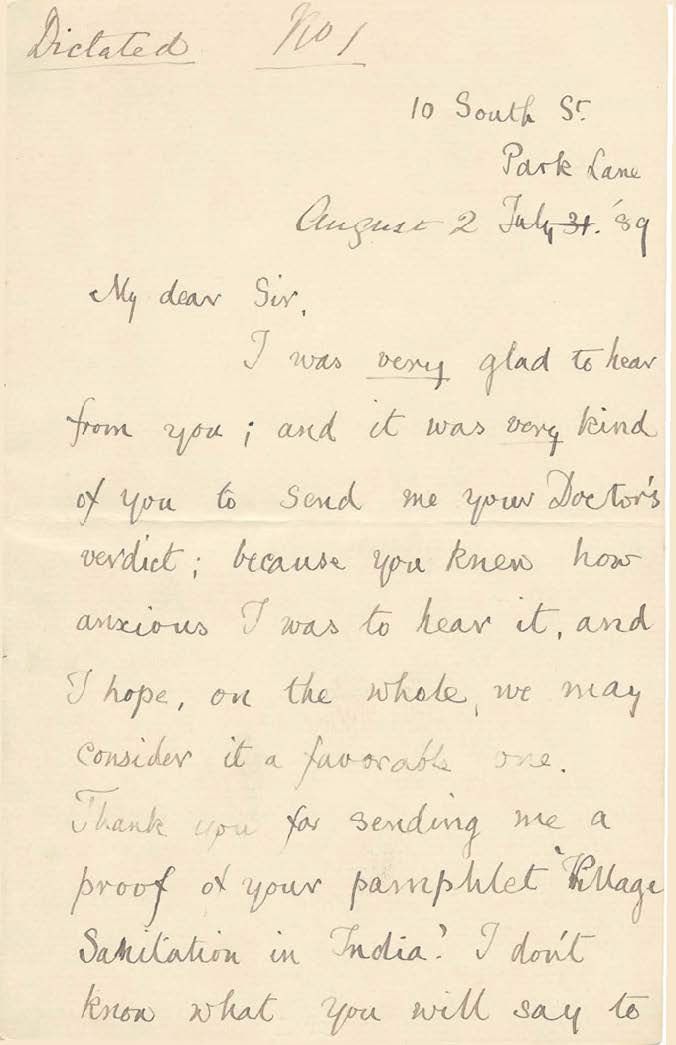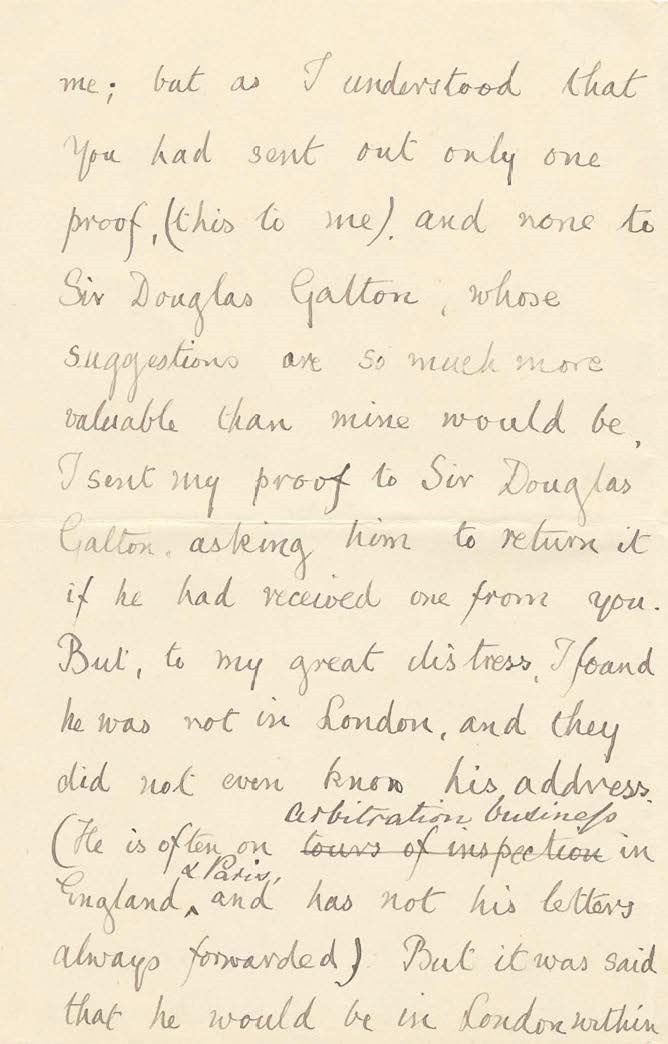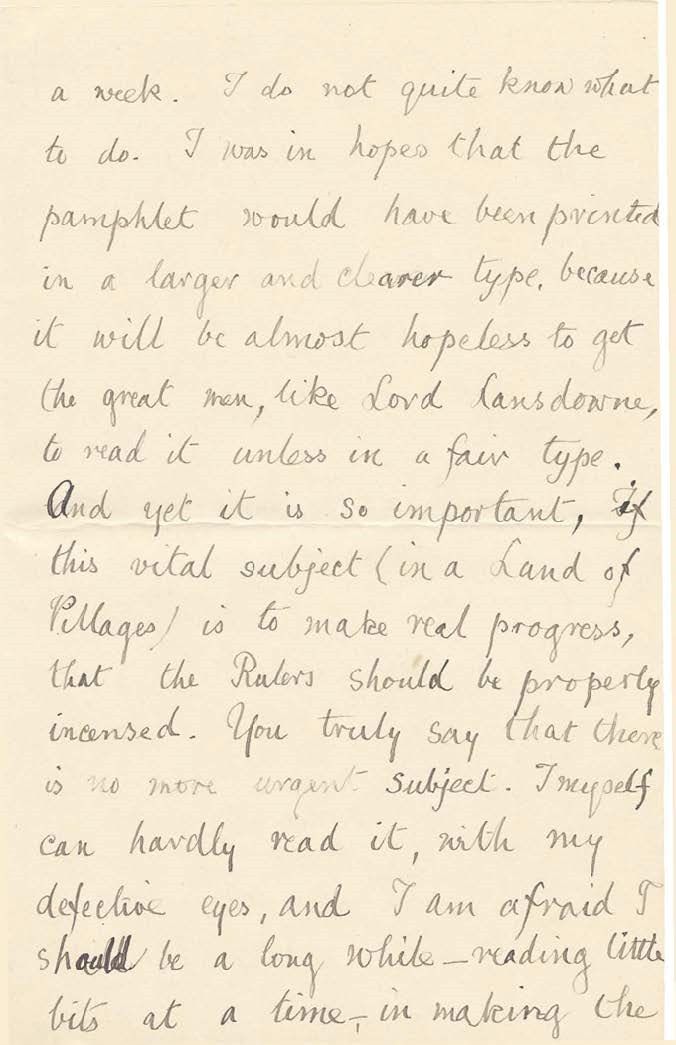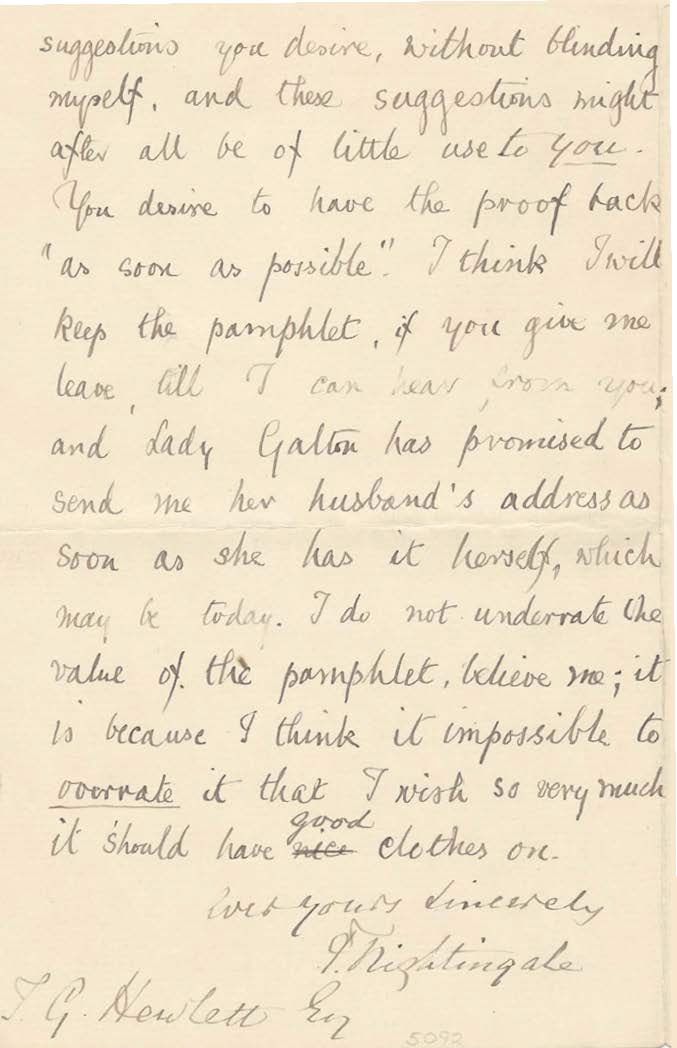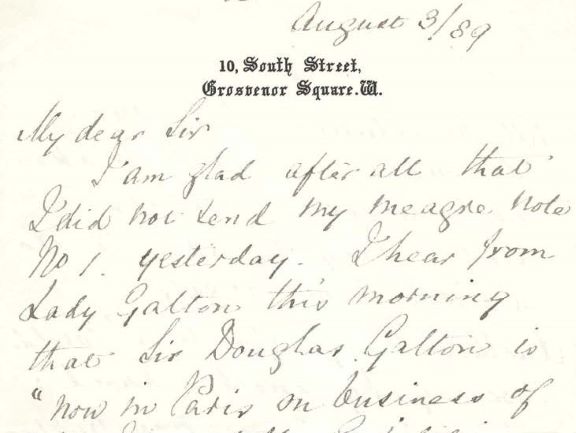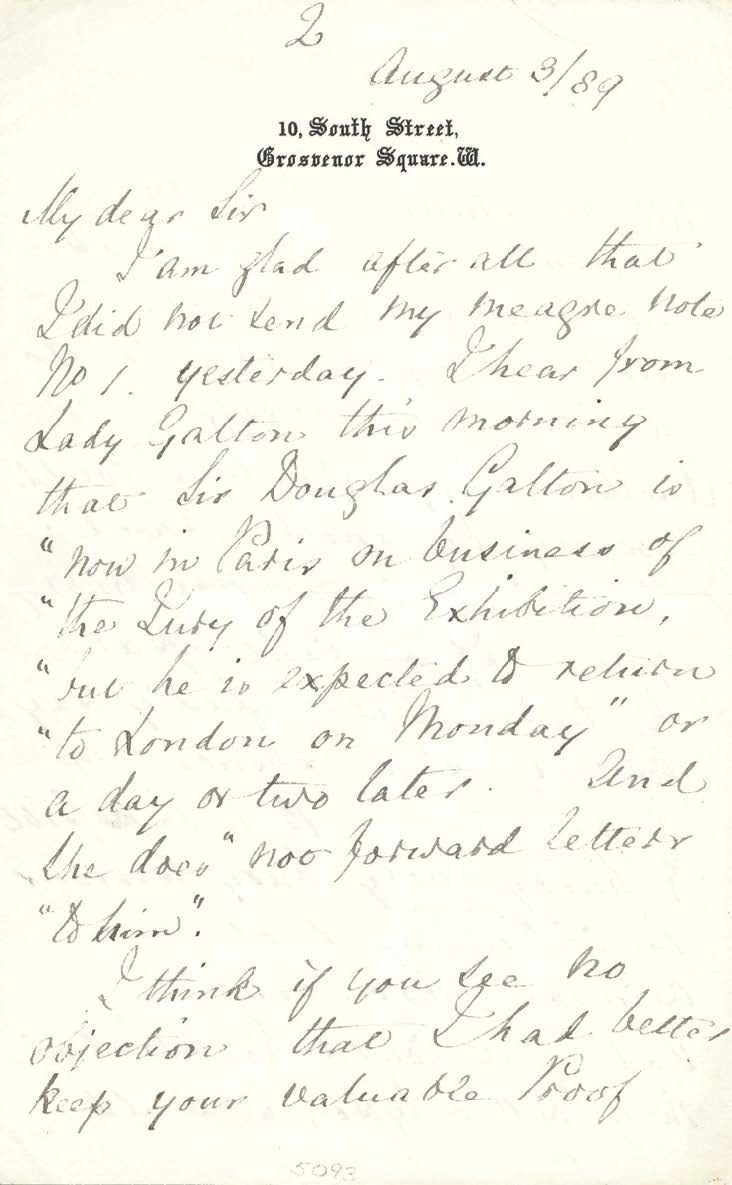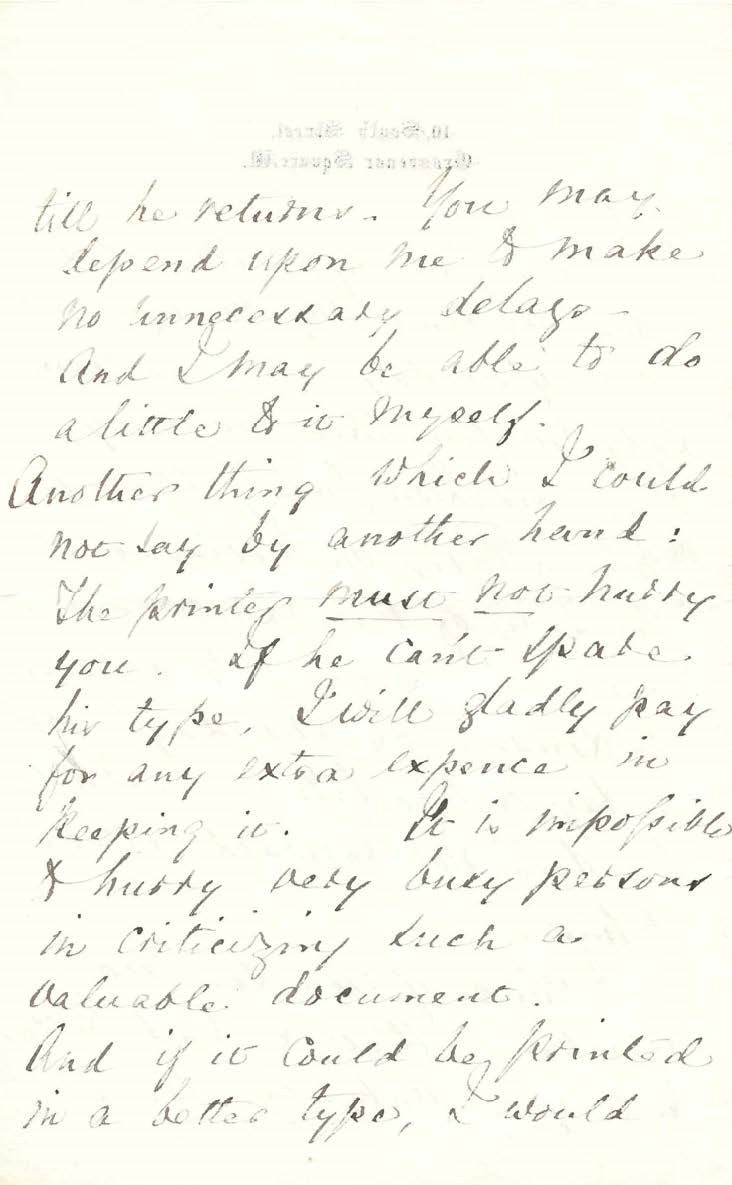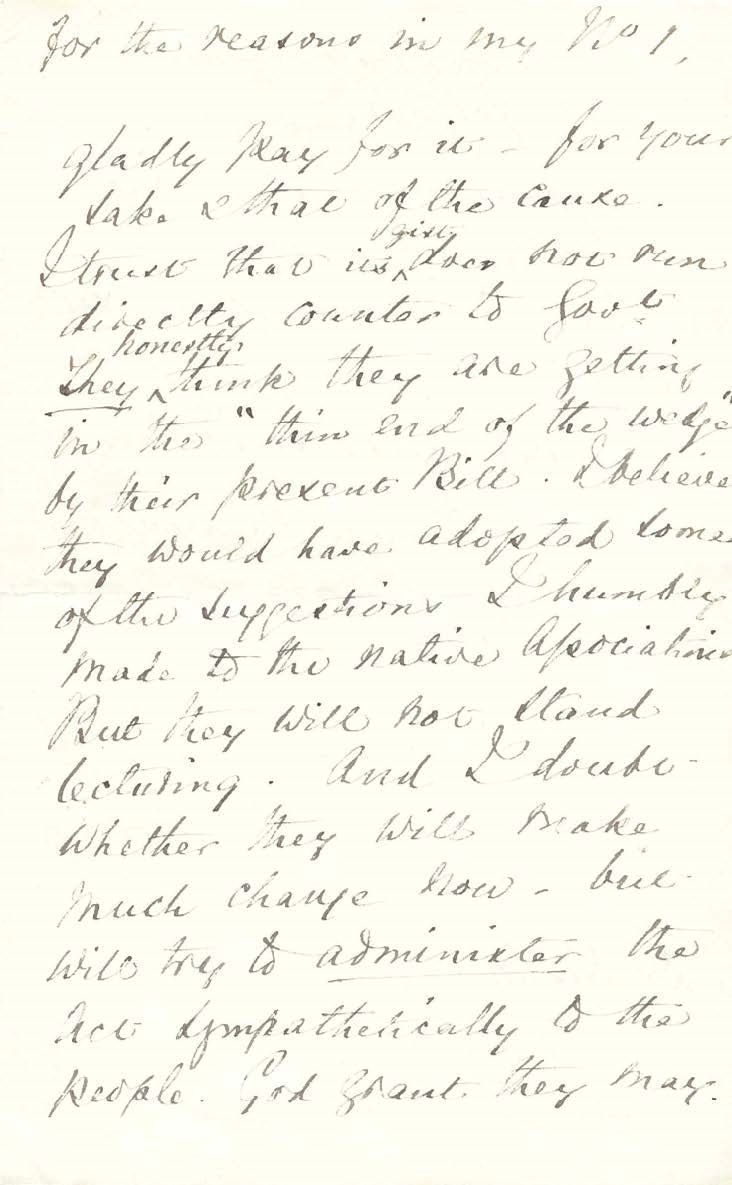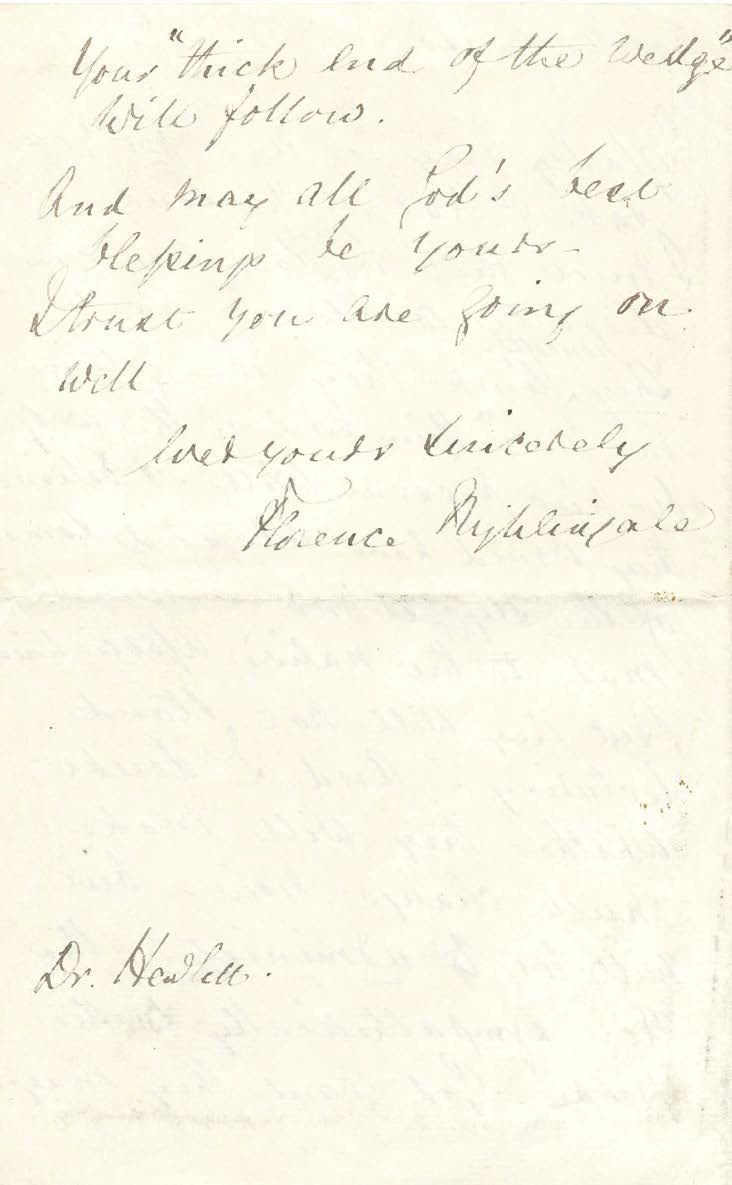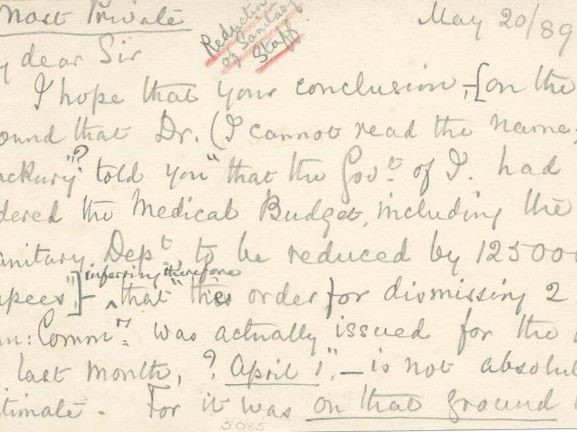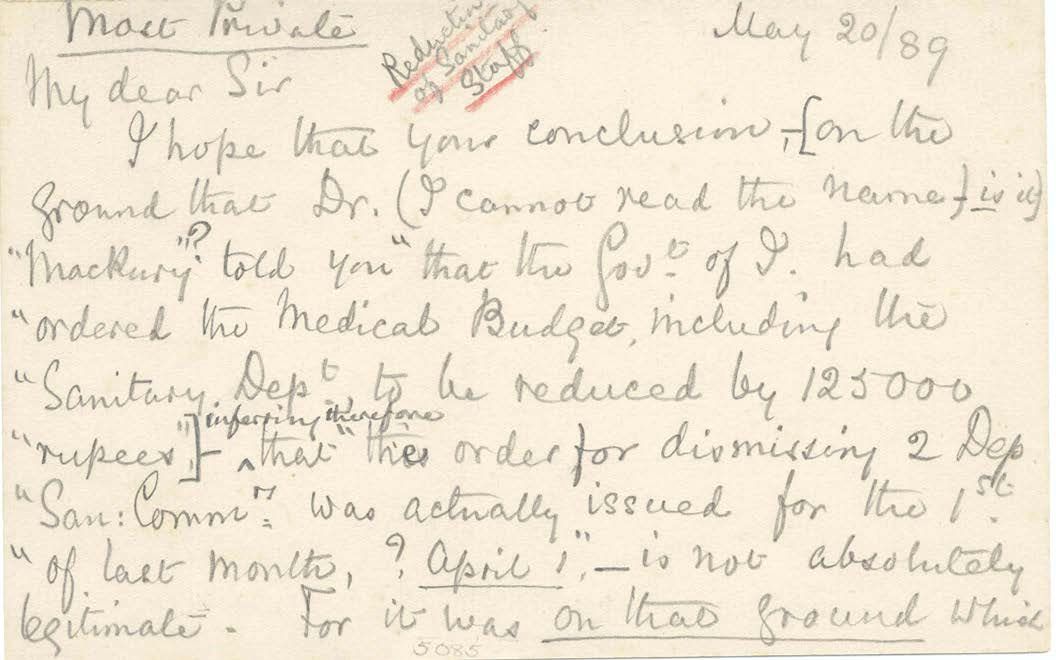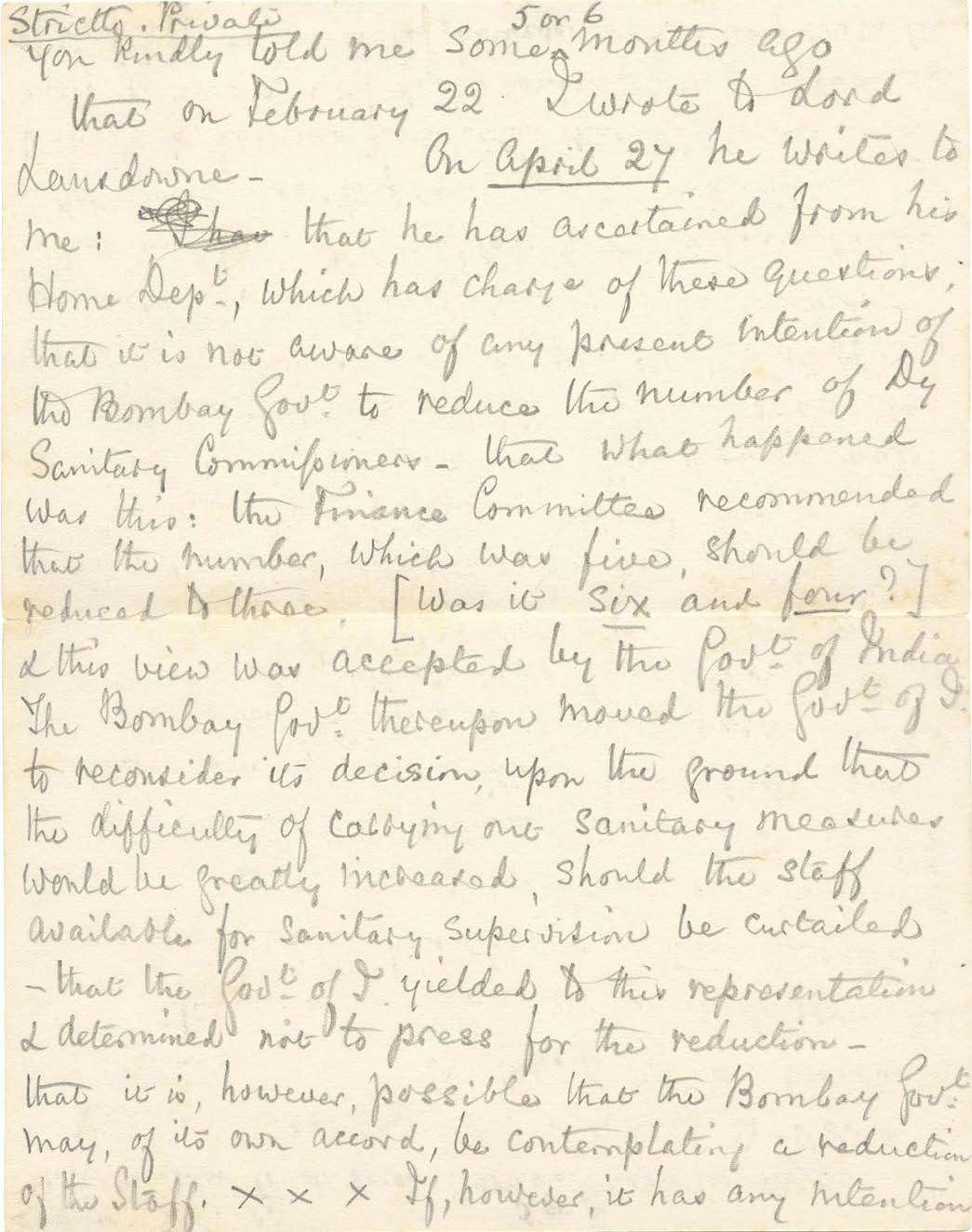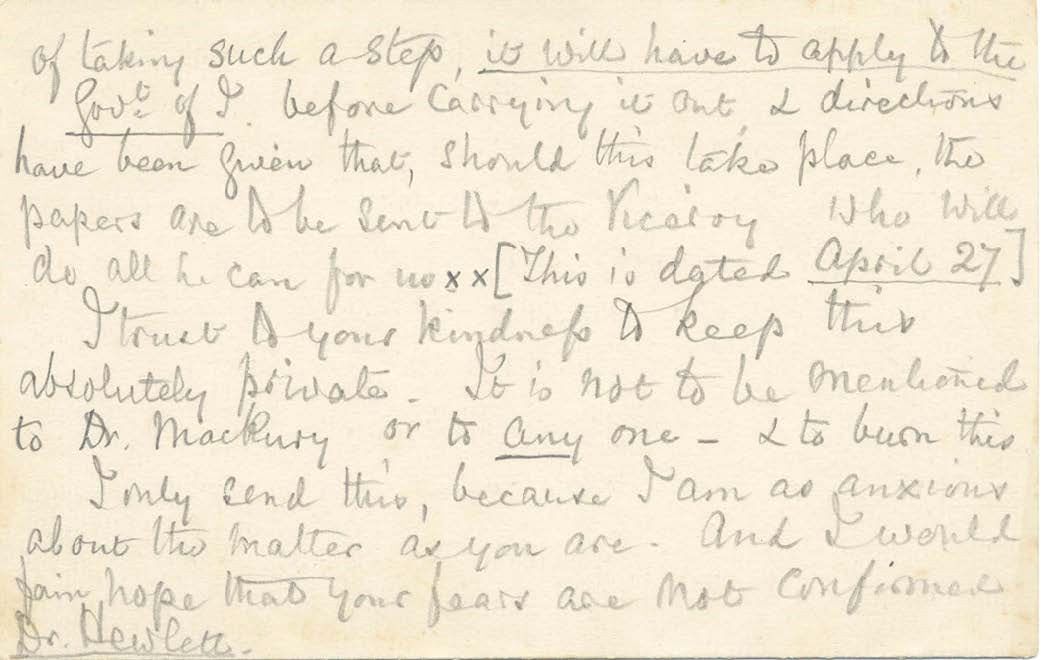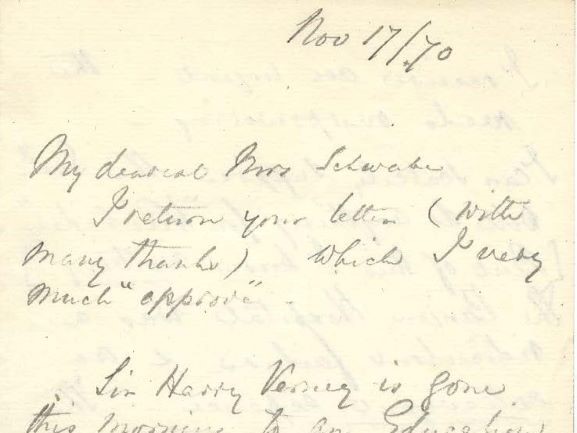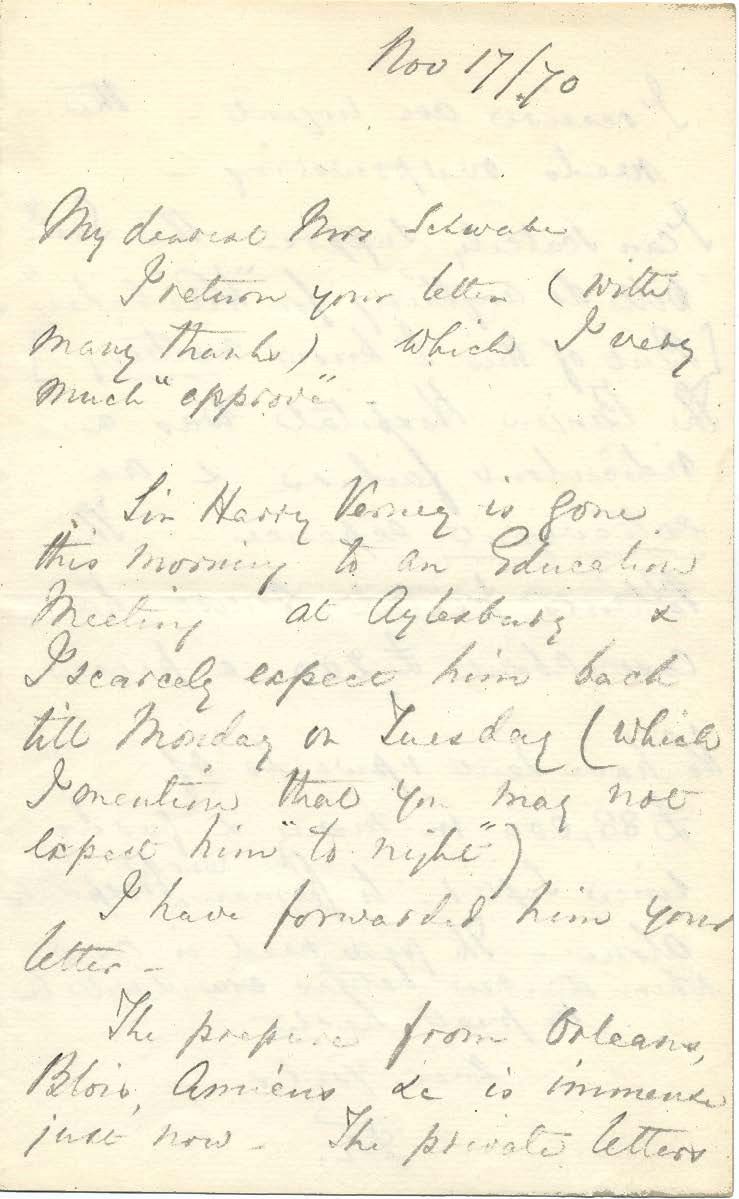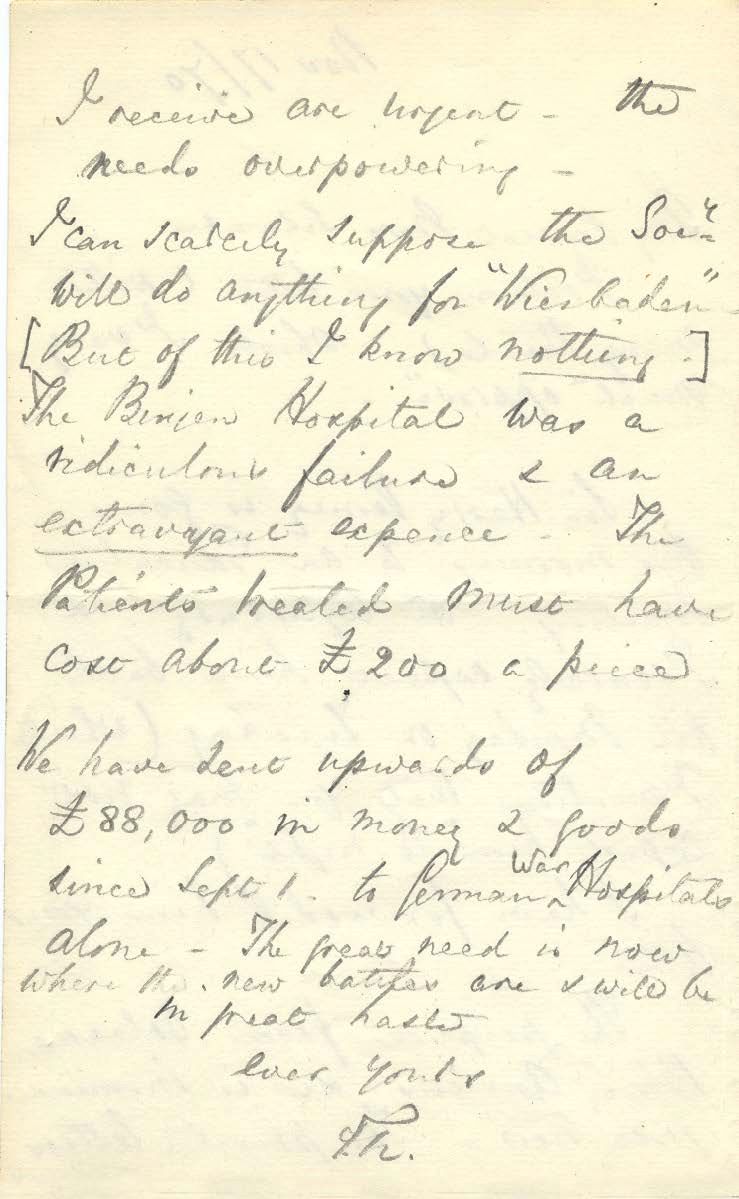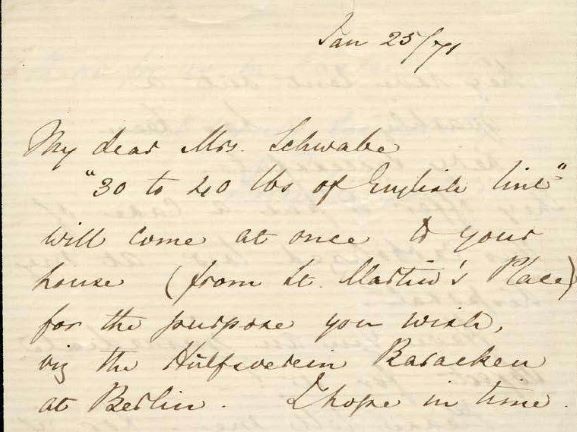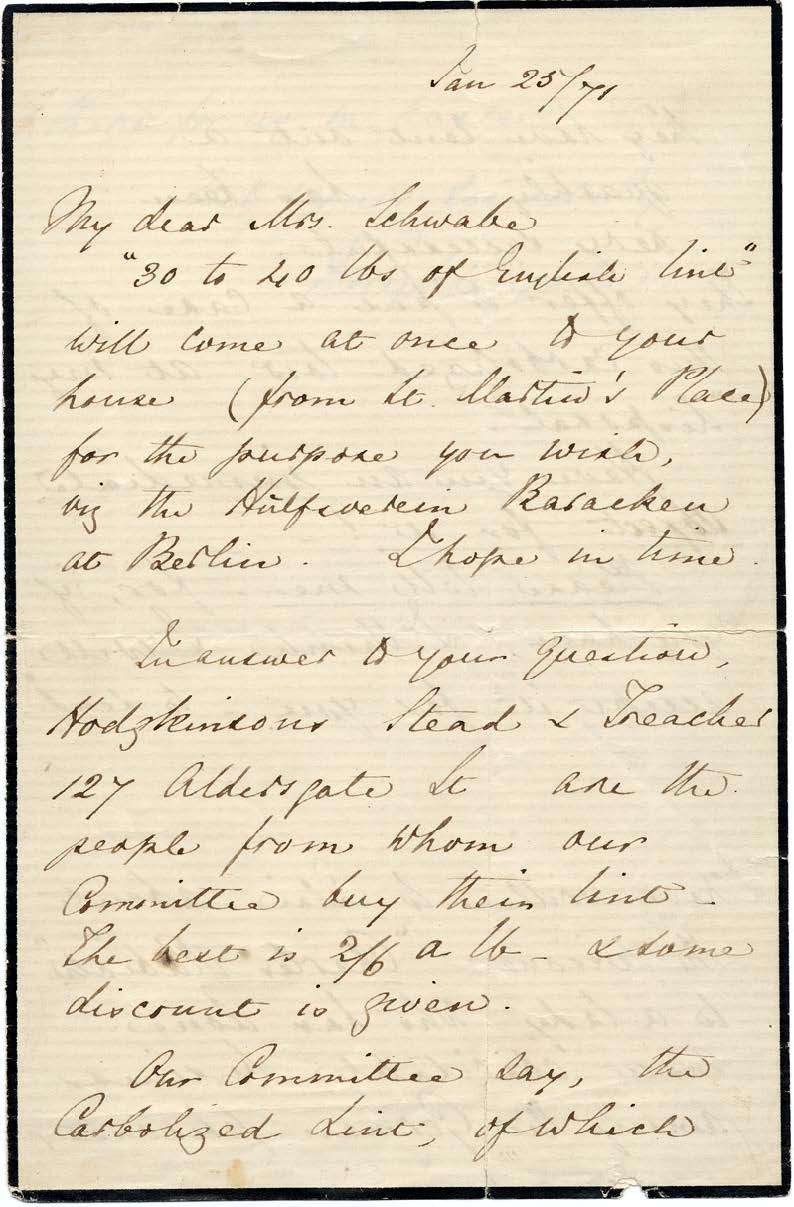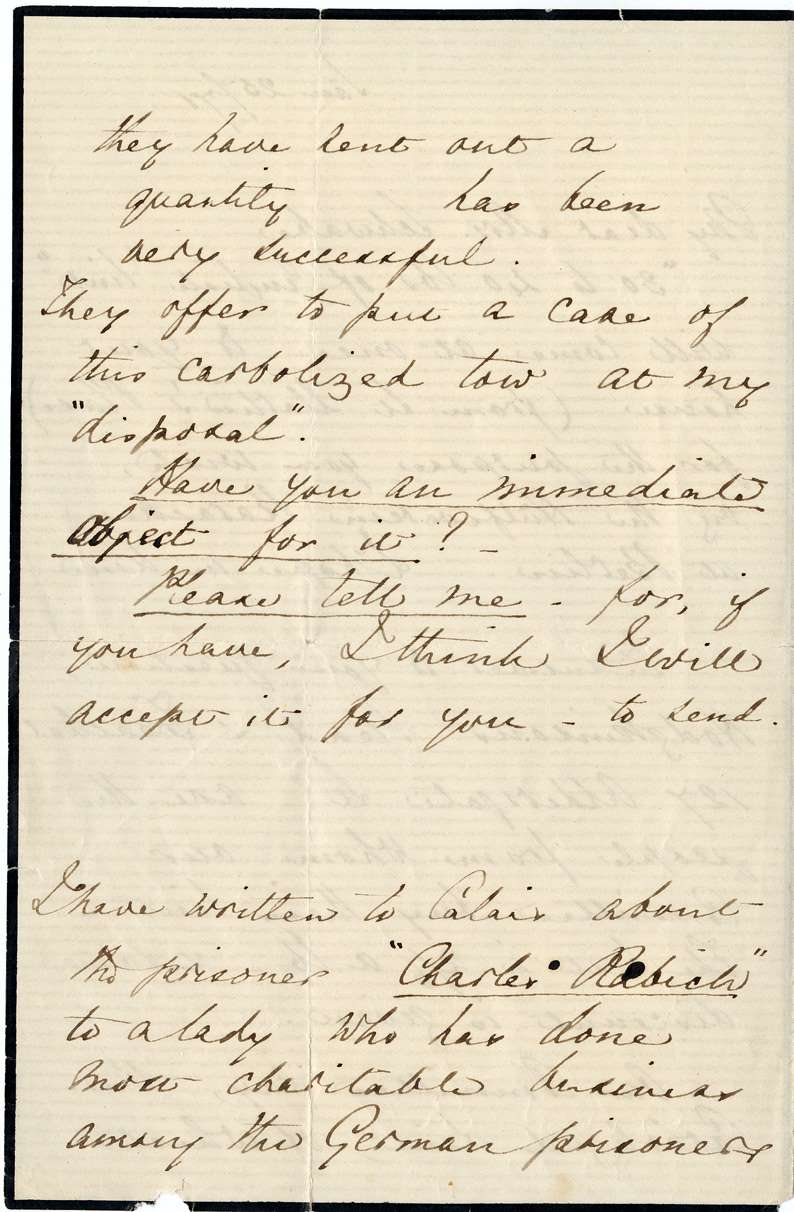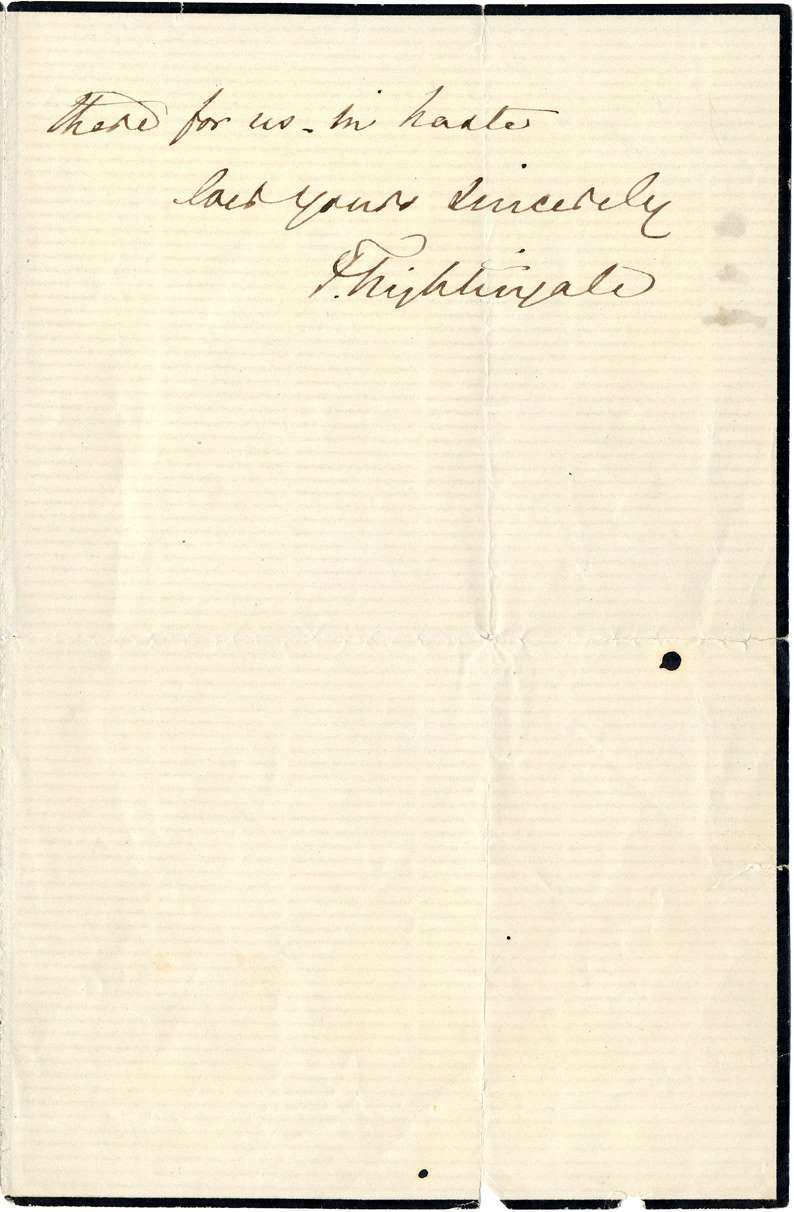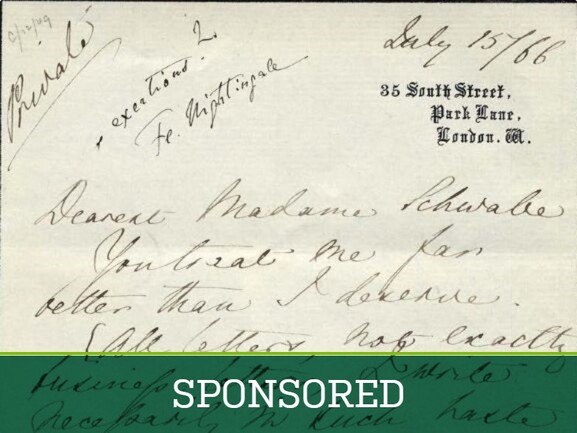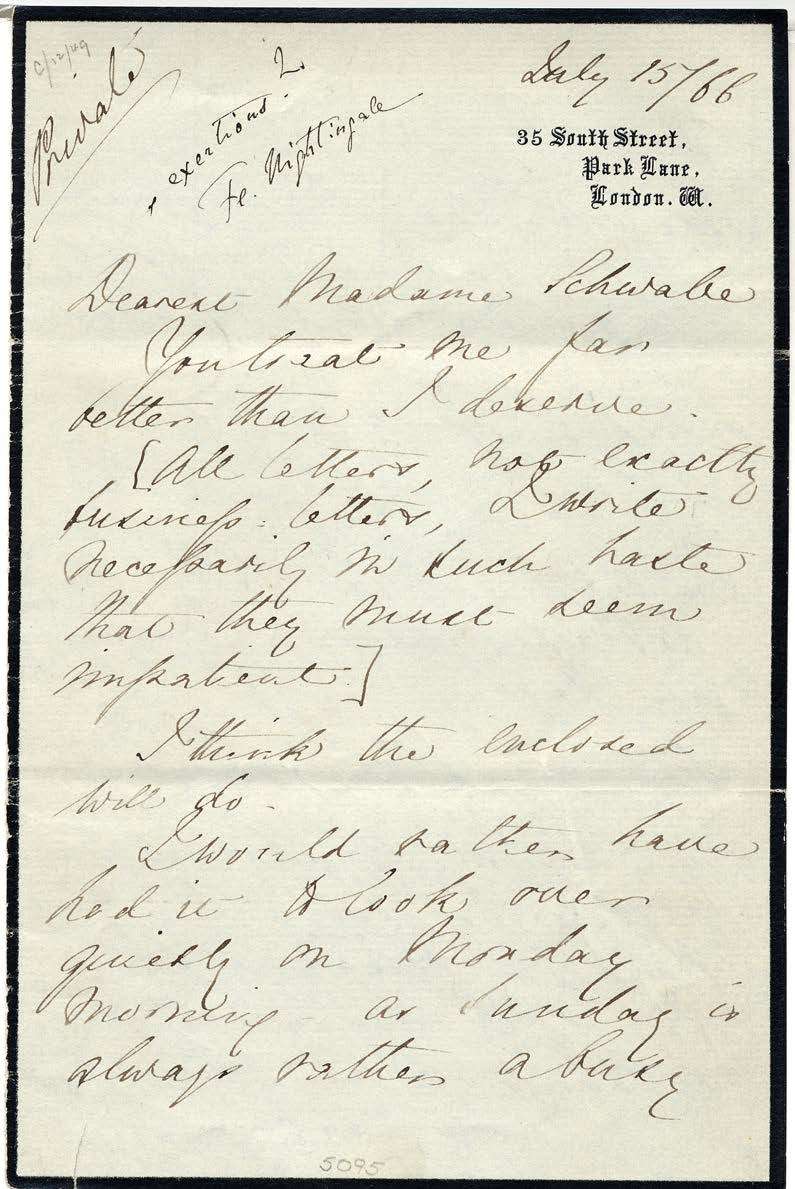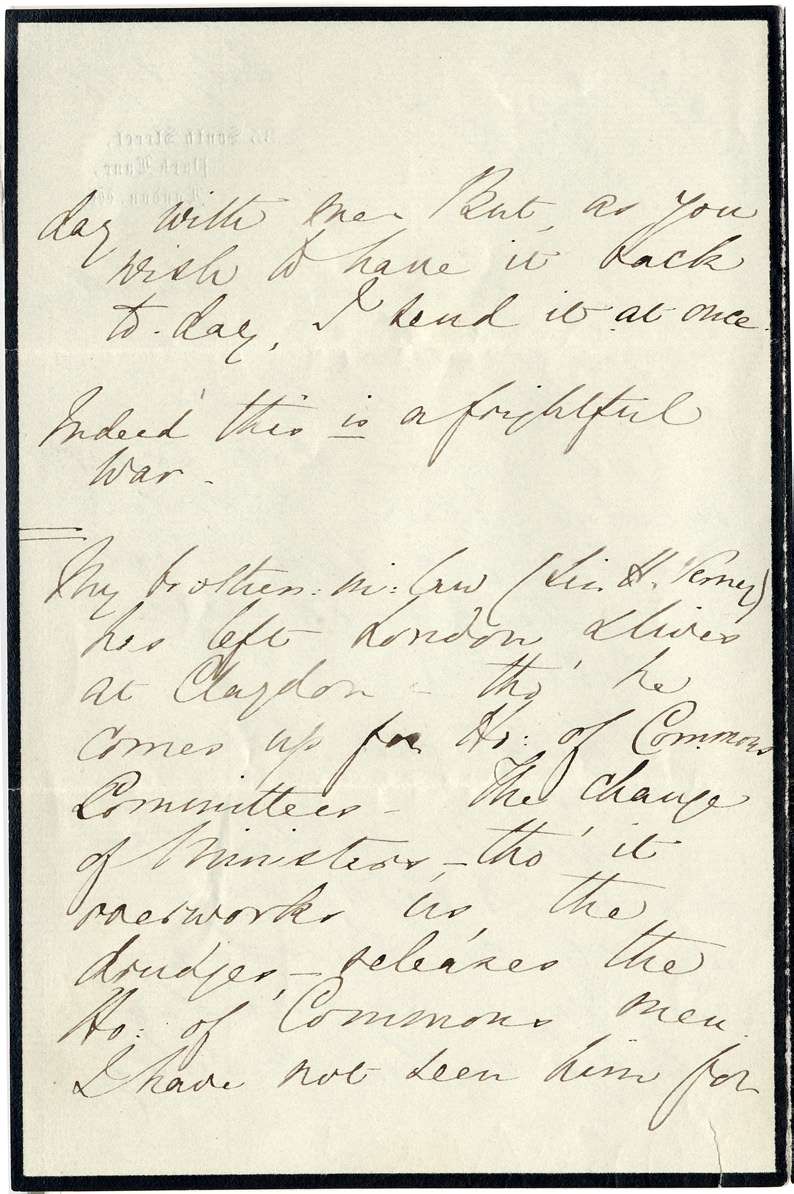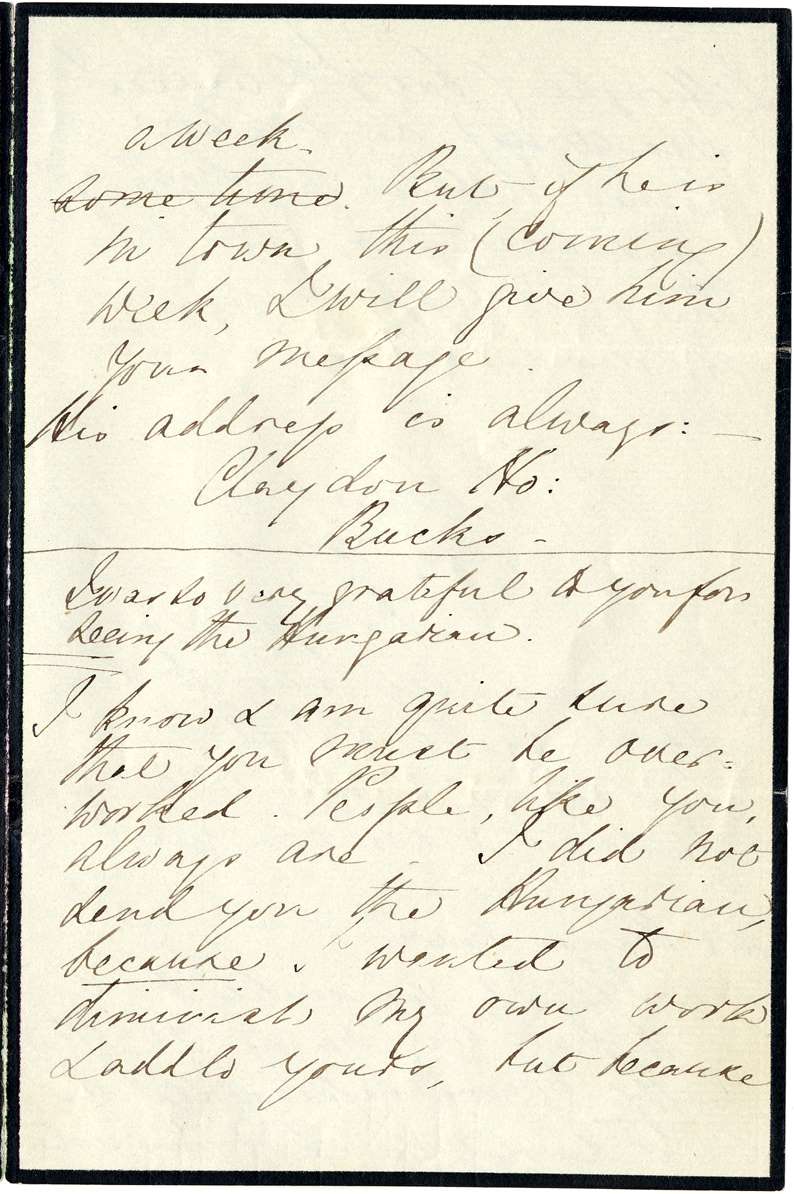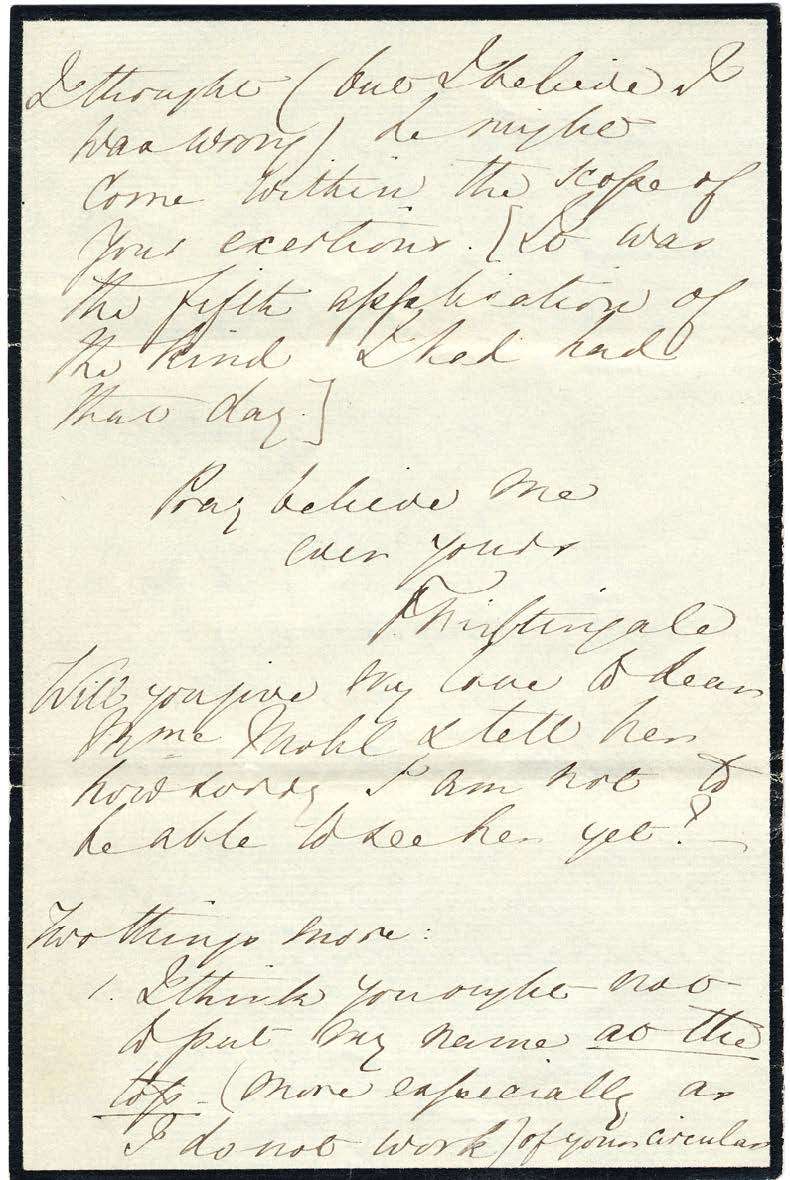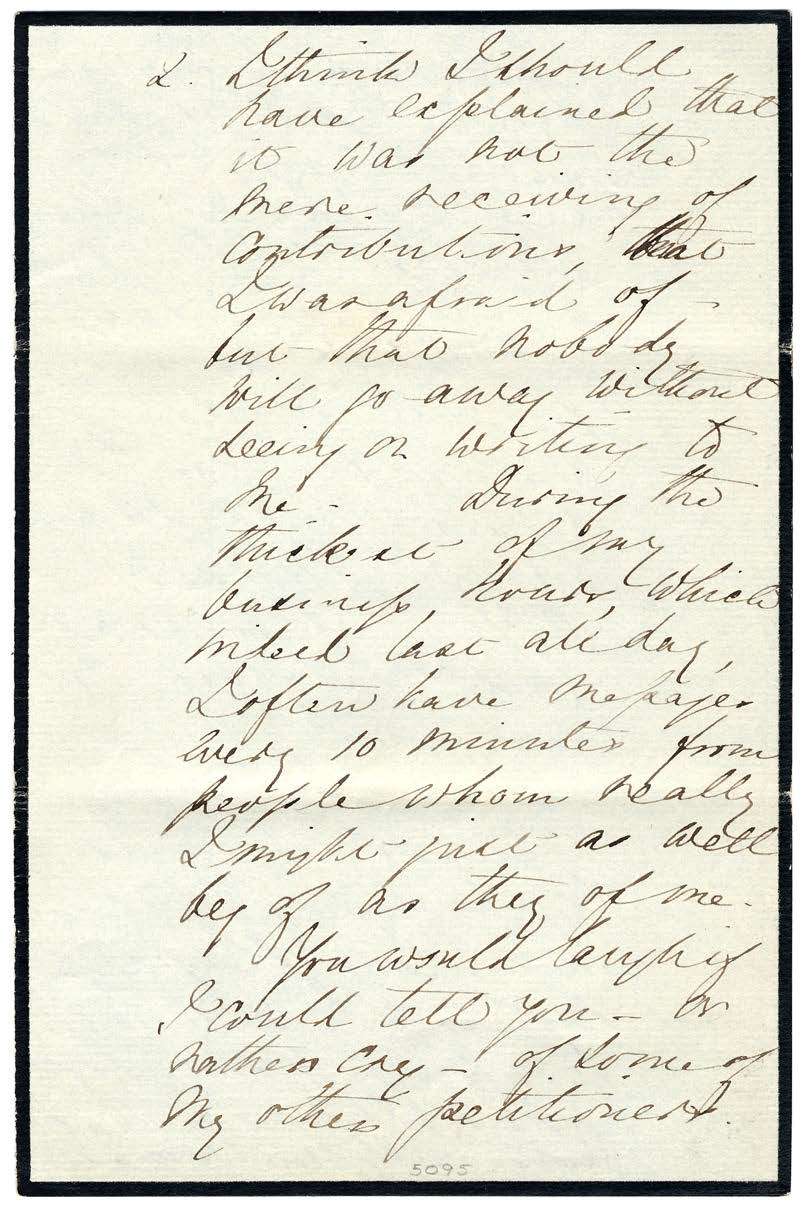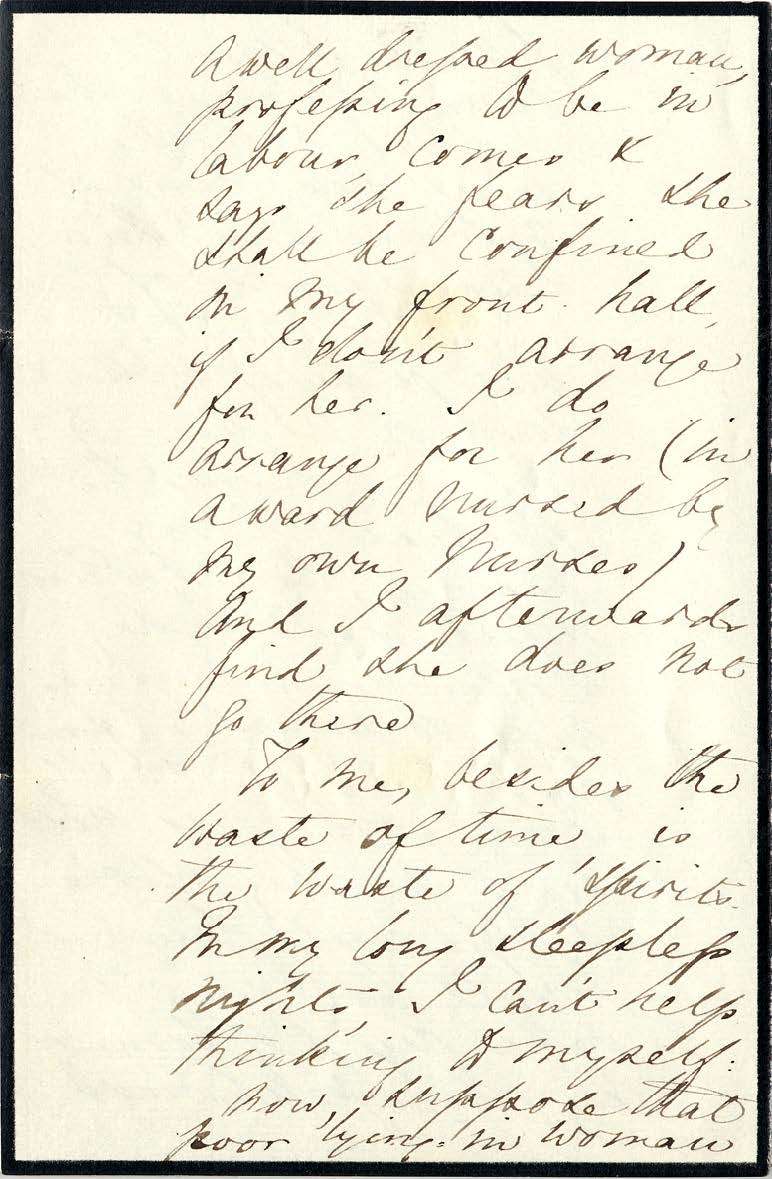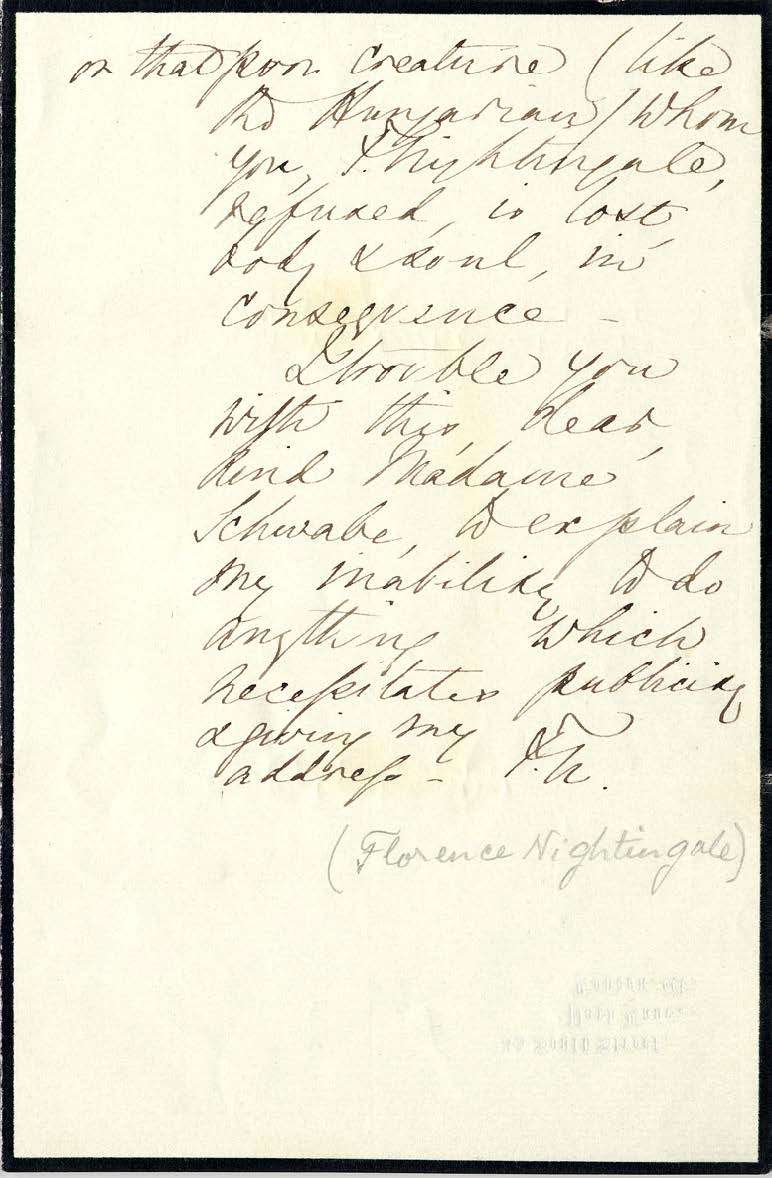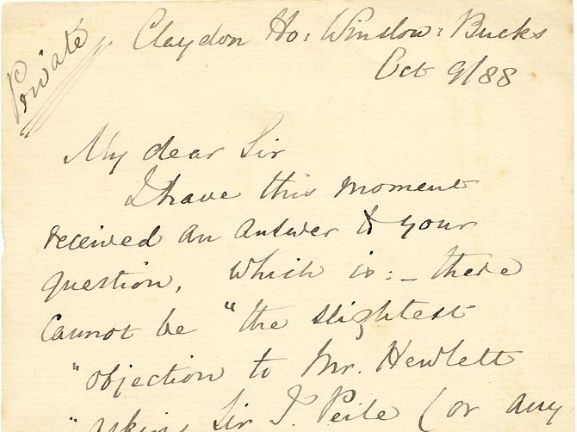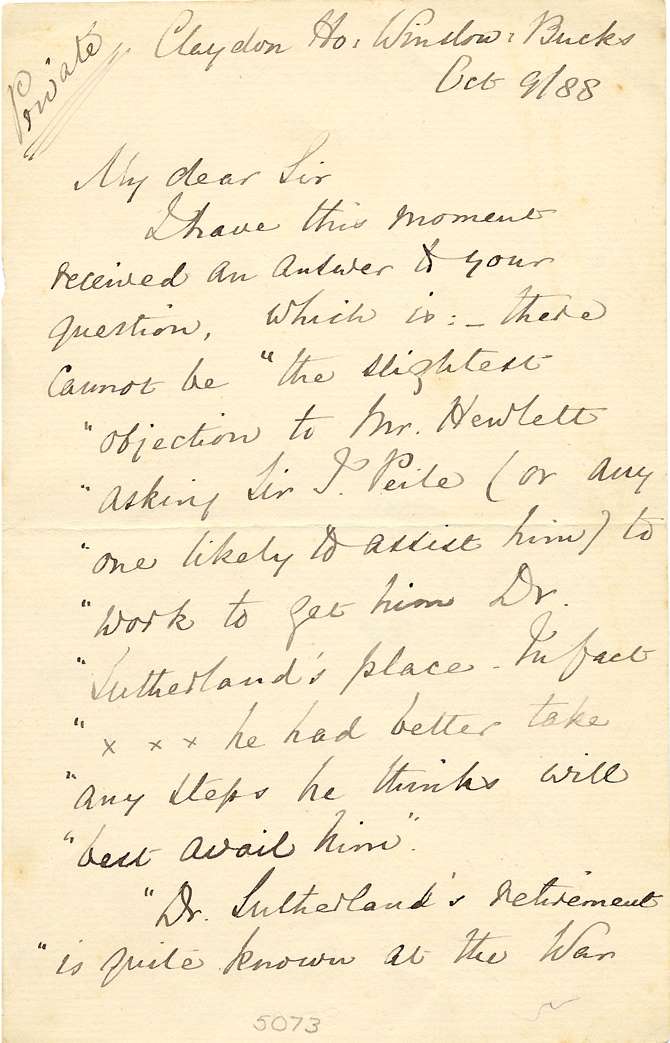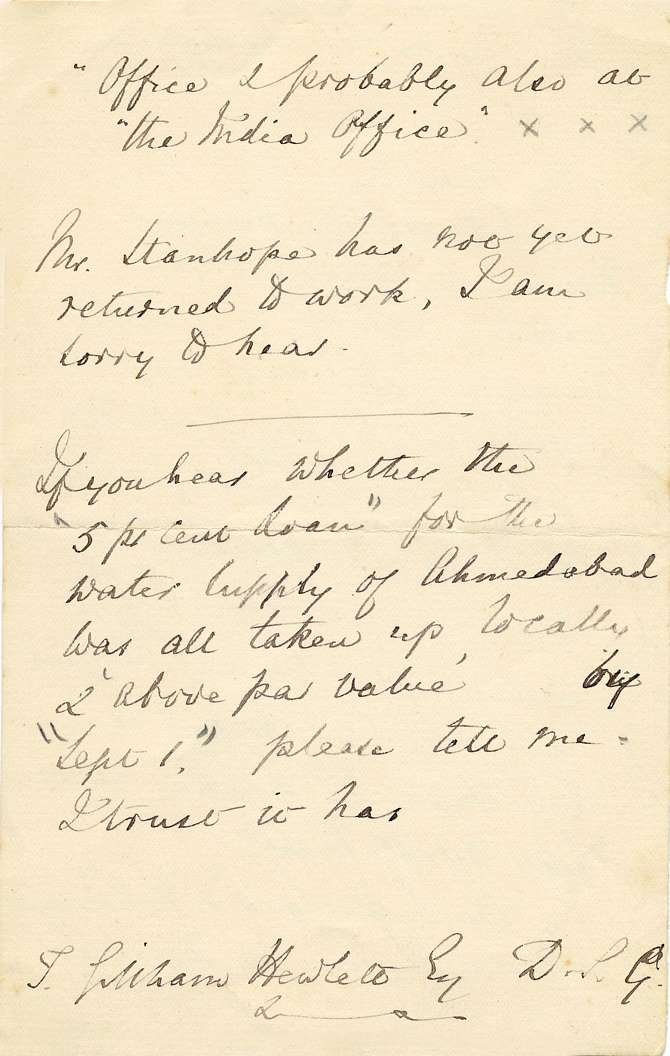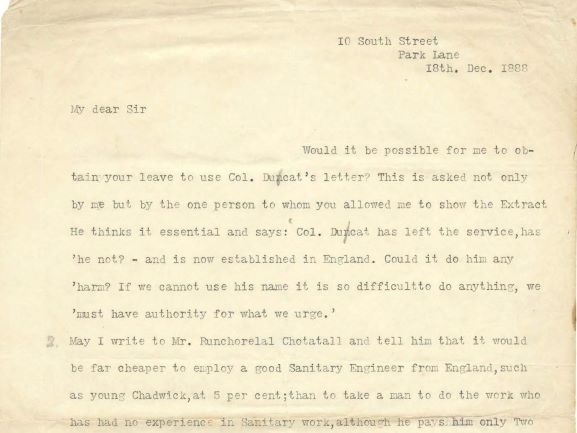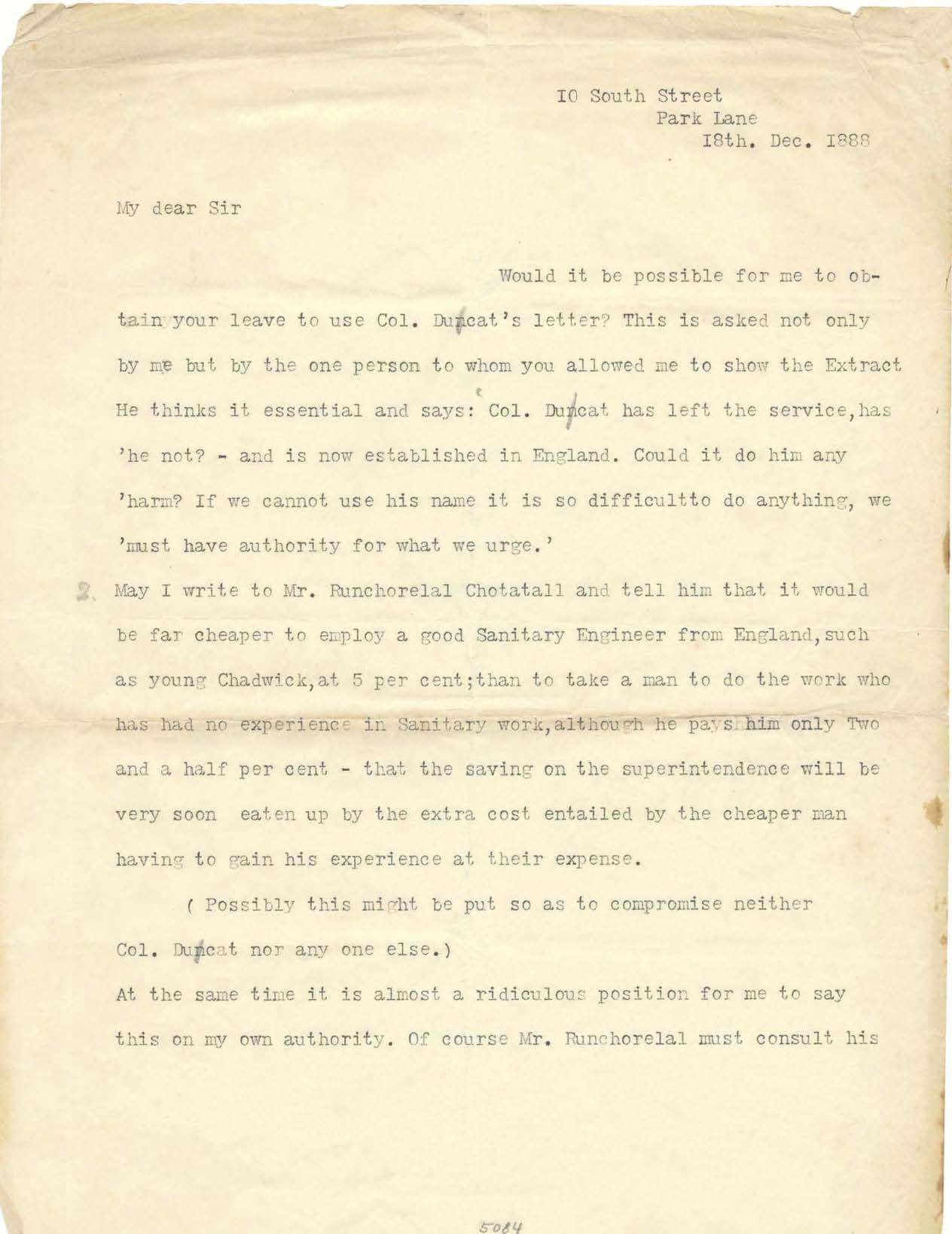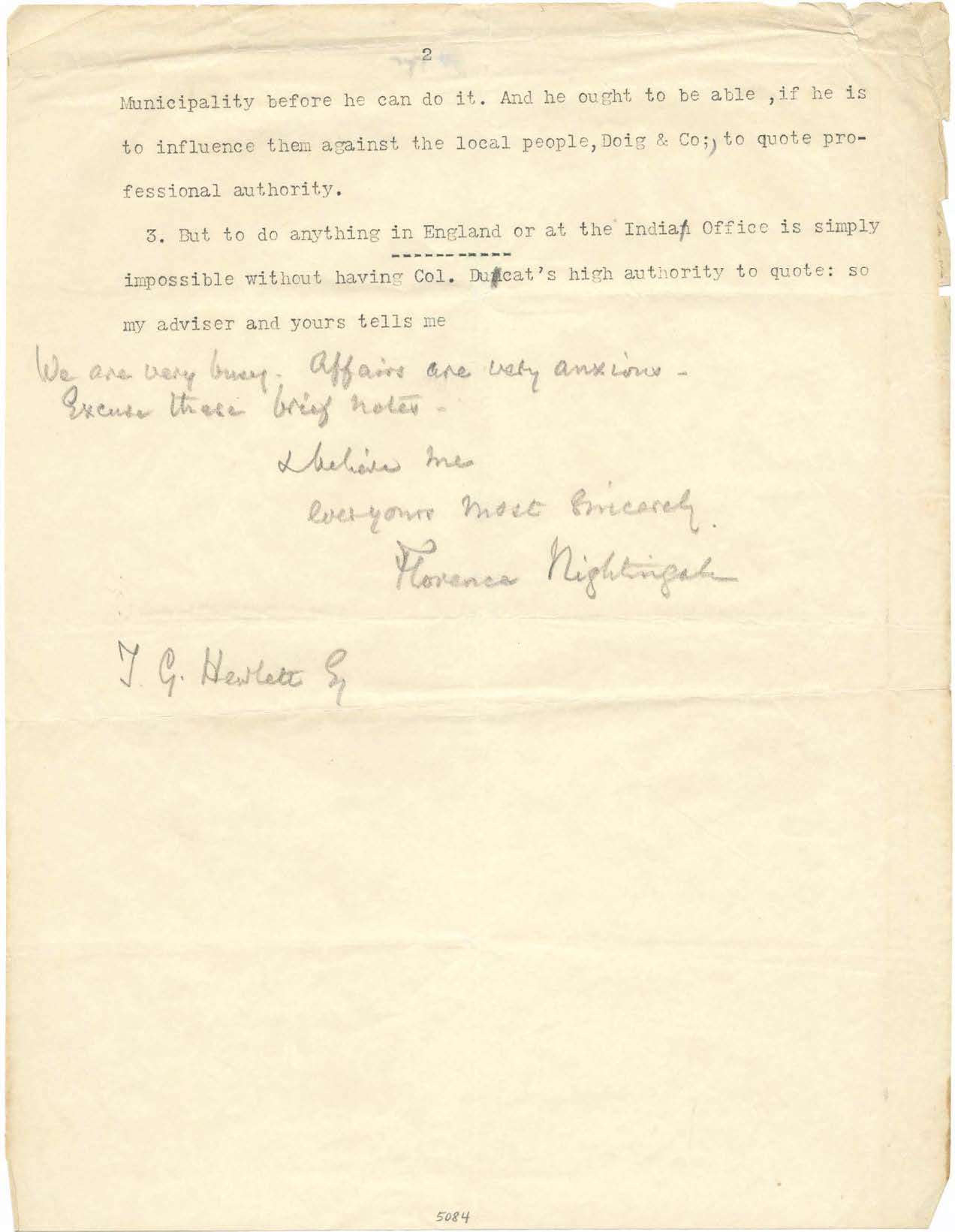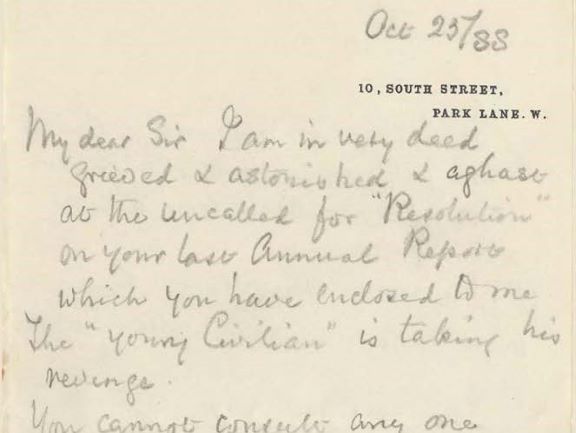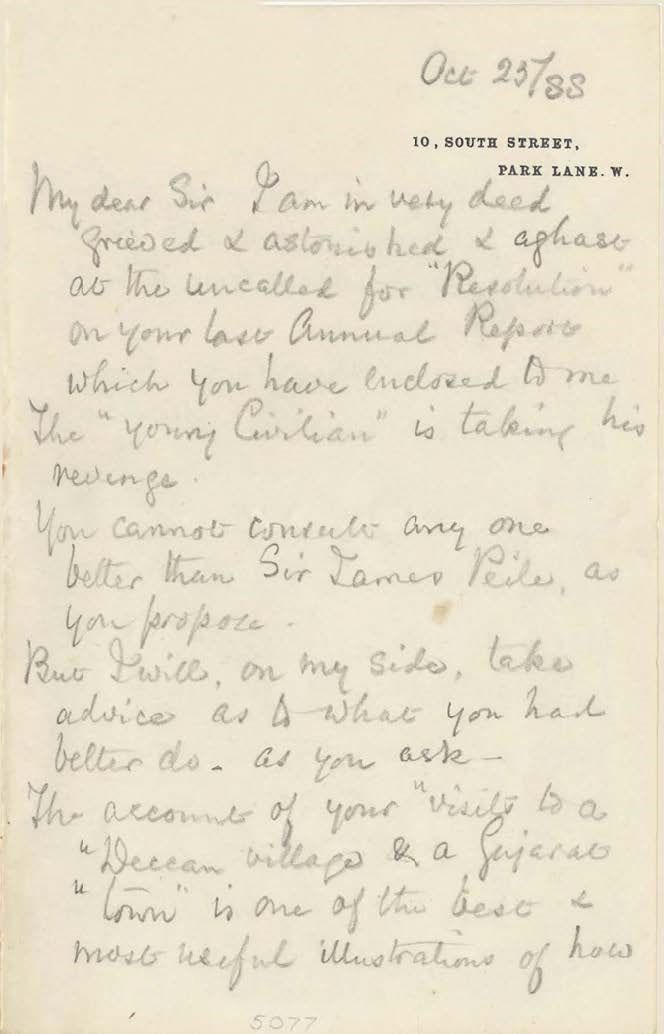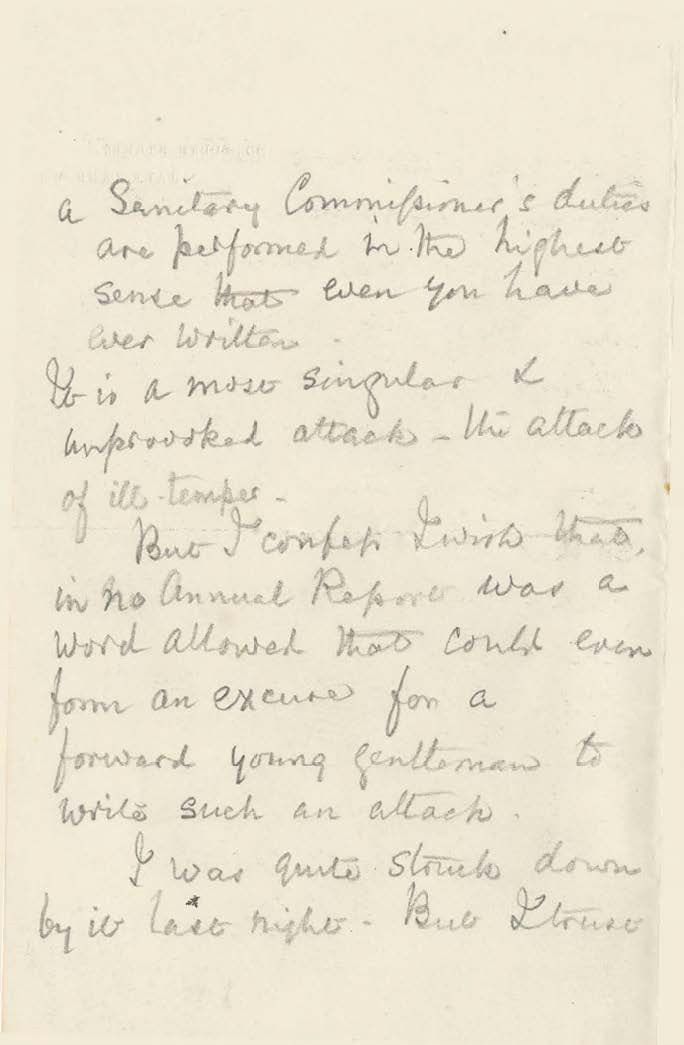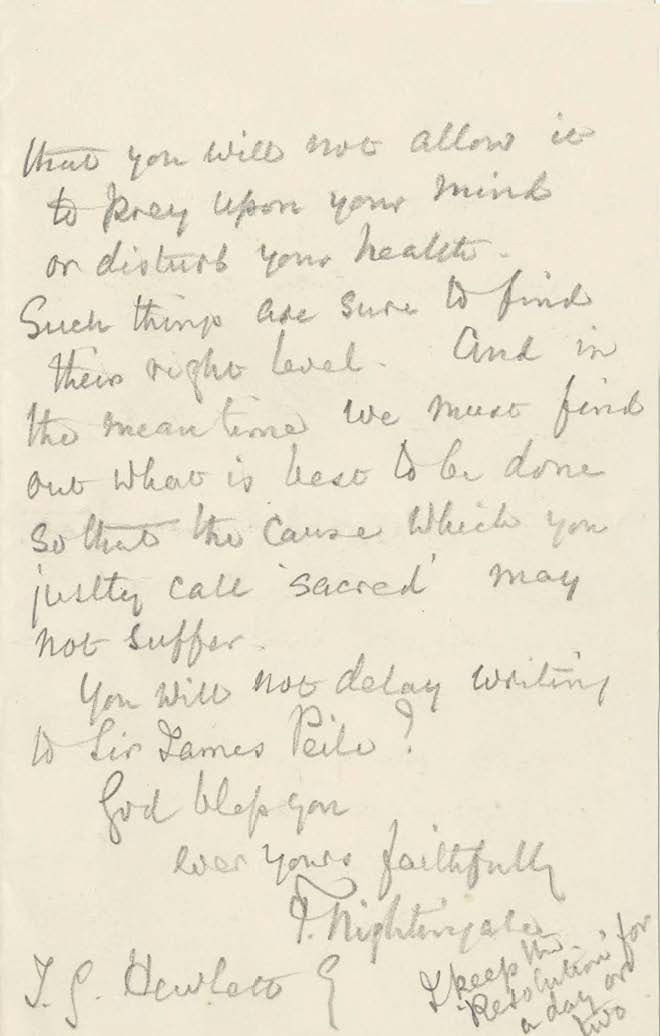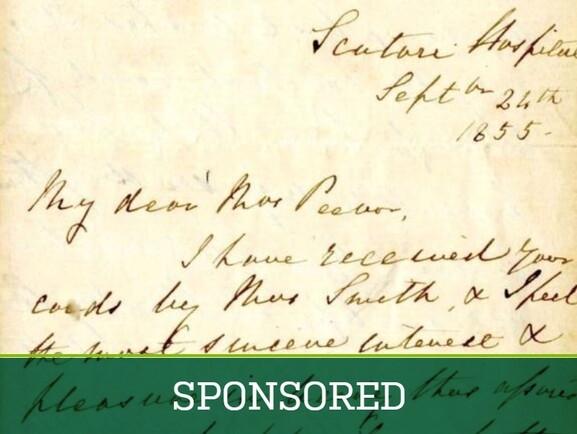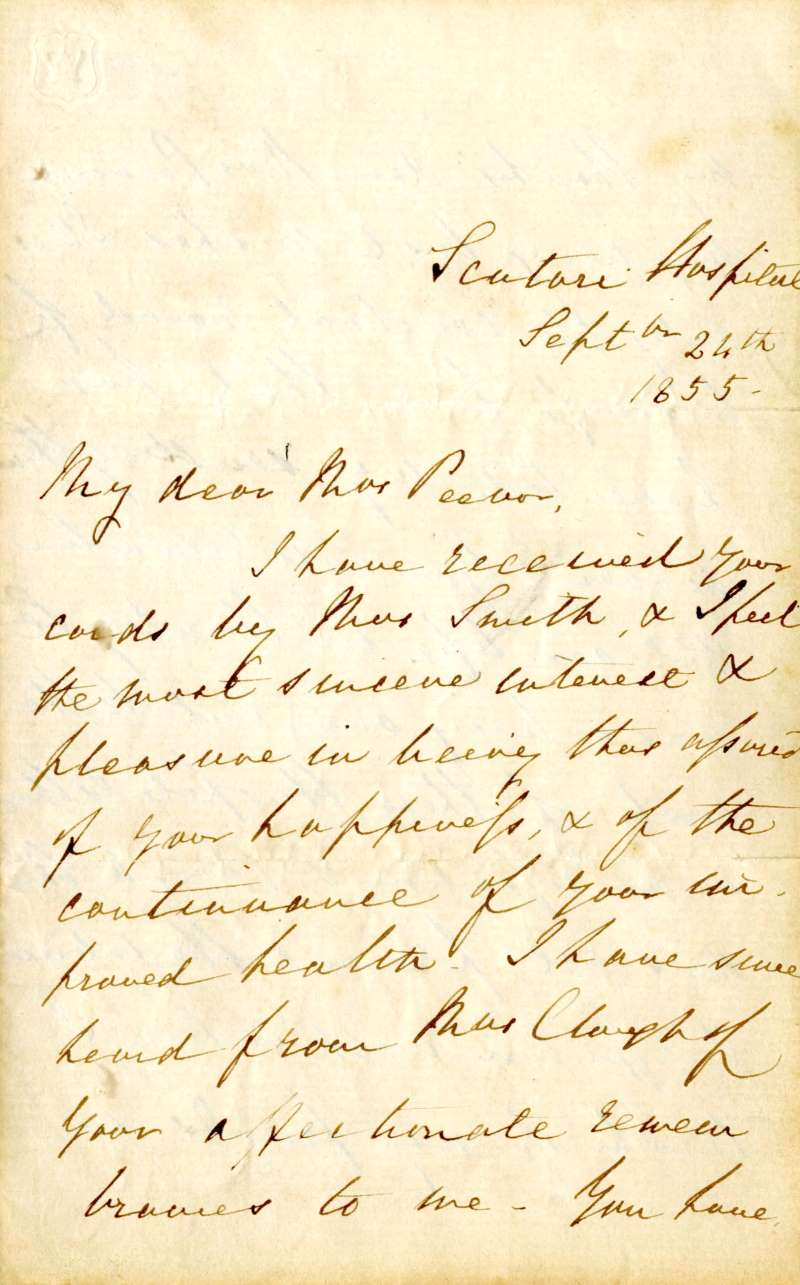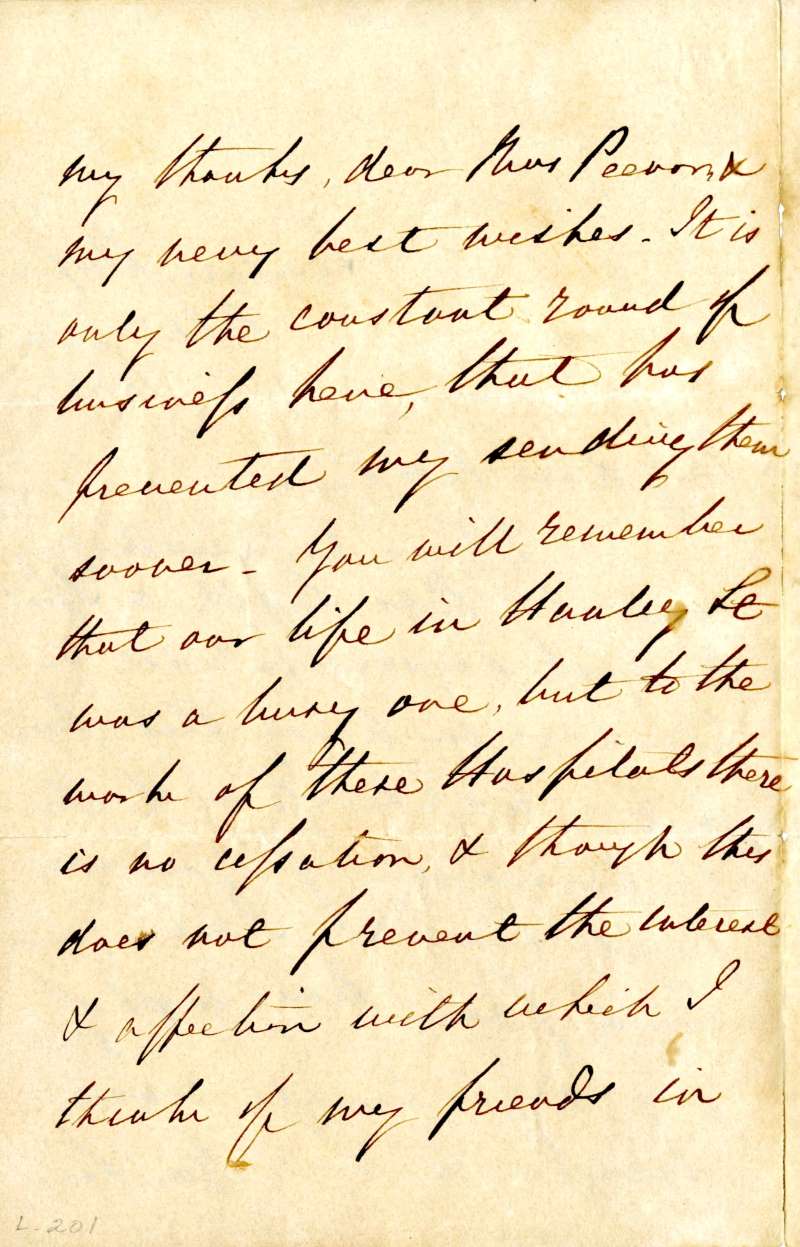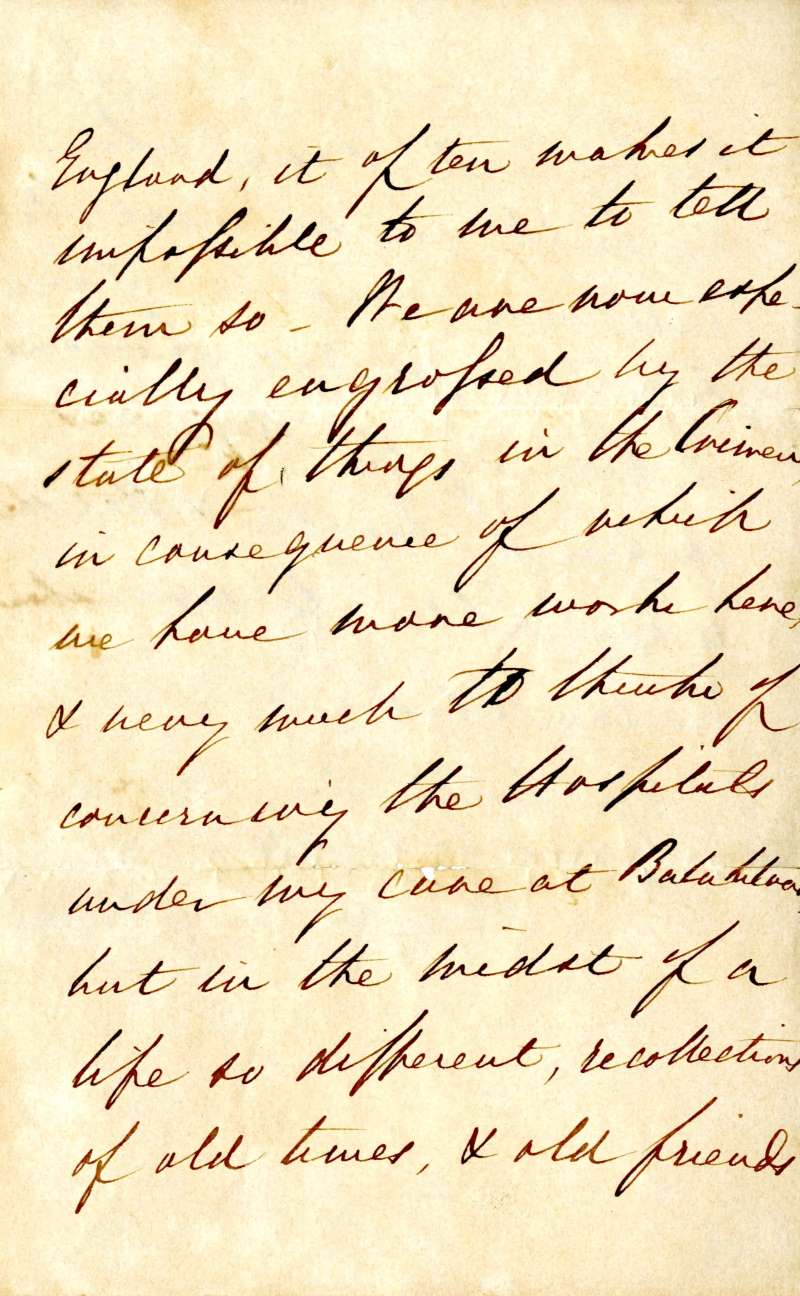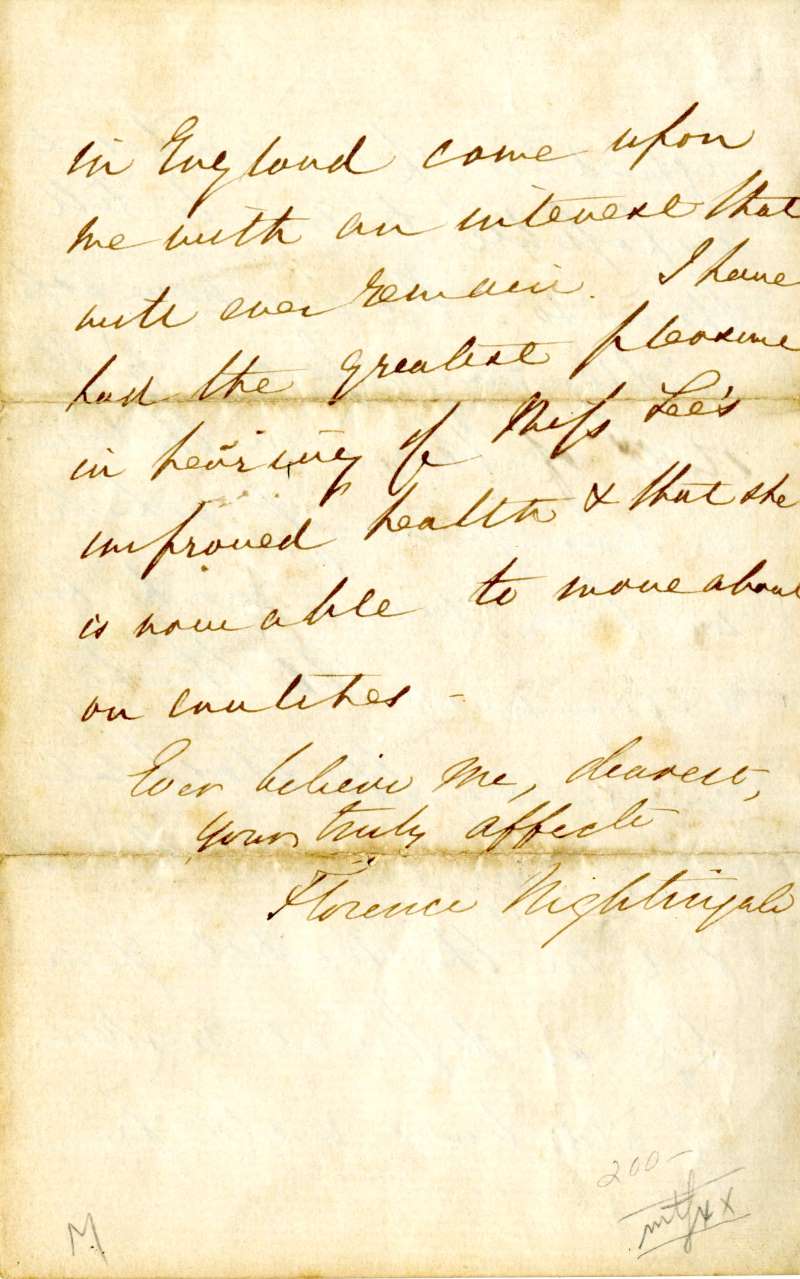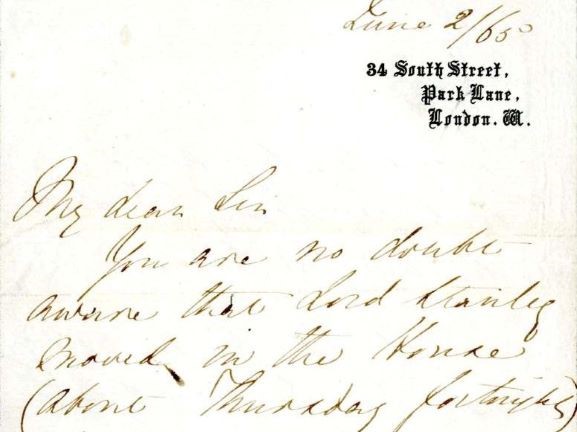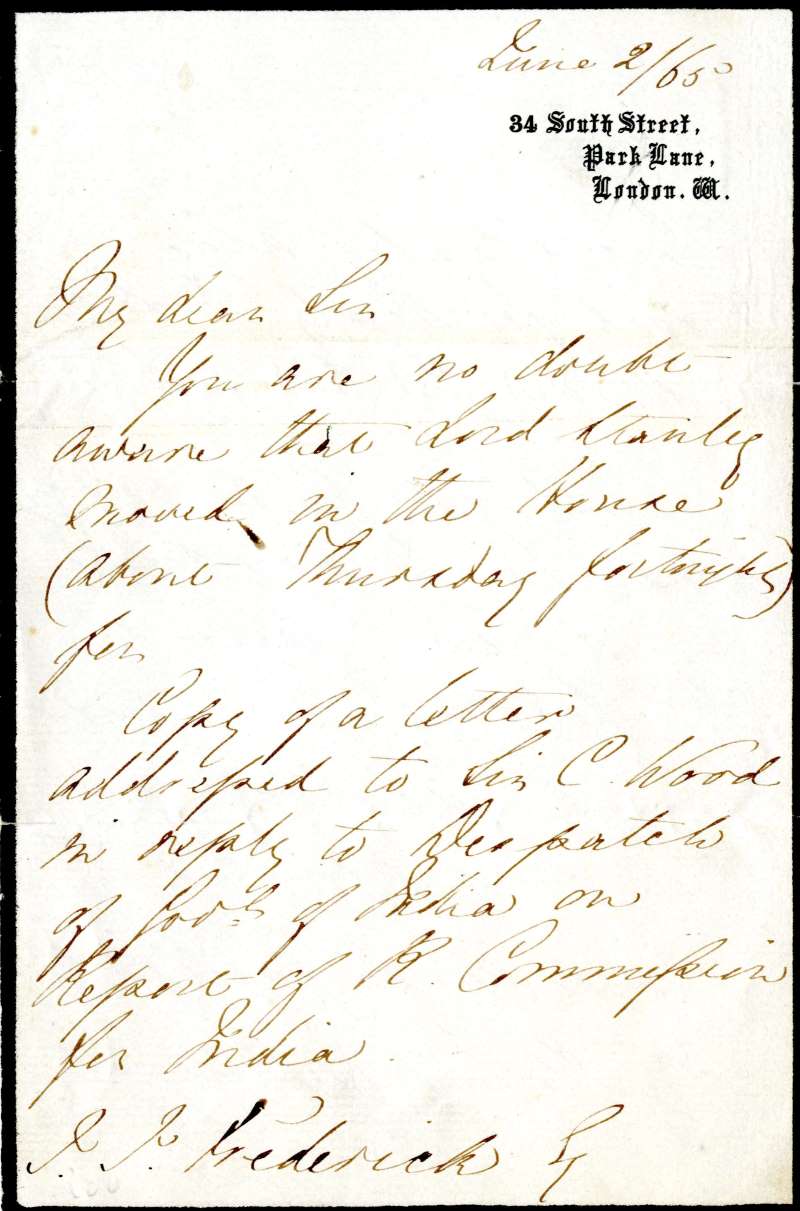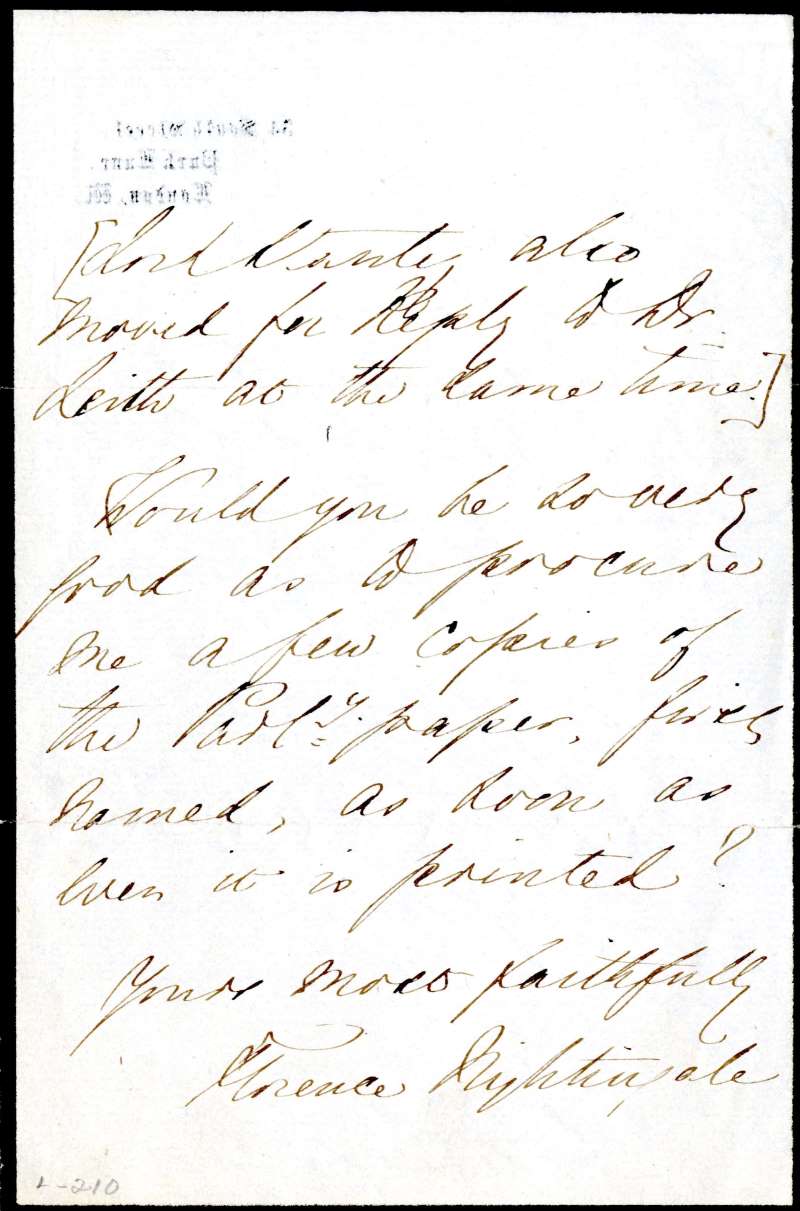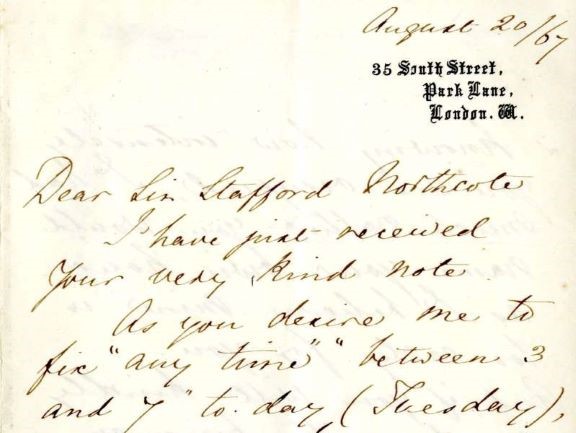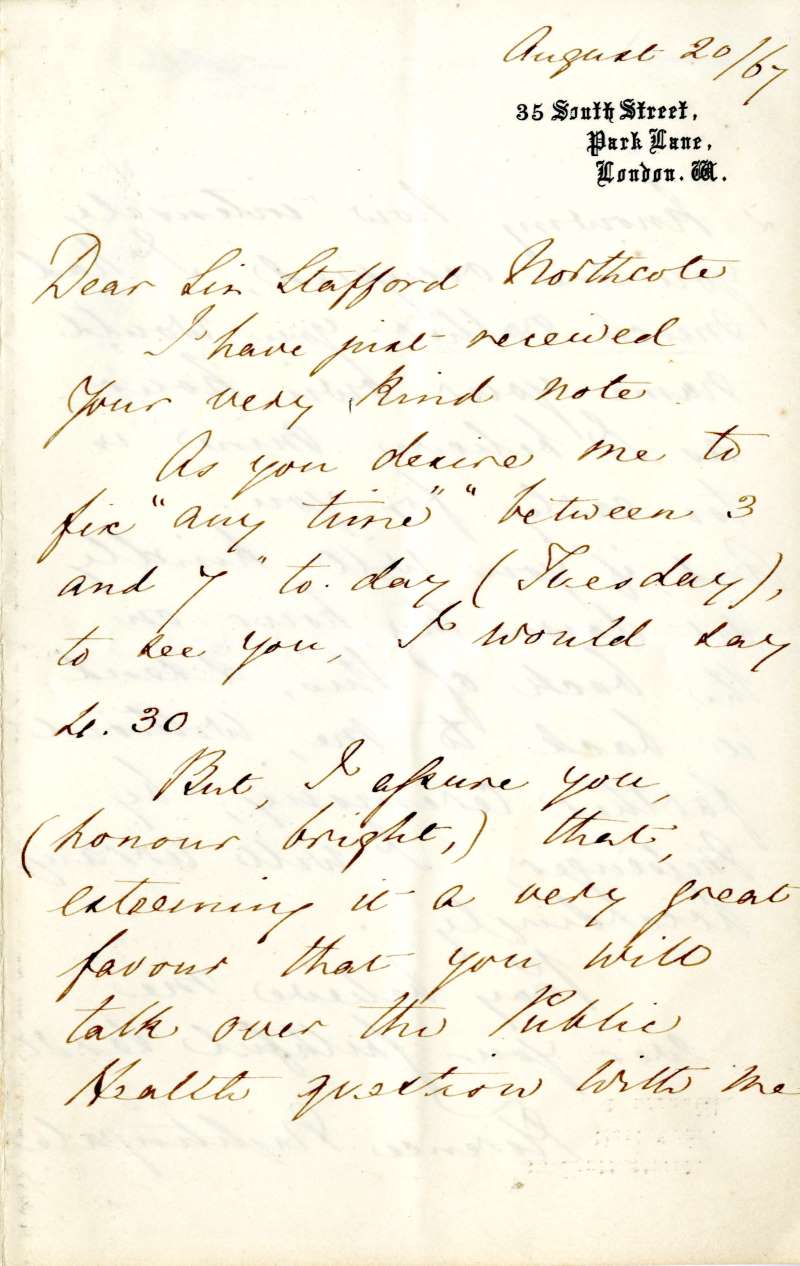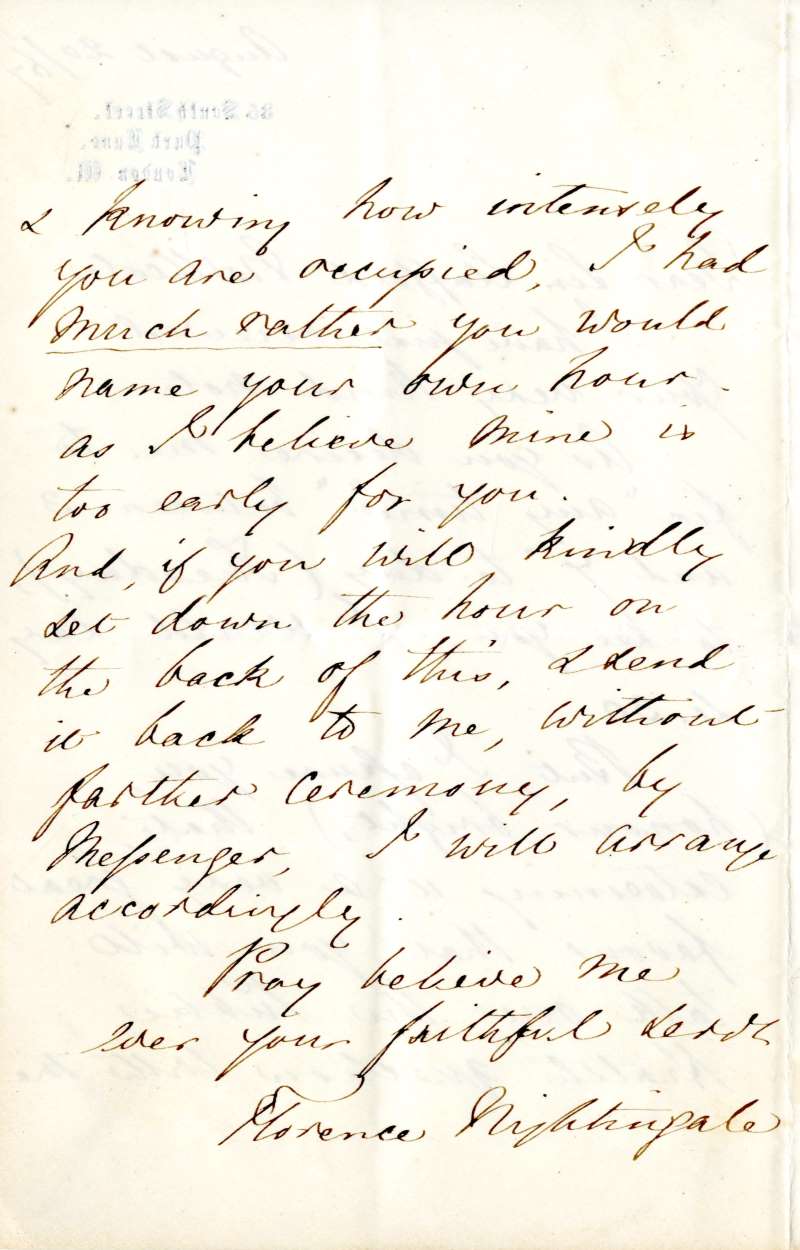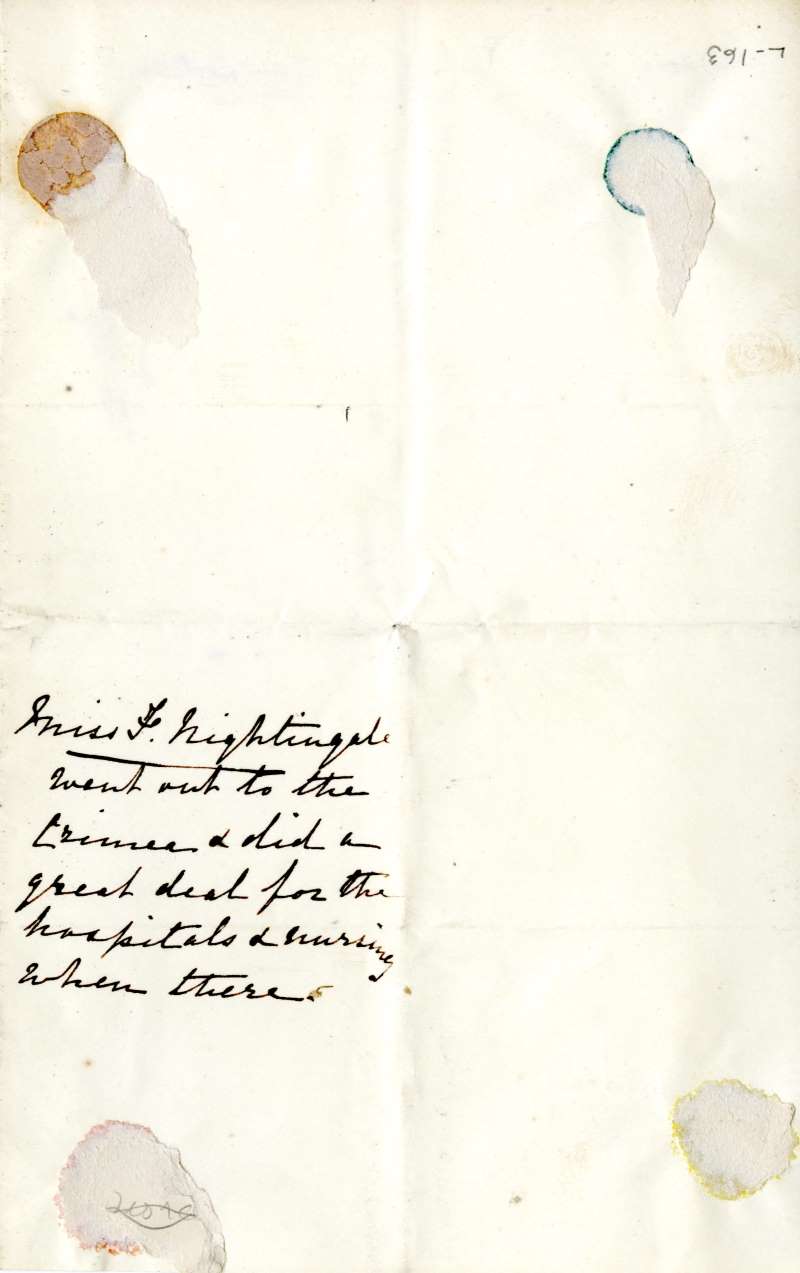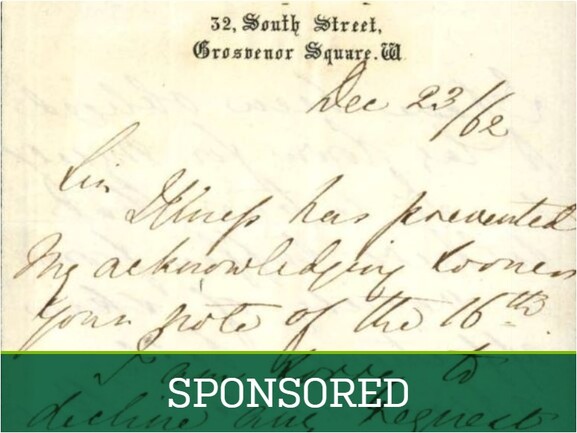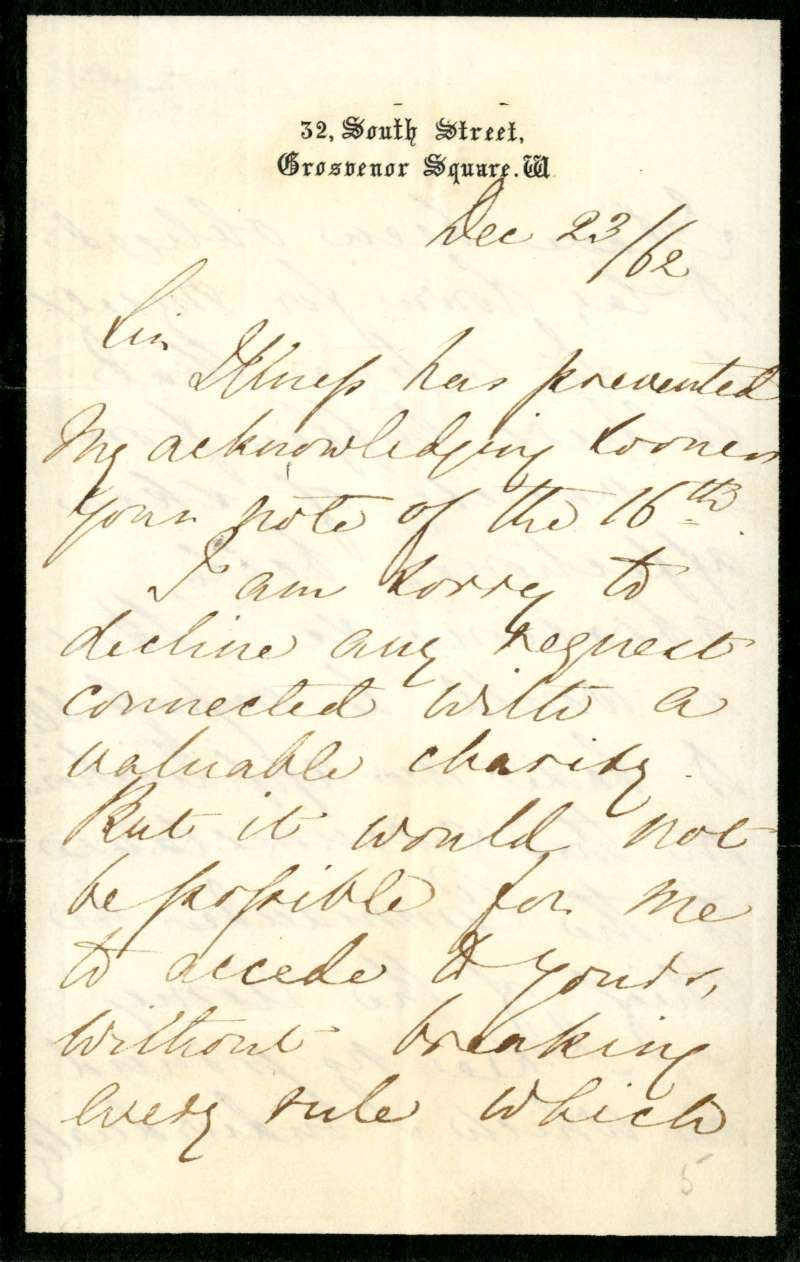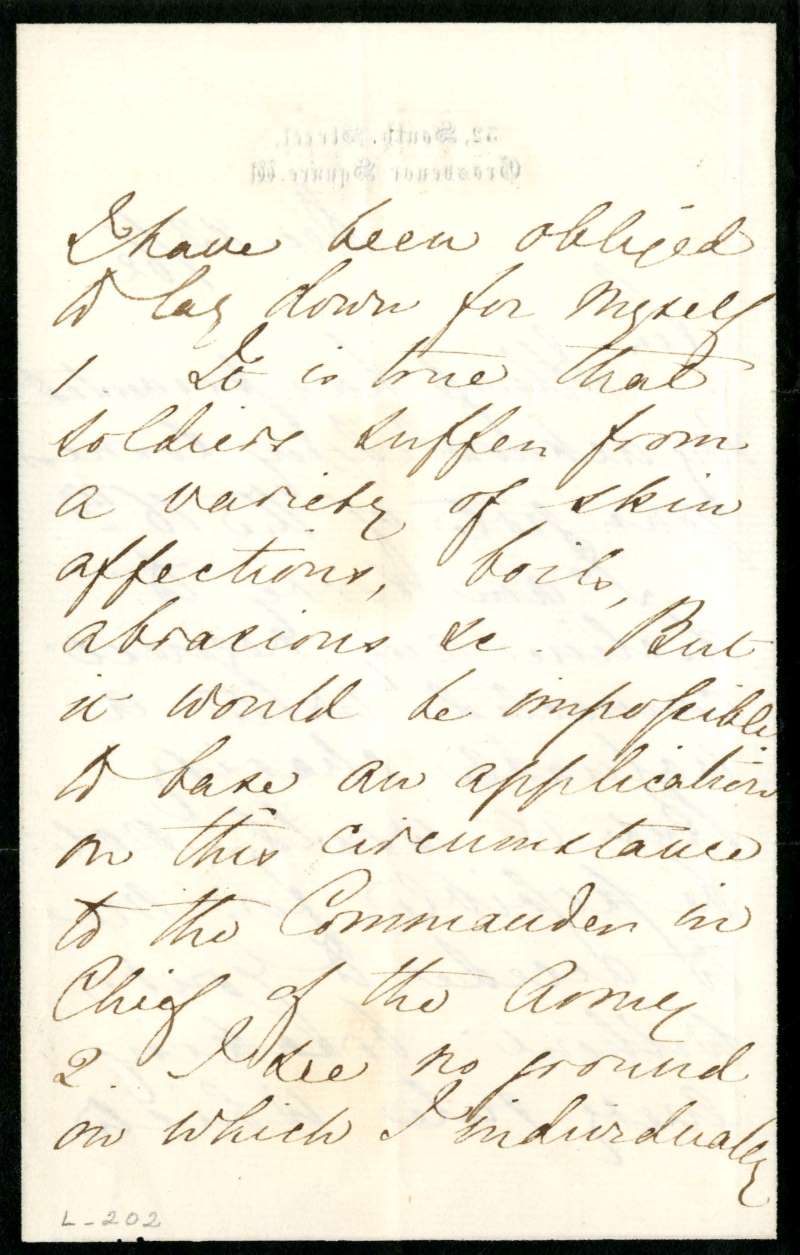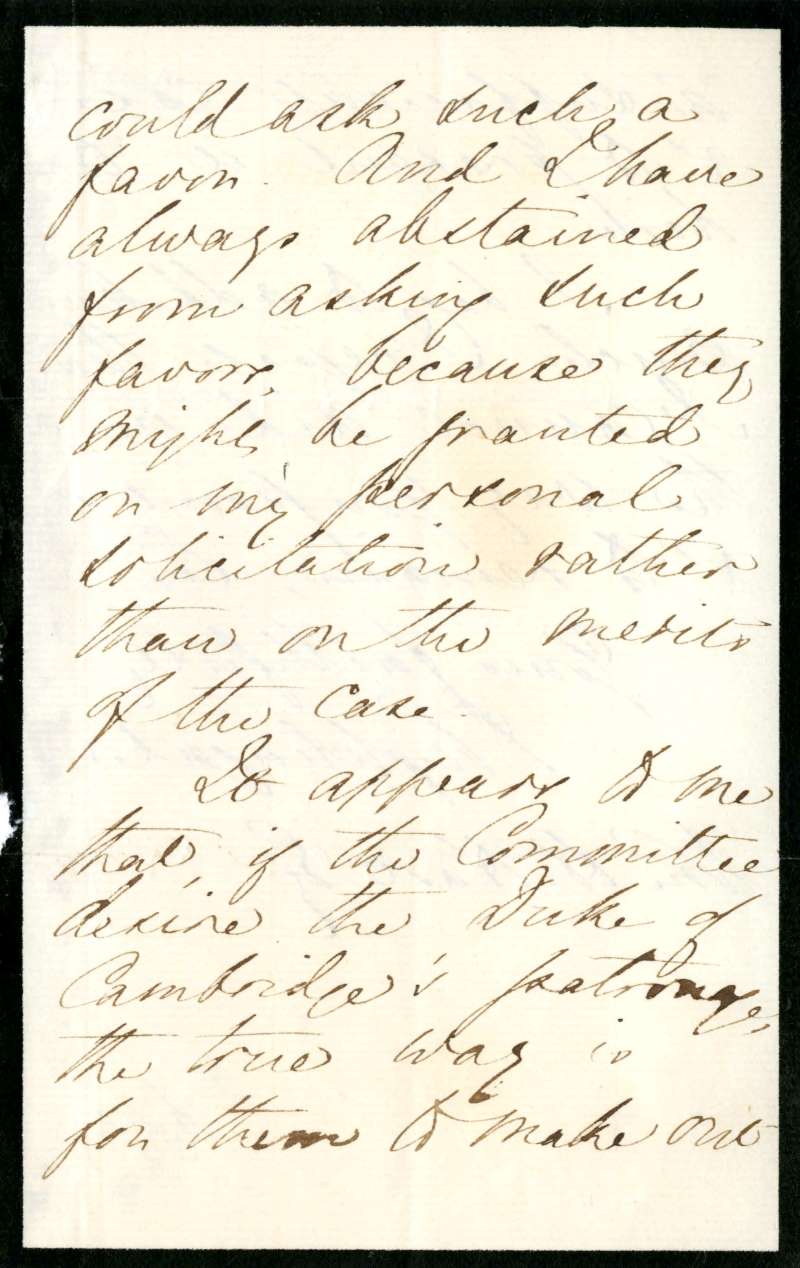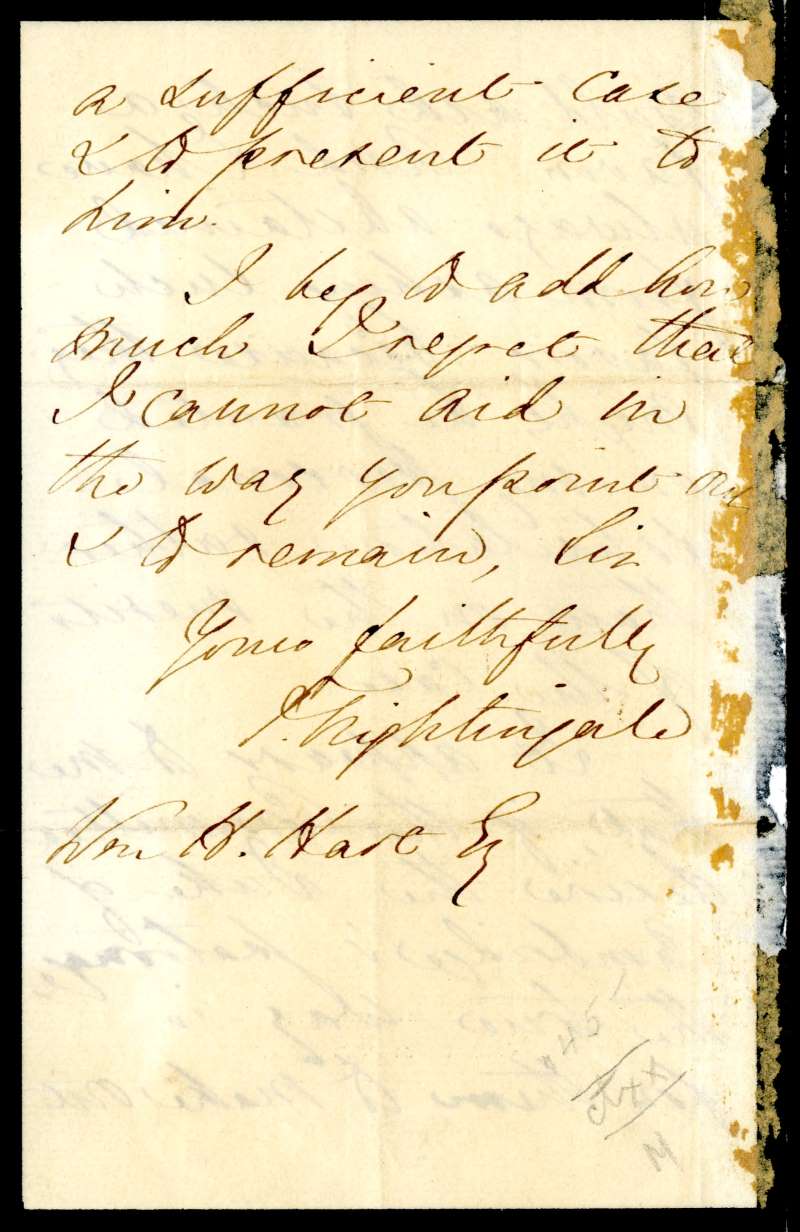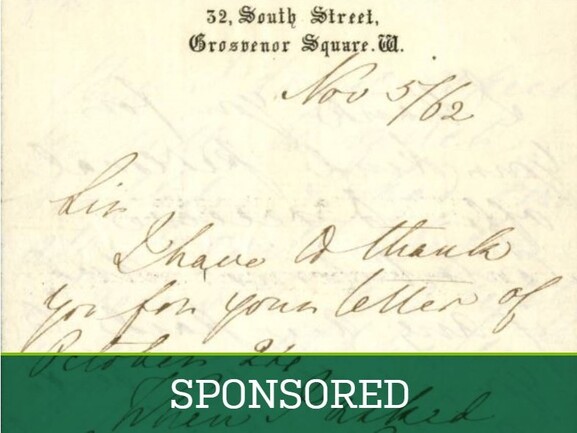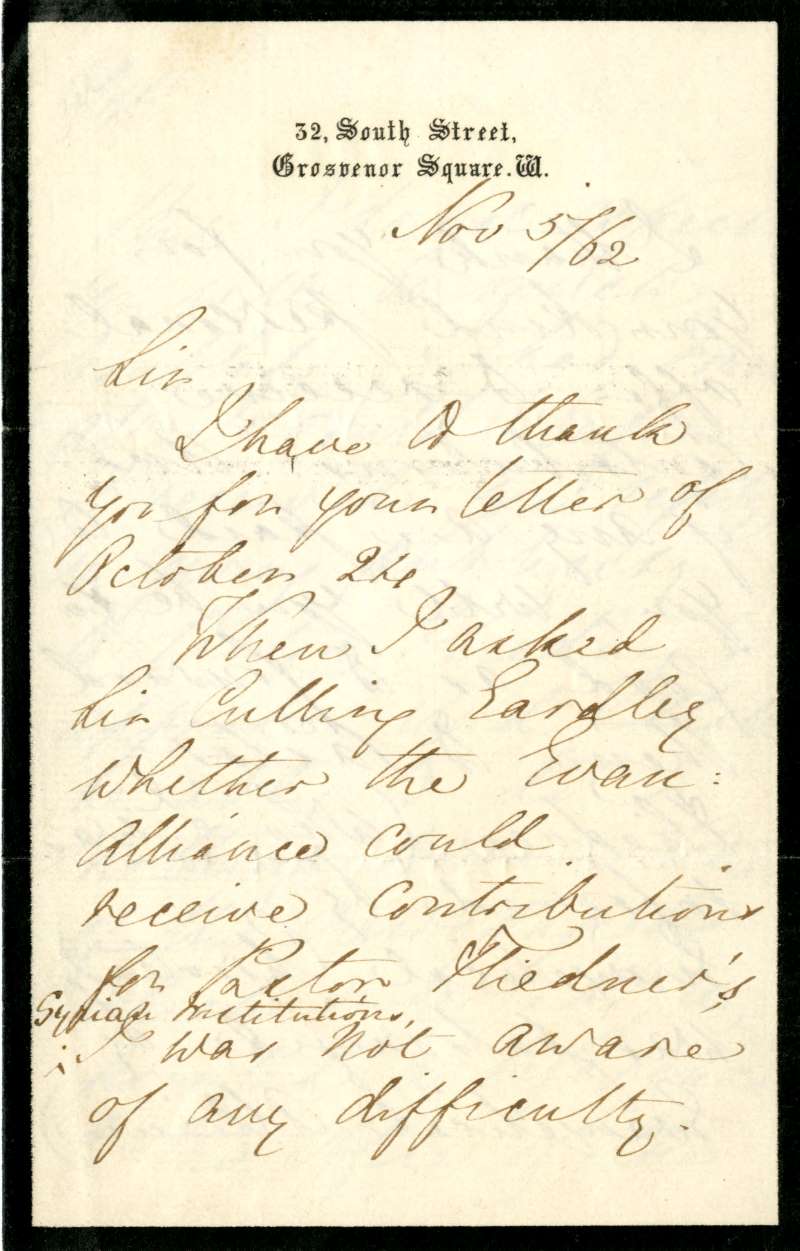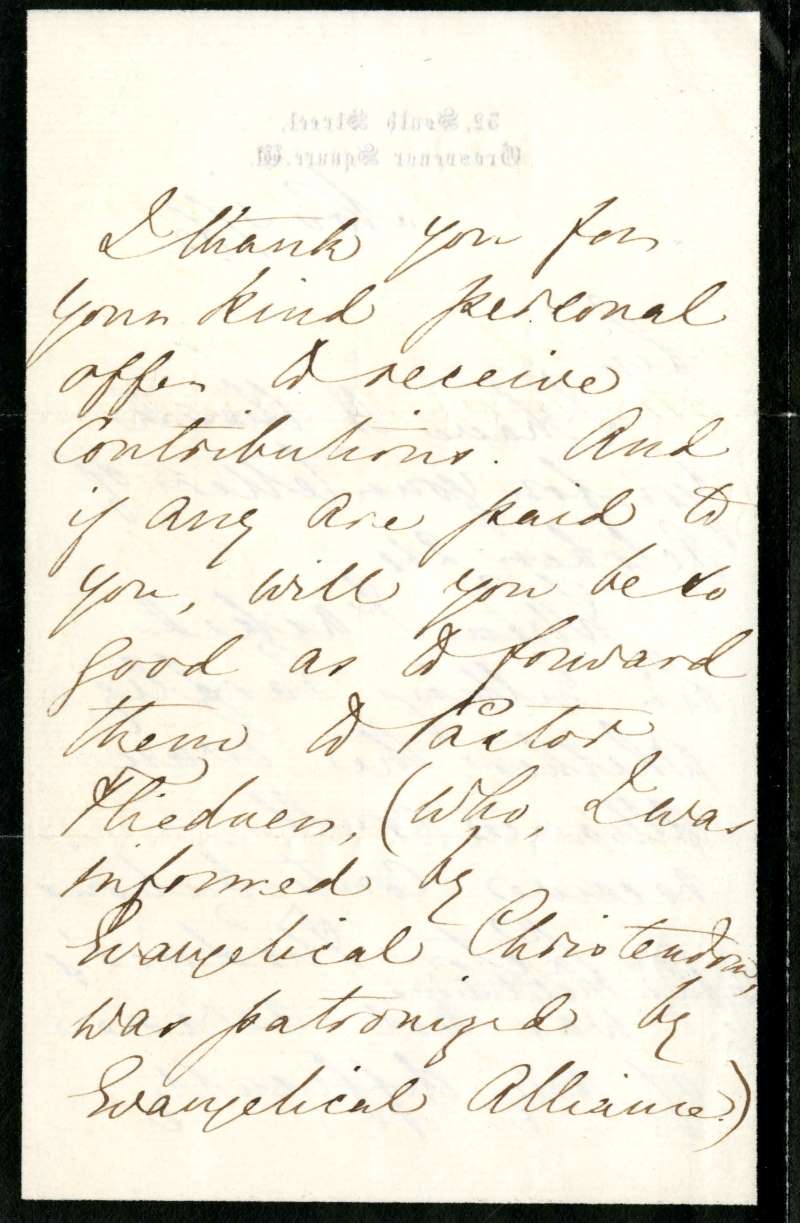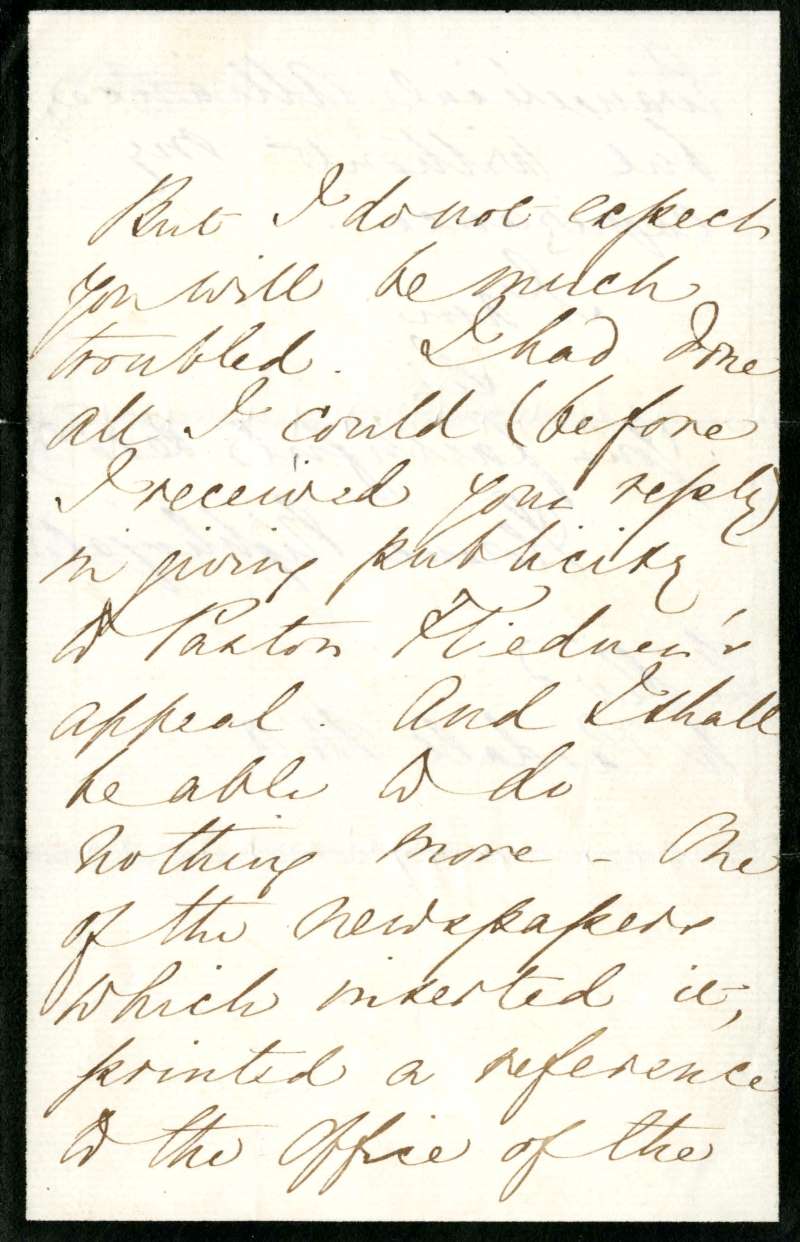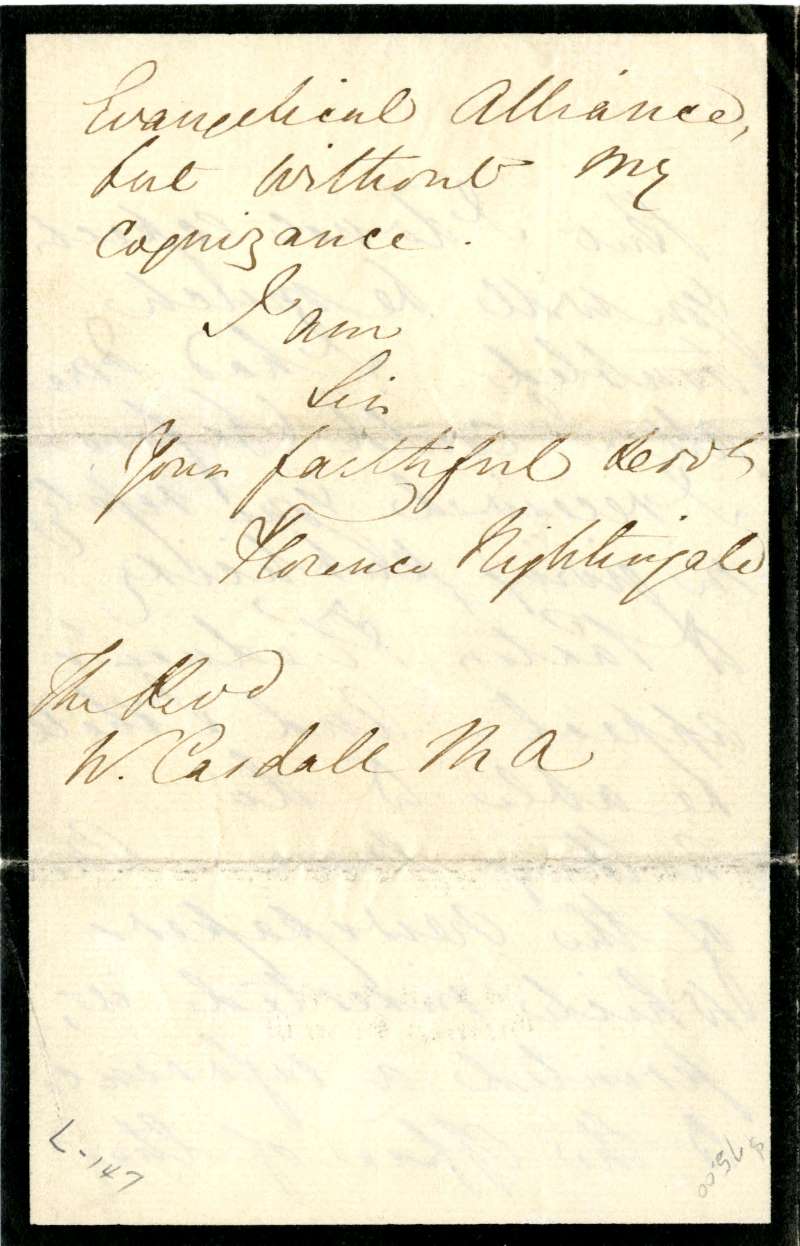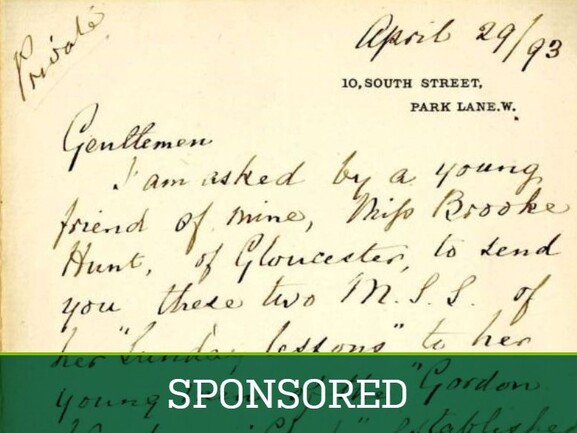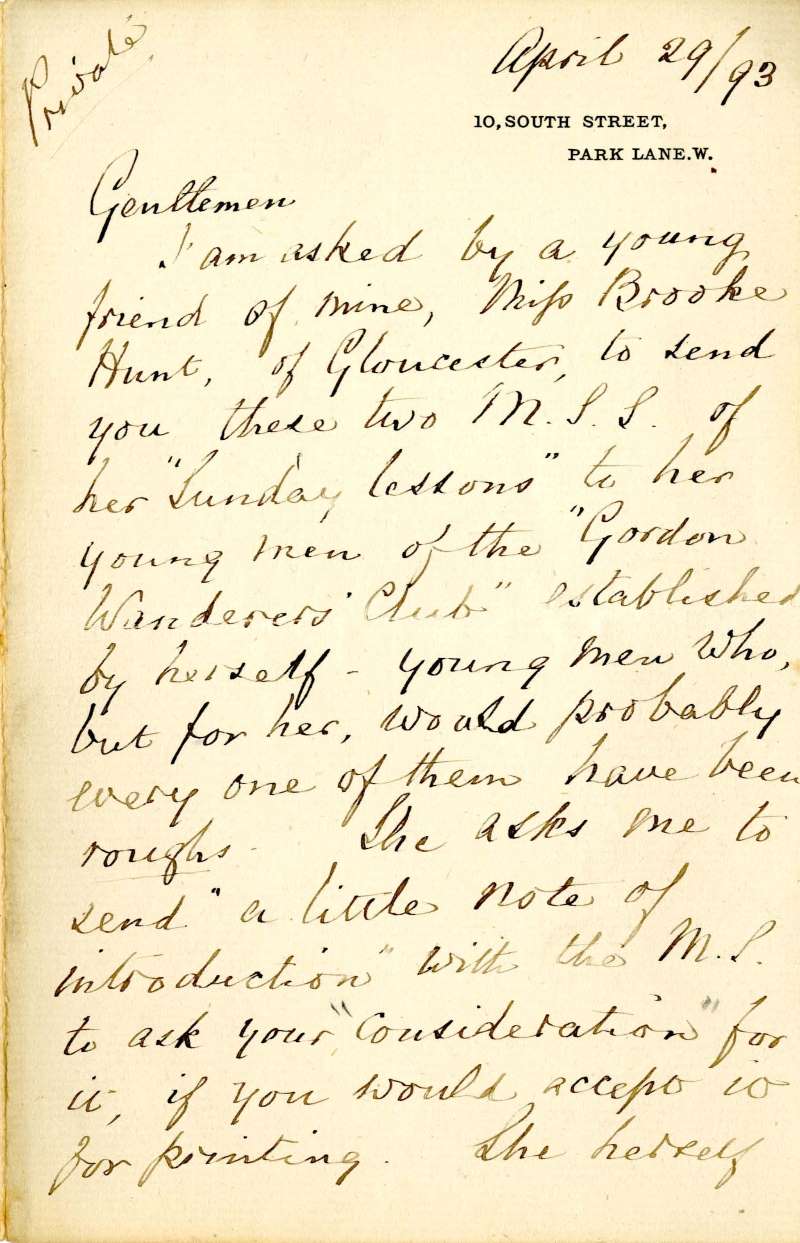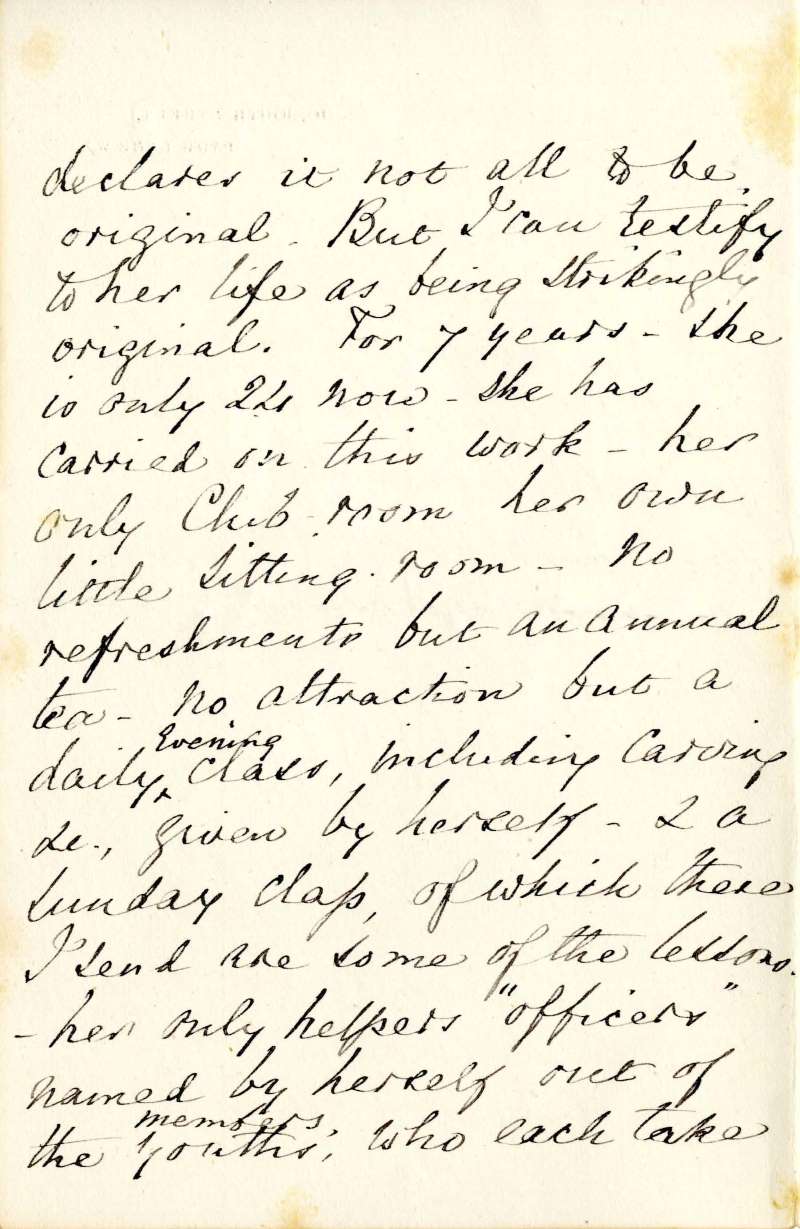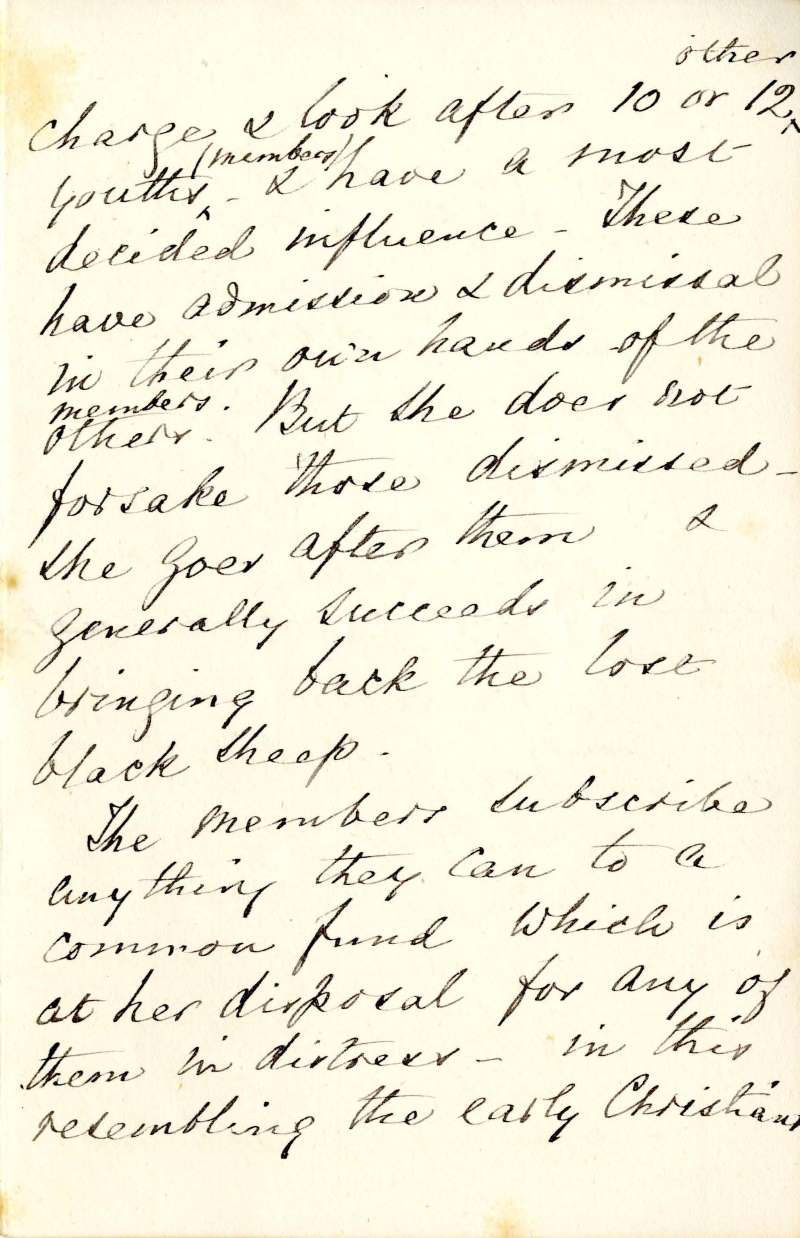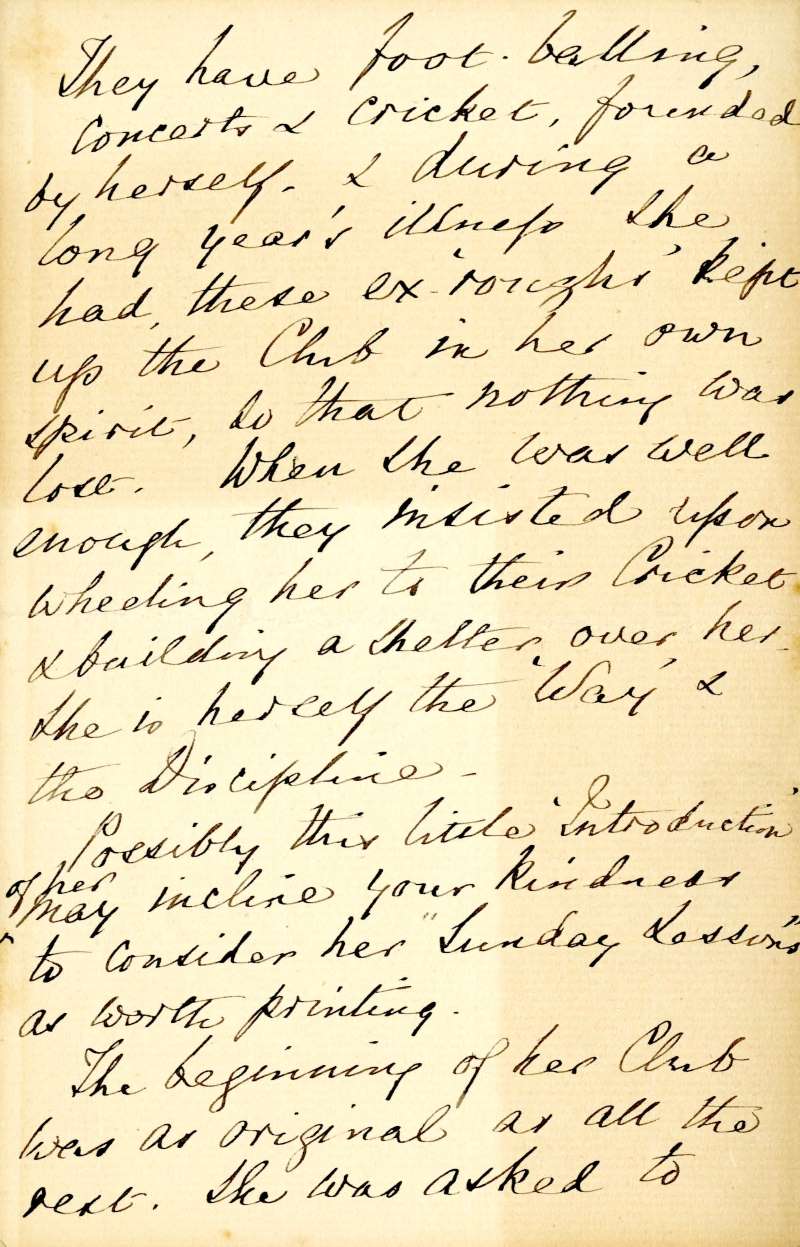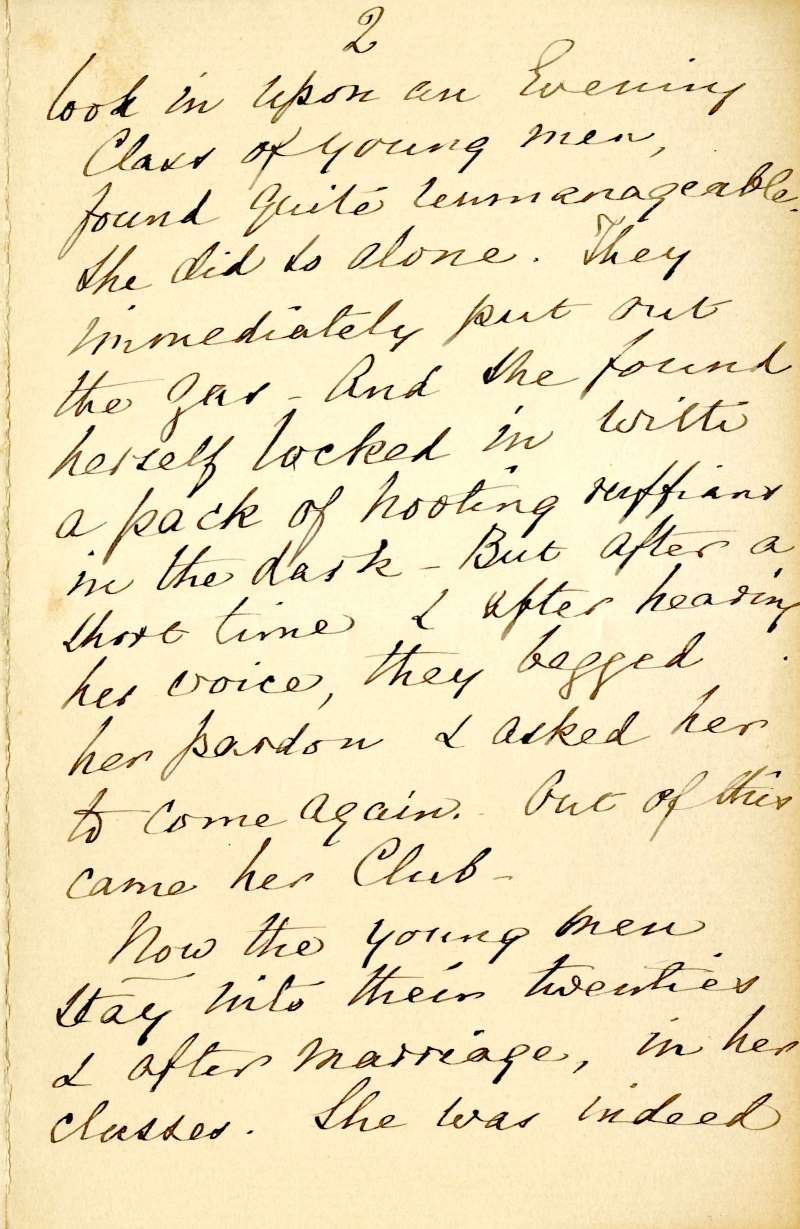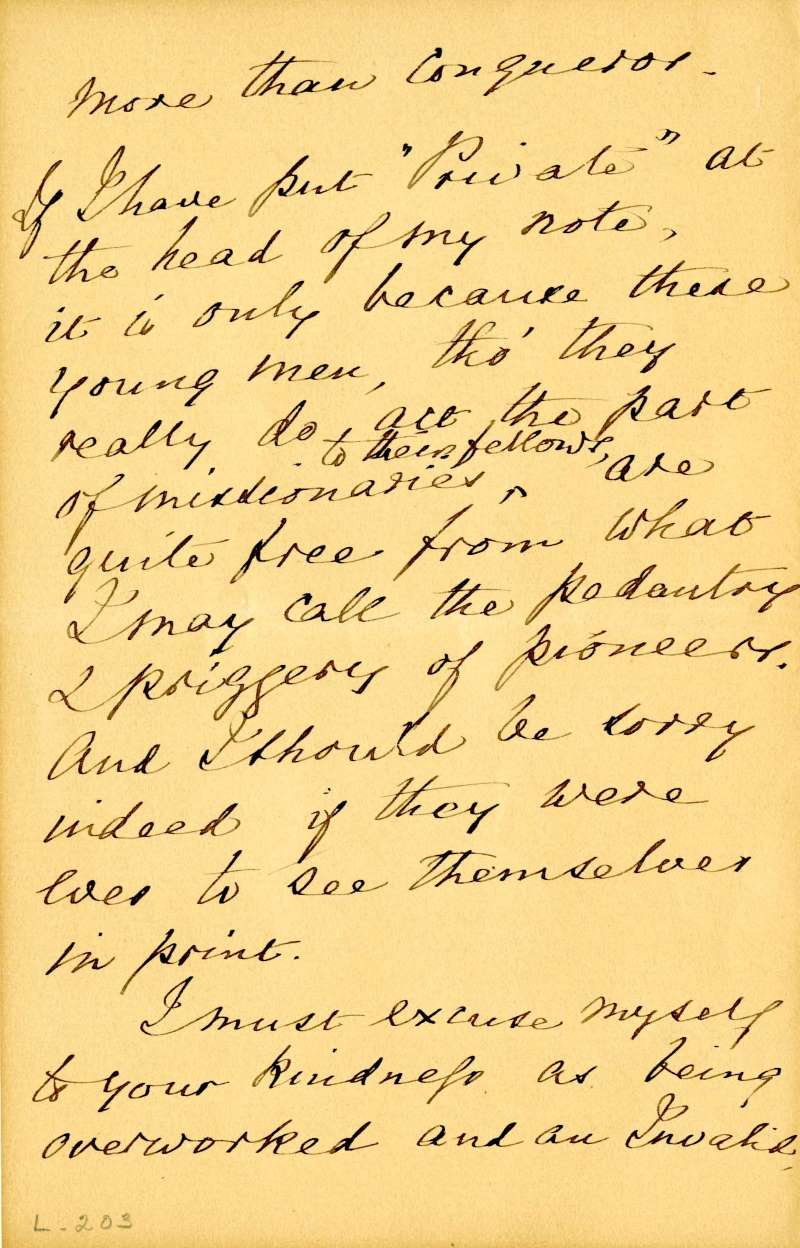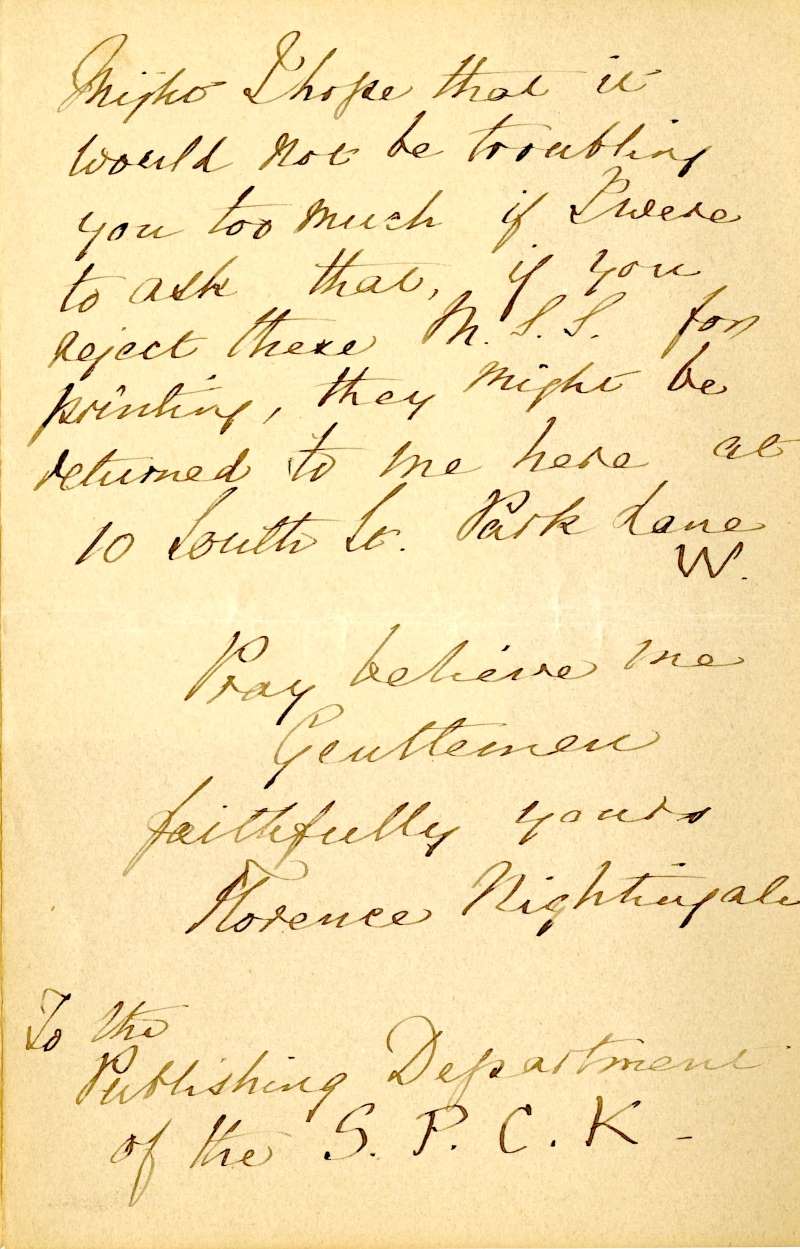The UAB School of Nursing is home to a historically significant exhibit that is like no other in the Southeast and serves as a teaching tool for the many students, faculty and visitors of the School. The Barrett Brock MacKay Florence Nightingale Exhibit features the countless gifts of the founder of nursing, Miss. Nightingale, by virtually showcasing UAB’s entire private collection comprising 50 of her original letters and featuring 16 donor-named letters that were reproduced as part of the physical exhibit.
We are pleased to announce that we will be adding an additional 21 letters to the display and expanding this remarkable exhibit into the Rick and Barrett Brock MacKay Nightingale Scholars Gallery. The expansion will include eight additional Florence Nightingale letters that were donated to the UAB School of Nursing in 2020 by the Upper Room Museum in Nashville, Tennessee.
You can be part of this exciting endeavor by sponsoring one or more of the 21 available Nightingale letters that will be on display in the MacKay Nightingale Scholars Gallery. Sponsorships are $2,500 per letter and may be pledged and paid over five years. Individual letters will be sponsored on a first-come basis, and only 21 letters are available.
Together we can provide faculty, students and the community with tools needed to understand and explore the important linkage between current practice and what Miss Nightingale proposed as evidence-based practice over 100 years ago. For more information on this exclusive giving opportunity, contact Nina Ogden (205) 834-3138 or nogden@uab.edu.
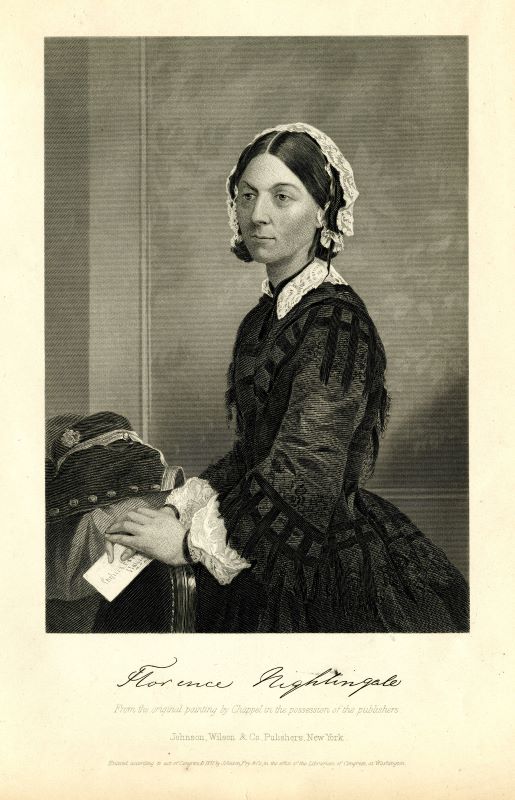
Florence Nightingale Scholars Gallery Additions
Letters Available to be Sponsored
-
Letter Number 1: June 22, 1889 - Florence Nightingale letter to Thomas Gillham Hewlett
Letter 1 of 4
Letter Number 1:Florence Nightingale letter to Thomas Gillham Hewlett, June 22, 1889
Description: T. G. Hewlett thinks that it should be necessary to get approval from the central Government of India to borrow money for local engineering work. In this letter, Nightingale sends her response and the response from the India Office explaining why things should remain de-centralized.
Private & Confidential
June 22/89
10, South Street, Park Lane. W.My dear Sir
You suggested some time ago that the Viceroy should be asked to "lay down a rule that no money would be sanctioned, or that permission to borrow money on loan would not be granted to Municipal bodies, unless the Govt of lndia approved of the Engineer to whom the work would be entrusted".
I have only lately received my answer. The I. 0. does "not see that any interference with local action in the selection of executive instruments could be carried out". (This is from a friend).
In the course of now more than 30 years of confidential intercourse with lndia & the I. 0. on Sanitary matters, I have always found the greatest prudence on & caution necessary in order to carry our good objects, e.g. not to propose or suggest (or even to ask questions upon) measures diametrically opposite to what one knows to be the policy of the day, when founded on great principles, however otherwise desirable.
A recent instance is this: the settled policy, & on the whole is it not a good one? necessitated by the times in which we live - is evidently to de-centralize.
Lord Dufferin's "Resolution" of July 27, 1888, for Sanitary Boards in the several Presidencies is an example of this. Do you think they would go back upon this, & let the Govt of lndia make Sanitary rules for the whole of India? Instead of the local Governments? By the way, could you kindly tell me what you hear of the position of the proposed Sanitary Board in Bombay Presy? Has it been organised? & how? ever sincerely yours (P. Turn Over.) F. Nightingale
Probably you have heard from lndia on this subject. Or perhaps you have heard from Sir J. Peile at home? Viz. how the Sanitary Boards as proposed by Lord Dufferin in lndia ( or at least in Bombay,) are being organized.
F.N.
T. G. Hewlett
-
Letter 2 of 4
Letter Number 1:Florence Nightingale letter to Thomas Gillham Hewlett, June 22, 1889
Description: T. G. Hewlett thinks that it should be necessary to get approval from the central Government of India to borrow money for local engineering work. In this letter, Nightingale sends her response and the response from the India Office explaining why things should remain de-centralized.
Private & Confidential
June 22/89
10, South Street, Park Lane. W.My dear Sir
You suggested some time ago that the Viceroy should be asked to "lay down a rule that no money would be sanctioned, or that permission to borrow money on loan would not be granted to Municipal bodies, unless the Govt of lndia approved of the Engineer to whom the work would be entrusted".
I have only lately received my answer. The I. 0. does "not see that any interference with local action in the selection of executive instruments could be carried out". (This is from a friend).
In the course of now more than 30 years of confidential intercourse with lndia & the I. 0. on Sanitary matters, I have always found the greatest prudence on & caution necessary in order to carry our good objects, e.g. not to propose or suggest (or even to ask questions upon) measures diametrically opposite to what one knows to be the policy of the day, when founded on great principles, however otherwise desirable.
A recent instance is this: the settled policy, & on the whole is it not a good one? necessitated by the times in which we live - is evidently to de-centralize.
Lord Dufferin's "Resolution" of July 27, 1888, for Sanitary Boards in the several Presidencies is an example of this. Do you think they would go back upon this, & let the Govt of lndia make Sanitary rules for the whole of India? Instead of the local Governments? By the way, could you kindly tell me what you hear of the position of the proposed Sanitary Board in Bombay Presy? Has it been organised? & how? ever sincerely yours (P. Turn Over.) F. Nightingale
Probably you have heard from lndia on this subject. Or perhaps you have heard from Sir J. Peile at home? Viz. how the Sanitary Boards as proposed by Lord Dufferin in lndia ( or at least in Bombay,) are being organized.
F.N.
T. G. Hewlett
-
Letter 3 of 4
Letter Number 1:Florence Nightingale letter to Thomas Gillham Hewlett, June 22, 1889
Description: T. G. Hewlett thinks that it should be necessary to get approval from the central Government of India to borrow money for local engineering work. In this letter, Nightingale sends her response and the response from the India Office explaining why things should remain de-centralized.
Private & Confidential
June 22/89
10, South Street, Park Lane. W.My dear Sir
You suggested some time ago that the Viceroy should be asked to "lay down a rule that no money would be sanctioned, or that permission to borrow money on loan would not be granted to Municipal bodies, unless the Govt of lndia approved of the Engineer to whom the work would be entrusted".
I have only lately received my answer. The I. 0. does "not see that any interference with local action in the selection of executive instruments could be carried out". (This is from a friend).
In the course of now more than 30 years of confidential intercourse with lndia & the I. 0. on Sanitary matters, I have always found the greatest prudence on & caution necessary in order to carry our good objects, e.g. not to propose or suggest (or even to ask questions upon) measures diametrically opposite to what one knows to be the policy of the day, when founded on great principles, however otherwise desirable.
A recent instance is this: the settled policy, & on the whole is it not a good one? necessitated by the times in which we live - is evidently to de-centralize.
Lord Dufferin's "Resolution" of July 27, 1888, for Sanitary Boards in the several Presidencies is an example of this. Do you think they would go back upon this, & let the Govt of lndia make Sanitary rules for the whole of India? Instead of the local Governments? By the way, could you kindly tell me what you hear of the position of the proposed Sanitary Board in Bombay Presy? Has it been organised? & how? ever sincerely yours (P. Turn Over.) F. Nightingale
Probably you have heard from lndia on this subject. Or perhaps you have heard from Sir J. Peile at home? Viz. how the Sanitary Boards as proposed by Lord Dufferin in lndia ( or at least in Bombay,) are being organized.
F.N.
T. G. Hewlett
-
Letter 4 of 4
Letter Number 1:Florence Nightingale letter to Thomas Gillham Hewlett, June 22, 1889
Description: T. G. Hewlett thinks that it should be necessary to get approval from the central Government of India to borrow money for local engineering work. In this letter, Nightingale sends her response and the response from the India Office explaining why things should remain de-centralized.
Private & Confidential
June 22/89
10, South Street, Park Lane. W.My dear Sir
You suggested some time ago that the Viceroy should be asked to "lay down a rule that no money would be sanctioned, or that permission to borrow money on loan would not be granted to Municipal bodies, unless the Govt of lndia approved of the Engineer to whom the work would be entrusted".
I have only lately received my answer. The I. 0. does "not see that any interference with local action in the selection of executive instruments could be carried out". (This is from a friend).
In the course of now more than 30 years of confidential intercourse with lndia & the I. 0. on Sanitary matters, I have always found the greatest prudence on & caution necessary in order to carry our good objects, e.g. not to propose or suggest (or even to ask questions upon) measures diametrically opposite to what one knows to be the policy of the day, when founded on great principles, however otherwise desirable.
A recent instance is this: the settled policy, & on the whole is it not a good one? necessitated by the times in which we live - is evidently to de-centralize.
Lord Dufferin's "Resolution" of July 27, 1888, for Sanitary Boards in the several Presidencies is an example of this. Do you think they would go back upon this, & let the Govt of lndia make Sanitary rules for the whole of India? Instead of the local Governments? By the way, could you kindly tell me what you hear of the position of the proposed Sanitary Board in Bombay Presy? Has it been organised? & how? ever sincerely yours (P. Turn Over.) F. Nightingale
Probably you have heard from lndia on this subject. Or perhaps you have heard from Sir J. Peile at home? Viz. how the Sanitary Boards as proposed by Lord Dufferin in lndia ( or at least in Bombay,) are being organized.
F.N.
T. G. Hewlett
-
Letter Number 2: June 29, 1889 - Florence Nightingale letter to an unknown recipient
Letter 1 of 4
Letter Number 2:Florence Nightingale letter to an unknown recipient, June 29, 1889
Description: Florence Nightingale writes to an unknown recipient about sanitary matters in India and the favourable review of a relevant pamphlet.
10 South St
June 29/89My dear Sir
Thank God that Sir M. Mackenzie has given what we cannot but call a favourable view of your case. I do thank God - & His loving-kindness, - & that you have been able to accomplish this trying ordeal - & to be safely landed at Harrow which I hope is "dry & bracing".
Thanks you so much for writing to me.
Before I had your kind note, I wrote to-day to Bedford about the proposed "pamphlet" - dwelling upon its importance,
God bless you
ever sincerely yours
F. NIGHTINGALEPray don't worry about any of these things. It is only because you are so good as to write to me about them that I do to you. I have been hearing of the great distress in Panjam - & particularly of the state of the tanks & the Cholera supervening. They do want Sanitary supervision. For less urgent times, the little Sanitary tract proposed for domestic popular use, on "Cholera", which I mentioned yesterday as planned, in Madras might be useful - But I don't want to urge you on to use your head.
-
Letter 2 of 4
Letter Number 2:Florence Nightingale letter to an unknown recipient, June 29, 1889
Description: Florence Nightingale writes to an unknown recipient about sanitary matters in India and the favourable review of a relevant pamphlet.
10 South St
June 29/89My dear Sir
Thank God that Sir M. Mackenzie has given what we cannot but call a favourable view of your case. I do thank God - & His loving-kindness, - & that you have been able to accomplish this trying ordeal - & to be safely landed at Harrow which I hope is "dry & bracing".
Thanks you so much for writing to me.
Before I had your kind note, I wrote to-day to Bedford about the proposed "pamphlet" - dwelling upon its importance,
God bless you
ever sincerely yours
F. NIGHTINGALEPray don't worry about any of these things. It is only because you are so good as to write to me about them that I do to you. I have been hearing of the great distress in Panjam - & particularly of the state of the tanks & the Cholera supervening. They do want Sanitary supervision. For less urgent times, the little Sanitary tract proposed for domestic popular use, on "Cholera", which I mentioned yesterday as planned, in Madras might be useful - But I don't want to urge you on to use your head.
-
Letter 3 of 4
Letter Number 2:Florence Nightingale letter to an unknown recipient, June 29, 1889
Description: Florence Nightingale writes to an unknown recipient about sanitary matters in India and the favourable review of a relevant pamphlet.
10 South St
June 29/89My dear Sir
Thank God that Sir M. Mackenzie has given what we cannot but call a favourable view of your case. I do thank God - & His loving-kindness, - & that you have been able to accomplish this trying ordeal - & to be safely landed at Harrow which I hope is "dry & bracing".
Thanks you so much for writing to me.
Before I had your kind note, I wrote to-day to Bedford about the proposed "pamphlet" - dwelling upon its importance,
God bless you
ever sincerely yours
F. NIGHTINGALEPray don't worry about any of these things. It is only because you are so good as to write to me about them that I do to you. I have been hearing of the great distress in Panjam - & particularly of the state of the tanks & the Cholera supervening. They do want Sanitary supervision. For less urgent times, the little Sanitary tract proposed for domestic popular use, on "Cholera", which I mentioned yesterday as planned, in Madras might be useful - But I don't want to urge you on to use your head.
-
Letter 4 of 4
Letter Number 2:Florence Nightingale letter to an unknown recipient, June 29, 1889
Description: Florence Nightingale writes to an unknown recipient about sanitary matters in India and the favourable review of a relevant pamphlet.
10 South St
June 29/89My dear Sir
Thank God that Sir M. Mackenzie has given what we cannot but call a favourable view of your case. I do thank God - & His loving-kindness, - & that you have been able to accomplish this trying ordeal - & to be safely landed at Harrow which I hope is "dry & bracing".
Thanks you so much for writing to me.
Before I had your kind note, I wrote to-day to Bedford about the proposed "pamphlet" - dwelling upon its importance,
God bless you
ever sincerely yours
F. NIGHTINGALEPray don't worry about any of these things. It is only because you are so good as to write to me about them that I do to you. I have been hearing of the great distress in Panjam - & particularly of the state of the tanks & the Cholera supervening. They do want Sanitary supervision. For less urgent times, the little Sanitary tract proposed for domestic popular use, on "Cholera", which I mentioned yesterday as planned, in Madras might be useful - But I don't want to urge you on to use your head.
-
Letter Number 3: Unsigned and Undated - Florence Nightingale letter
Letter 1 of 3
Letter Number 3:Florence Nightingale letter, unsigned and undated
Description: This letter is incomplete, with the recipient and date unknown. Nightingale writes about being overworked by those seeking her advice regarding army hospitals.
{First page and date missing}
Well have asked Sidney Herbert, dying at the War Office, (as he did) - to receive bundles in his room during business at the War Office.]
My whole time & more than my whole strength is engaged - I have neither strength to eat nor to sleep - And I have no one to help me.
I am consulted by all sides as to their Army Hospital arrangements. And I always reply with my whole mind.
They perfectly understand that I am at their command now & henceforth. More than this I can't do. And I don't think I should be called on to do otherwise.
[The Italian Volunteer Committee cruelly published a private letter of mine, (written at their own request,) with my address.
And since that time I have been baited & badgered by beggars from all parts of Europe to an extent which would be considered incredible.]
And I have no one to protect me.
in haste ever yours,
F. NightingaleI am obliged to say: this letter is "Private" - For I have been so ill used.
-
Letter 2 of 3
Letter Number 3:Florence Nightingale letter, unsigned and undated
Description: This letter is incomplete, with the recipient and date unknown. Nightingale writes about being overworked by those seeking her advice regarding army hospitals.
{First page and date missing}
Well have asked Sidney Herbert, dying at the War Office, (as he did) - to receive bundles in his room during business at the War Office.]
My whole time & more than my whole strength is engaged - I have neither strength to eat nor to sleep - And I have no one to help me.
I am consulted by all sides as to their Army Hospital arrangements. And I always reply with my whole mind.
They perfectly understand that I am at their command now & henceforth. More than this I can't do. And I don't think I should be called on to do otherwise.
[The Italian Volunteer Committee cruelly published a private letter of mine, (written at their own request,) with my address.
And since that time I have been baited & badgered by beggars from all parts of Europe to an extent which would be considered incredible.]
And I have no one to protect me.
in haste ever yours,
F. NightingaleI am obliged to say: this letter is "Private" - For I have been so ill used.
-
Letter 3 of 3
Letter Number 3:Florence Nightingale letter, unsigned and undated
Description: This letter is incomplete, with the recipient and date unknown. Nightingale writes about being overworked by those seeking her advice regarding army hospitals.
{First page and date missing}
Well have asked Sidney Herbert, dying at the War Office, (as he did) - to receive bundles in his room during business at the War Office.]
My whole time & more than my whole strength is engaged - I have neither strength to eat nor to sleep - And I have no one to help me.
I am consulted by all sides as to their Army Hospital arrangements. And I always reply with my whole mind.
They perfectly understand that I am at their command now & henceforth. More than this I can't do. And I don't think I should be called on to do otherwise.
[The Italian Volunteer Committee cruelly published a private letter of mine, (written at their own request,) with my address.
And since that time I have been baited & badgered by beggars from all parts of Europe to an extent which would be considered incredible.]
And I have no one to protect me.
in haste ever yours,
F. NightingaleI am obliged to say: this letter is "Private" - For I have been so ill used.
-
Letter Number 4: October 17, 1868 - Florence Nightingale letter to Thomas Gillham Hewlett
Letter 1 of 2
Letter Number 4:Florence Nightingale letter to Thomas Gillham Hewlett, October 17, 1868
Description: In this letter, Nightingale urges Hewlett to write to Sir Bartle Frere as soon as possible about the question of the administrative position of the Medical Officer of Health of India. She recognizes that Hewlett's background would make his views particularly valuable.
Private
35 South Street Park Lane W.
Oct 17/68Dear Sir
Since I wrote to you, I have had communication with Sir Bartle Frere & with Dr. Sutherland.
Dr. Sutherland informed me of what had passed between you & him as to the question of the administrative position of the Medical Officer of Health in India, & that you had agreed to address a paper to Sir Bartle Frere on the subject.
As I feel very strongly that this ought to be done, that the whole question is likely now to be raised, perhaps to be included in a scheme, & that it would be very important to have your views as soon as possible on the point, because your great activity, your knowledge, & experience & ability, in Indian practice would endure your views a hearing, I venture to write to say this, & to remind you that, the sooner you can write back such a statement of them, the better for the decision of the question.
Pray believe me
ever your faithful servt
Florence NightingaleGillham Hewlett Esq MD &c &c
-
Letter 2 of 2
Letter Number 4:Florence Nightingale letter to Thomas Gillham Hewlett, October 17, 1868
Description: In this letter, Nightingale urges Hewlett to write to Sir Bartle Frere as soon as possible about the question of the administrative position of the Medical Officer of Health of India. She recognizes that Hewlett's background would make his views particularly valuable.
Private
35 South Street Park Lane W.
Oct 17/68Dear Sir
Since I wrote to you, I have had communication with Sir Bartle Frere & with Dr. Sutherland.
Dr. Sutherland informed me of what had passed between you & him as to the question of the administrative position of the Medical Officer of Health in India, & that you had agreed to address a paper to Sir Bartle Frere on the subject.
As I feel very strongly that this ought to be done, that the whole question is likely now to be raised, perhaps to be included in a scheme, & that it would be very important to have your views as soon as possible on the point, because your great activity, your knowledge, & experience & ability, in Indian practice would endure your views a hearing, I venture to write to say this, & to remind you that, the sooner you can write back such a statement of them, the better for the decision of the question.
Pray believe me
ever your faithful servt
Florence NightingaleGillham Hewlett Esq MD &c &c
-
Letter Number 5: October 2, 1868 - Florence Nightingale letter to Thomas Gillham Hewlett
Letter 1 of 8
Letter Number 5:Florence Nightingale letter to Thomas Gillham Hewlett, October 2, 1868
Description: Florence Nightingale responds to a letter from T. G. Hewlett, Health Officer of Bombay. She explains the debate that has been resolved for England, but that was still undecided concerning India regarding the duties of health officers and inspectors and whether there should be one executive officer over both sanitary positions.
Private
Oct. 2/68Dear Sir
I cannot tell you how sorry I was to hear some weeks ago from Sir B. Frere that you were obliged to come home on sick leave, owing to your too great exertions, and your own account confirms it. On the subject of your letter I can say nothing till I have communicated with Sir B. Frere. But I immediately, on receiving yours, made a private enquiry merely to ascertain "how the land lies". I trust that you will understand, first of all, how much every one here admires the exertions of so earnest & so good an officer, and if any one says a single word in opposition to your views, it is never but for one reason: that things appear to be taking the course which I am going to try to indicate. The Indian practice, which you have been so nobly & successfully following at Bombay, of being Executive Officer, is the very natural sequence from the state of things with which the Health Officer had to contend. It is a very difficult thing for a man who knows what ought to be done to stand by & see it not done, especially when he knows that this neglect will endanger health & life. The whole question of the duties of Officer of Health was considered fully as far back as 1844 in this country. There were two views in regard to it: One that he should simply supply advice and be a check on the Inspectors in their duties. The other, which was actually embodied in a Bill, was: that he should be both Officer of Health & Nuisance Inspectors. After careful discussion, it was decided that the Offices should be separated. This separation has worked very well in England. As regards India, my arrangement must still be considered as tentative. If the Sanitary work cannot be done, unless the precious time, as well as the health, of the Medical Officer has to be devoted to it,
[continued on Oct 5/68]
there is no help but for the Officer of Health to be head of an executive department. But there are so many duties which the Officer of Health has to do, apart from mere executive duties, that, if the time has arrived for separating the Offices, so that there may be an efficient head over all persons engaged in sanitary work, while the Health Officer is left to his special & arduous duties, & acts as a check on the Executive Officer, it will doubtless be an advantage. This is the question now to be decided. You find the matter discussed in the "Suggestions" of the "Army Sanitary Commission." They appear to have arrived at the conviction that the Sanitary Medical Officer had a class of duties quite distinct from the Inspector of Nuisances (which in England, are of an executive character.) I will write again. I must apologize for this short & interrupted note. I have an inflammation in one eye - an extremely unlucky thing for me, who had scarcely any thing but my eyes left. Trusting to hear of your entire restoration to health - which you have so ably employed - & wishing you the ultimate accomplishment of your best wishes, the triumph of the Sanitary cause, I beg that you will believe me dear SirEver your faithful servt.
Florence NightingaleGillham Hewlett Esq MD
-
Letter 2 of 8
Letter Number 5:Florence Nightingale letter to Thomas Gillham Hewlett, October 2, 1868
Description: Florence Nightingale responds to a letter from T. G. Hewlett, Health Officer of Bombay. She explains the debate that has been resolved for England, but that was still undecided concerning India regarding the duties of health officers and inspectors and whether there should be one executive officer over both sanitary positions.
Private
Oct. 2/68Dear Sir
I cannot tell you how sorry I was to hear some weeks ago from Sir B. Frere that you were obliged to come home on sick leave, owing to your too great exertions, and your own account confirms it. On the subject of your letter I can say nothing till I have communicated with Sir B. Frere. But I immediately, on receiving yours, made a private enquiry merely to ascertain "how the land lies". I trust that you will understand, first of all, how much every one here admires the exertions of so earnest & so good an officer, and if any one says a single word in opposition to your views, it is never but for one reason: that things appear to be taking the course which I am going to try to indicate. The Indian practice, which you have been so nobly & successfully following at Bombay, of being Executive Officer, is the very natural sequence from the state of things with which the Health Officer had to contend. It is a very difficult thing for a man who knows what ought to be done to stand by & see it not done, especially when he knows that this neglect will endanger health & life. The whole question of the duties of Officer of Health was considered fully as far back as 1844 in this country. There were two views in regard to it: One that he should simply supply advice and be a check on the Inspectors in their duties. The other, which was actually embodied in a Bill, was: that he should be both Officer of Health & Nuisance Inspectors. After careful discussion, it was decided that the Offices should be separated. This separation has worked very well in England. As regards India, my arrangement must still be considered as tentative. If the Sanitary work cannot be done, unless the precious time, as well as the health, of the Medical Officer has to be devoted to it,
[continued on Oct 5/68]
there is no help but for the Officer of Health to be head of an executive department. But there are so many duties which the Officer of Health has to do, apart from mere executive duties, that, if the time has arrived for separating the Offices, so that there may be an efficient head over all persons engaged in sanitary work, while the Health Officer is left to his special & arduous duties, & acts as a check on the Executive Officer, it will doubtless be an advantage. This is the question now to be decided. You find the matter discussed in the "Suggestions" of the "Army Sanitary Commission." They appear to have arrived at the conviction that the Sanitary Medical Officer had a class of duties quite distinct from the Inspector of Nuisances (which in England, are of an executive character.) I will write again. I must apologize for this short & interrupted note. I have an inflammation in one eye - an extremely unlucky thing for me, who had scarcely any thing but my eyes left. Trusting to hear of your entire restoration to health - which you have so ably employed - & wishing you the ultimate accomplishment of your best wishes, the triumph of the Sanitary cause, I beg that you will believe me dear SirEver your faithful servt.
Florence NightingaleGillham Hewlett Esq MD
-
Letter 3 of 8
Letter Number 5:Florence Nightingale letter to Thomas Gillham Hewlett, October 2, 1868
Description: Florence Nightingale responds to a letter from T. G. Hewlett, Health Officer of Bombay. She explains the debate that has been resolved for England, but that was still undecided concerning India regarding the duties of health officers and inspectors and whether there should be one executive officer over both sanitary positions.
Private
Oct. 2/68Dear Sir
I cannot tell you how sorry I was to hear some weeks ago from Sir B. Frere that you were obliged to come home on sick leave, owing to your too great exertions, and your own account confirms it. On the subject of your letter I can say nothing till I have communicated with Sir B. Frere. But I immediately, on receiving yours, made a private enquiry merely to ascertain "how the land lies". I trust that you will understand, first of all, how much every one here admires the exertions of so earnest & so good an officer, and if any one says a single word in opposition to your views, it is never but for one reason: that things appear to be taking the course which I am going to try to indicate. The Indian practice, which you have been so nobly & successfully following at Bombay, of being Executive Officer, is the very natural sequence from the state of things with which the Health Officer had to contend. It is a very difficult thing for a man who knows what ought to be done to stand by & see it not done, especially when he knows that this neglect will endanger health & life. The whole question of the duties of Officer of Health was considered fully as far back as 1844 in this country. There were two views in regard to it: One that he should simply supply advice and be a check on the Inspectors in their duties. The other, which was actually embodied in a Bill, was: that he should be both Officer of Health & Nuisance Inspectors. After careful discussion, it was decided that the Offices should be separated. This separation has worked very well in England. As regards India, my arrangement must still be considered as tentative. If the Sanitary work cannot be done, unless the precious time, as well as the health, of the Medical Officer has to be devoted to it,
[continued on Oct 5/68]
there is no help but for the Officer of Health to be head of an executive department. But there are so many duties which the Officer of Health has to do, apart from mere executive duties, that, if the time has arrived for separating the Offices, so that there may be an efficient head over all persons engaged in sanitary work, while the Health Officer is left to his special & arduous duties, & acts as a check on the Executive Officer, it will doubtless be an advantage. This is the question now to be decided. You find the matter discussed in the "Suggestions" of the "Army Sanitary Commission." They appear to have arrived at the conviction that the Sanitary Medical Officer had a class of duties quite distinct from the Inspector of Nuisances (which in England, are of an executive character.) I will write again. I must apologize for this short & interrupted note. I have an inflammation in one eye - an extremely unlucky thing for me, who had scarcely any thing but my eyes left. Trusting to hear of your entire restoration to health - which you have so ably employed - & wishing you the ultimate accomplishment of your best wishes, the triumph of the Sanitary cause, I beg that you will believe me dear SirEver your faithful servt.
Florence NightingaleGillham Hewlett Esq MD
-
Letter 4 of 8
Letter Number 5:Florence Nightingale letter to Thomas Gillham Hewlett, October 2, 1868
Description: Florence Nightingale responds to a letter from T. G. Hewlett, Health Officer of Bombay. She explains the debate that has been resolved for England, but that was still undecided concerning India regarding the duties of health officers and inspectors and whether there should be one executive officer over both sanitary positions.
Private
Oct. 2/68Dear Sir
I cannot tell you how sorry I was to hear some weeks ago from Sir B. Frere that you were obliged to come home on sick leave, owing to your too great exertions, and your own account confirms it. On the subject of your letter I can say nothing till I have communicated with Sir B. Frere. But I immediately, on receiving yours, made a private enquiry merely to ascertain "how the land lies". I trust that you will understand, first of all, how much every one here admires the exertions of so earnest & so good an officer, and if any one says a single word in opposition to your views, it is never but for one reason: that things appear to be taking the course which I am going to try to indicate. The Indian practice, which you have been so nobly & successfully following at Bombay, of being Executive Officer, is the very natural sequence from the state of things with which the Health Officer had to contend. It is a very difficult thing for a man who knows what ought to be done to stand by & see it not done, especially when he knows that this neglect will endanger health & life. The whole question of the duties of Officer of Health was considered fully as far back as 1844 in this country. There were two views in regard to it: One that he should simply supply advice and be a check on the Inspectors in their duties. The other, which was actually embodied in a Bill, was: that he should be both Officer of Health & Nuisance Inspectors. After careful discussion, it was decided that the Offices should be separated. This separation has worked very well in England. As regards India, my arrangement must still be considered as tentative. If the Sanitary work cannot be done, unless the precious time, as well as the health, of the Medical Officer has to be devoted to it,
[continued on Oct 5/68]
there is no help but for the Officer of Health to be head of an executive department. But there are so many duties which the Officer of Health has to do, apart from mere executive duties, that, if the time has arrived for separating the Offices, so that there may be an efficient head over all persons engaged in sanitary work, while the Health Officer is left to his special & arduous duties, & acts as a check on the Executive Officer, it will doubtless be an advantage. This is the question now to be decided. You find the matter discussed in the "Suggestions" of the "Army Sanitary Commission." They appear to have arrived at the conviction that the Sanitary Medical Officer had a class of duties quite distinct from the Inspector of Nuisances (which in England, are of an executive character.) I will write again. I must apologize for this short & interrupted note. I have an inflammation in one eye - an extremely unlucky thing for me, who had scarcely any thing but my eyes left. Trusting to hear of your entire restoration to health - which you have so ably employed - & wishing you the ultimate accomplishment of your best wishes, the triumph of the Sanitary cause, I beg that you will believe me dear SirEver your faithful servt.
Florence NightingaleGillham Hewlett Esq MD
-
Letter 5 of 8
Letter Number 5:Florence Nightingale letter to Thomas Gillham Hewlett, October 2, 1868
Description: Florence Nightingale responds to a letter from T. G. Hewlett, Health Officer of Bombay. She explains the debate that has been resolved for England, but that was still undecided concerning India regarding the duties of health officers and inspectors and whether there should be one executive officer over both sanitary positions.
Private
Oct. 2/68Dear Sir
I cannot tell you how sorry I was to hear some weeks ago from Sir B. Frere that you were obliged to come home on sick leave, owing to your too great exertions, and your own account confirms it. On the subject of your letter I can say nothing till I have communicated with Sir B. Frere. But I immediately, on receiving yours, made a private enquiry merely to ascertain "how the land lies". I trust that you will understand, first of all, how much every one here admires the exertions of so earnest & so good an officer, and if any one says a single word in opposition to your views, it is never but for one reason: that things appear to be taking the course which I am going to try to indicate. The Indian practice, which you have been so nobly & successfully following at Bombay, of being Executive Officer, is the very natural sequence from the state of things with which the Health Officer had to contend. It is a very difficult thing for a man who knows what ought to be done to stand by & see it not done, especially when he knows that this neglect will endanger health & life. The whole question of the duties of Officer of Health was considered fully as far back as 1844 in this country. There were two views in regard to it: One that he should simply supply advice and be a check on the Inspectors in their duties. The other, which was actually embodied in a Bill, was: that he should be both Officer of Health & Nuisance Inspectors. After careful discussion, it was decided that the Offices should be separated. This separation has worked very well in England. As regards India, my arrangement must still be considered as tentative. If the Sanitary work cannot be done, unless the precious time, as well as the health, of the Medical Officer has to be devoted to it,
[continued on Oct 5/68]
there is no help but for the Officer of Health to be head of an executive department. But there are so many duties which the Officer of Health has to do, apart from mere executive duties, that, if the time has arrived for separating the Offices, so that there may be an efficient head over all persons engaged in sanitary work, while the Health Officer is left to his special & arduous duties, & acts as a check on the Executive Officer, it will doubtless be an advantage. This is the question now to be decided. You find the matter discussed in the "Suggestions" of the "Army Sanitary Commission." They appear to have arrived at the conviction that the Sanitary Medical Officer had a class of duties quite distinct from the Inspector of Nuisances (which in England, are of an executive character.) I will write again. I must apologize for this short & interrupted note. I have an inflammation in one eye - an extremely unlucky thing for me, who had scarcely any thing but my eyes left. Trusting to hear of your entire restoration to health - which you have so ably employed - & wishing you the ultimate accomplishment of your best wishes, the triumph of the Sanitary cause, I beg that you will believe me dear SirEver your faithful servt.
Florence NightingaleGillham Hewlett Esq MD
-
Letter 6 of 8
Letter Number 5:Florence Nightingale letter to Thomas Gillham Hewlett, October 2, 1868
Description: Florence Nightingale responds to a letter from T. G. Hewlett, Health Officer of Bombay. She explains the debate that has been resolved for England, but that was still undecided concerning India regarding the duties of health officers and inspectors and whether there should be one executive officer over both sanitary positions.
Private
Oct. 2/68Dear Sir
I cannot tell you how sorry I was to hear some weeks ago from Sir B. Frere that you were obliged to come home on sick leave, owing to your too great exertions, and your own account confirms it. On the subject of your letter I can say nothing till I have communicated with Sir B. Frere. But I immediately, on receiving yours, made a private enquiry merely to ascertain "how the land lies". I trust that you will understand, first of all, how much every one here admires the exertions of so earnest & so good an officer, and if any one says a single word in opposition to your views, it is never but for one reason: that things appear to be taking the course which I am going to try to indicate. The Indian practice, which you have been so nobly & successfully following at Bombay, of being Executive Officer, is the very natural sequence from the state of things with which the Health Officer had to contend. It is a very difficult thing for a man who knows what ought to be done to stand by & see it not done, especially when he knows that this neglect will endanger health & life. The whole question of the duties of Officer of Health was considered fully as far back as 1844 in this country. There were two views in regard to it: One that he should simply supply advice and be a check on the Inspectors in their duties. The other, which was actually embodied in a Bill, was: that he should be both Officer of Health & Nuisance Inspectors. After careful discussion, it was decided that the Offices should be separated. This separation has worked very well in England. As regards India, my arrangement must still be considered as tentative. If the Sanitary work cannot be done, unless the precious time, as well as the health, of the Medical Officer has to be devoted to it,
[continued on Oct 5/68]
there is no help but for the Officer of Health to be head of an executive department. But there are so many duties which the Officer of Health has to do, apart from mere executive duties, that, if the time has arrived for separating the Offices, so that there may be an efficient head over all persons engaged in sanitary work, while the Health Officer is left to his special & arduous duties, & acts as a check on the Executive Officer, it will doubtless be an advantage. This is the question now to be decided. You find the matter discussed in the "Suggestions" of the "Army Sanitary Commission." They appear to have arrived at the conviction that the Sanitary Medical Officer had a class of duties quite distinct from the Inspector of Nuisances (which in England, are of an executive character.) I will write again. I must apologize for this short & interrupted note. I have an inflammation in one eye - an extremely unlucky thing for me, who had scarcely any thing but my eyes left. Trusting to hear of your entire restoration to health - which you have so ably employed - & wishing you the ultimate accomplishment of your best wishes, the triumph of the Sanitary cause, I beg that you will believe me dear SirEver your faithful servt.
Florence NightingaleGillham Hewlett Esq MD
-
Letter 7 of 8
Letter Number 5:Florence Nightingale letter to Thomas Gillham Hewlett, October 2, 1868
Description: Florence Nightingale responds to a letter from T. G. Hewlett, Health Officer of Bombay. She explains the debate that has been resolved for England, but that was still undecided concerning India regarding the duties of health officers and inspectors and whether there should be one executive officer over both sanitary positions.
Private
Oct. 2/68Dear Sir
I cannot tell you how sorry I was to hear some weeks ago from Sir B. Frere that you were obliged to come home on sick leave, owing to your too great exertions, and your own account confirms it. On the subject of your letter I can say nothing till I have communicated with Sir B. Frere. But I immediately, on receiving yours, made a private enquiry merely to ascertain "how the land lies". I trust that you will understand, first of all, how much every one here admires the exertions of so earnest & so good an officer, and if any one says a single word in opposition to your views, it is never but for one reason: that things appear to be taking the course which I am going to try to indicate. The Indian practice, which you have been so nobly & successfully following at Bombay, of being Executive Officer, is the very natural sequence from the state of things with which the Health Officer had to contend. It is a very difficult thing for a man who knows what ought to be done to stand by & see it not done, especially when he knows that this neglect will endanger health & life. The whole question of the duties of Officer of Health was considered fully as far back as 1844 in this country. There were two views in regard to it: One that he should simply supply advice and be a check on the Inspectors in their duties. The other, which was actually embodied in a Bill, was: that he should be both Officer of Health & Nuisance Inspectors. After careful discussion, it was decided that the Offices should be separated. This separation has worked very well in England. As regards India, my arrangement must still be considered as tentative. If the Sanitary work cannot be done, unless the precious time, as well as the health, of the Medical Officer has to be devoted to it,
[continued on Oct 5/68]
there is no help but for the Officer of Health to be head of an executive department. But there are so many duties which the Officer of Health has to do, apart from mere executive duties, that, if the time has arrived for separating the Offices, so that there may be an efficient head over all persons engaged in sanitary work, while the Health Officer is left to his special & arduous duties, & acts as a check on the Executive Officer, it will doubtless be an advantage. This is the question now to be decided. You find the matter discussed in the "Suggestions" of the "Army Sanitary Commission." They appear to have arrived at the conviction that the Sanitary Medical Officer had a class of duties quite distinct from the Inspector of Nuisances (which in England, are of an executive character.) I will write again. I must apologize for this short & interrupted note. I have an inflammation in one eye - an extremely unlucky thing for me, who had scarcely any thing but my eyes left. Trusting to hear of your entire restoration to health - which you have so ably employed - & wishing you the ultimate accomplishment of your best wishes, the triumph of the Sanitary cause, I beg that you will believe me dear SirEver your faithful servt.
Florence NightingaleGillham Hewlett Esq MD
-
Letter 8 of 8
Letter Number 5:Florence Nightingale letter to Thomas Gillham Hewlett, October 2, 1868
Description: Florence Nightingale responds to a letter from T. G. Hewlett, Health Officer of Bombay. She explains the debate that has been resolved for England, but that was still undecided concerning India regarding the duties of health officers and inspectors and whether there should be one executive officer over both sanitary positions.
Private
Oct. 2/68Dear Sir
I cannot tell you how sorry I was to hear some weeks ago from Sir B. Frere that you were obliged to come home on sick leave, owing to your too great exertions, and your own account confirms it. On the subject of your letter I can say nothing till I have communicated with Sir B. Frere. But I immediately, on receiving yours, made a private enquiry merely to ascertain "how the land lies". I trust that you will understand, first of all, how much every one here admires the exertions of so earnest & so good an officer, and if any one says a single word in opposition to your views, it is never but for one reason: that things appear to be taking the course which I am going to try to indicate. The Indian practice, which you have been so nobly & successfully following at Bombay, of being Executive Officer, is the very natural sequence from the state of things with which the Health Officer had to contend. It is a very difficult thing for a man who knows what ought to be done to stand by & see it not done, especially when he knows that this neglect will endanger health & life. The whole question of the duties of Officer of Health was considered fully as far back as 1844 in this country. There were two views in regard to it: One that he should simply supply advice and be a check on the Inspectors in their duties. The other, which was actually embodied in a Bill, was: that he should be both Officer of Health & Nuisance Inspectors. After careful discussion, it was decided that the Offices should be separated. This separation has worked very well in England. As regards India, my arrangement must still be considered as tentative. If the Sanitary work cannot be done, unless the precious time, as well as the health, of the Medical Officer has to be devoted to it,
[continued on Oct 5/68]
there is no help but for the Officer of Health to be head of an executive department. But there are so many duties which the Officer of Health has to do, apart from mere executive duties, that, if the time has arrived for separating the Offices, so that there may be an efficient head over all persons engaged in sanitary work, while the Health Officer is left to his special & arduous duties, & acts as a check on the Executive Officer, it will doubtless be an advantage. This is the question now to be decided. You find the matter discussed in the "Suggestions" of the "Army Sanitary Commission." They appear to have arrived at the conviction that the Sanitary Medical Officer had a class of duties quite distinct from the Inspector of Nuisances (which in England, are of an executive character.) I will write again. I must apologize for this short & interrupted note. I have an inflammation in one eye - an extremely unlucky thing for me, who had scarcely any thing but my eyes left. Trusting to hear of your entire restoration to health - which you have so ably employed - & wishing you the ultimate accomplishment of your best wishes, the triumph of the Sanitary cause, I beg that you will believe me dear SirEver your faithful servt.
Florence NightingaleGillham Hewlett Esq MD
-
Letter Number 6: November 7, 1868 - Florence Nightingale letter to Thomas Gillham Hewlett
Letter 1 of 3
Letter Number 6:Florence Nightingale letter to Thomas Gillham Hewlett, November 7, 1868
Description: Nightingale explains to T. G. Hewlett, Health Officer of Bombay, how the sanitary works of municipal officers in Bombay came to be omitted from a recent report. She assures him that the mistake will be corrected in next year's report.
Private
35 South Street Park Lane. W.
7 Nov./68Dear Sir
First of all, let me say that I have mentioned the subject on which you are so justly indignant, (viz. the omission from the Blue Book ("Memorandum") of all mention of the energetic & successful Sanitary works at Bombay of the Municipal Officers) at the India Office.
This omission arose, as I dare say you know, in the following manner: the Municipal Reports were actually pointed out to the compilers of the Blue Book - It was shewn them that they emanated from the Government press- But, because unfortunately they had not been sent officially by the Government, they could not be inserted. I believe we are quite safe in saying, that this omission shall be fully & satisfactorily explained in the next year's Blue Book and an abstract of the Municipal Reports given from the first. I feel sure that Sir Bartle Frere shares your feeling, as indeed I do.
I have seen your very able answers to Dr. Sutherland's queries relative to your printed statement about the position of Officers of Health for India. The whole question will now be discussed with a sincere intention of coming to some decision, some practical organization, some Executive, in short.
Ever your faithful servt
FLORENCE NIGHTINGALE -
Letter 2 of 3
Letter Number 6:Florence Nightingale letter to Thomas Gillham Hewlett, November 7, 1868
Description: Nightingale explains to T. G. Hewlett, Health Officer of Bombay, how the sanitary works of municipal officers in Bombay came to be omitted from a recent report. She assures him that the mistake will be corrected in next year's report.
Private
35 South Street Park Lane. W.
7 Nov./68Dear Sir
First of all, let me say that I have mentioned the subject on which you are so justly indignant, (viz. the omission from the Blue Book ("Memorandum") of all mention of the energetic & successful Sanitary works at Bombay of the Municipal Officers) at the India Office.
This omission arose, as I dare say you know, in the following manner: the Municipal Reports were actually pointed out to the compilers of the Blue Book - It was shewn them that they emanated from the Government press- But, because unfortunately they had not been sent officially by the Government, they could not be inserted. I believe we are quite safe in saying, that this omission shall be fully & satisfactorily explained in the next year's Blue Book and an abstract of the Municipal Reports given from the first. I feel sure that Sir Bartle Frere shares your feeling, as indeed I do.
I have seen your very able answers to Dr. Sutherland's queries relative to your printed statement about the position of Officers of Health for India. The whole question will now be discussed with a sincere intention of coming to some decision, some practical organization, some Executive, in short.
Ever your faithful servt
FLORENCE NIGHTINGALE -
Letter 3 of 3
Letter Number 6:Florence Nightingale letter to Thomas Gillham Hewlett, November 7, 1868
Description: Nightingale explains to T. G. Hewlett, Health Officer of Bombay, how the sanitary works of municipal officers in Bombay came to be omitted from a recent report. She assures him that the mistake will be corrected in next year's report.
Private
35 South Street Park Lane. W.
7 Nov./68Dear Sir
First of all, let me say that I have mentioned the subject on which you are so justly indignant, (viz. the omission from the Blue Book ("Memorandum") of all mention of the energetic & successful Sanitary works at Bombay of the Municipal Officers) at the India Office.
This omission arose, as I dare say you know, in the following manner: the Municipal Reports were actually pointed out to the compilers of the Blue Book - It was shewn them that they emanated from the Government press- But, because unfortunately they had not been sent officially by the Government, they could not be inserted. I believe we are quite safe in saying, that this omission shall be fully & satisfactorily explained in the next year's Blue Book and an abstract of the Municipal Reports given from the first. I feel sure that Sir Bartle Frere shares your feeling, as indeed I do.
I have seen your very able answers to Dr. Sutherland's queries relative to your printed statement about the position of Officers of Health for India. The whole question will now be discussed with a sincere intention of coming to some decision, some practical organization, some Executive, in short.
Ever your faithful servt
FLORENCE NIGHTINGALE
-
Letter Number 7: August 2, 1889 - Florence Nightingale letter to Thomas Gillham Hewlett
Letter 1 of 4
Letter Number 7:Florence Nightingale letter to Thomas Gillham Hewlett, August 2, 1889
Description: Nightingale informs T. G. Hewlett that she has forwarded the proof of his pamphlet, "Village Sanitation in India," to Sir Douglas Galton for his valuable suggestions. She also explains that problems with her eyes make it difficult to read.
Dictated No 1
10 South St Park Lane
August 2 July 31 '89My dear Sir,
I was very, glad to hear from you; and it was kind of you to send me your Doctor's verdict; because you knew how anxious I was to hear it, and I hope, on the whole, we may consider it a favorable one.
Thank you for sending me a proof of your pamphlet 'Village Sanitation in India.' I don't know what you will say to me; but as I understood that you had sent out only one proof, (this to me), and none to Sir Douglas Galton, whose suggestions are so much more valuable than mine would be, I sent my proof to Sir Douglas Galton, asking him to return it if he had received one from you. But, to my great distress, I found he was not in London, and they did not even know his address. (He is often on arbitration business in England & Paris, and has not his letters always forwarded). But it was said that he would be in London within a week. I do not quite know what to do. I was in hopes that the pamphlet would have been printed in a larger and clearer type, because it will be almost hopeless to get the great men, like Lord Lansdowne, to read it unless in a fair type.
And yet it is so important, if this vital subject (in a Land of Villages) is to make real progress, that the Rulers should be properly incensed. You truly say that there is no more urgent subject. I myself can hardly read it, with defective eyes, and I am afraid I should be a long while reading little bits at a time - in making the suggestions you desire, without blinding myself, and these suggestions might after all be of little use to me. You desire to have the proof back "as soon as possible." I think I will keep the pamphlet, if you give me leave, till I can hear from you, and Lady
Galton has promised to send me her husband's address as soon as she has it herself, which may be today. I do not underrate the value of the pamphlet, believe me; it is because I think it impossible to overrate it that I wish so very much it should have good clothes on.
Ever yours Sincerely
F. NIGHTINGALET. G.Hewlett Esq
-
Letter 1 of 4
Letter Number 7:Florence Nightingale letter to Thomas Gillham Hewlett, August 2, 1889
Description: Nightingale informs T. G. Hewlett that she has forwarded the proof of his pamphlet, "Village Sanitation in India," to Sir Douglas Galton for his valuable suggestions. She also explains that problems with her eyes make it difficult to read.
Dictated No 1
10 South St Park Lane
August 2 July 31 '89My dear Sir,
I was very, glad to hear from you; and it was kind of you to send me your Doctor's verdict; because you knew how anxious I was to hear it, and I hope, on the whole, we may consider it a favorable one.
Thank you for sending me a proof of your pamphlet 'Village Sanitation in India.' I don't know what you will say to me; but as I understood that you had sent out only one proof, (this to me), and none to Sir Douglas Galton, whose suggestions are so much more valuable than mine would be, I sent my proof to Sir Douglas Galton, asking him to return it if he had received one from you. But, to my great distress, I found he was not in London, and they did not even know his address. (He is often on arbitration business in England & Paris, and has not his letters always forwarded). But it was said that he would be in London within a week. I do not quite know what to do. I was in hopes that the pamphlet would have been printed in a larger and clearer type, because it will be almost hopeless to get the great men, like Lord Lansdowne, to read it unless in a fair type.
And yet it is so important, if this vital subject (in a Land of Villages) is to make real progress, that the Rulers should be properly incensed. You truly say that there is no more urgent subject. I myself can hardly read it, with defective eyes, and I am afraid I should be a long while reading little bits at a time - in making the suggestions you desire, without blinding myself, and these suggestions might after all be of little use to me. You desire to have the proof back "as soon as possible." I think I will keep the pamphlet, if you give me leave, till I can hear from you, and Lady
Galton has promised to send me her husband's address as soon as she has it herself, which may be today. I do not underrate the value of the pamphlet, believe me; it is because I think it impossible to overrate it that I wish so very much it should have good clothes on.
Ever yours Sincerely
F. NIGHTINGALET. G.Hewlett Esq
-
Letter 1 of 4
Letter Number 7:Florence Nightingale letter to Thomas Gillham Hewlett, August 2, 1889
Description: Nightingale informs T. G. Hewlett that she has forwarded the proof of his pamphlet, "Village Sanitation in India," to Sir Douglas Galton for his valuable suggestions. She also explains that problems with her eyes make it difficult to read.
Dictated No 1
10 South St Park Lane
August 2 July 31 '89My dear Sir,
I was very, glad to hear from you; and it was kind of you to send me your Doctor's verdict; because you knew how anxious I was to hear it, and I hope, on the whole, we may consider it a favorable one.
Thank you for sending me a proof of your pamphlet 'Village Sanitation in India.' I don't know what you will say to me; but as I understood that you had sent out only one proof, (this to me), and none to Sir Douglas Galton, whose suggestions are so much more valuable than mine would be, I sent my proof to Sir Douglas Galton, asking him to return it if he had received one from you. But, to my great distress, I found he was not in London, and they did not even know his address. (He is often on arbitration business in England & Paris, and has not his letters always forwarded). But it was said that he would be in London within a week. I do not quite know what to do. I was in hopes that the pamphlet would have been printed in a larger and clearer type, because it will be almost hopeless to get the great men, like Lord Lansdowne, to read it unless in a fair type.
And yet it is so important, if this vital subject (in a Land of Villages) is to make real progress, that the Rulers should be properly incensed. You truly say that there is no more urgent subject. I myself can hardly read it, with defective eyes, and I am afraid I should be a long while reading little bits at a time - in making the suggestions you desire, without blinding myself, and these suggestions might after all be of little use to me. You desire to have the proof back "as soon as possible." I think I will keep the pamphlet, if you give me leave, till I can hear from you, and Lady
Galton has promised to send me her husband's address as soon as she has it herself, which may be today. I do not underrate the value of the pamphlet, believe me; it is because I think it impossible to overrate it that I wish so very much it should have good clothes on.
Ever yours Sincerely
F. NIGHTINGALET. G.Hewlett Esq
-
Letter 1 of 4
Letter Number 7:Florence Nightingale letter to Thomas Gillham Hewlett, August 2, 1889
Description: Nightingale informs T. G. Hewlett that she has forwarded the proof of his pamphlet, "Village Sanitation in India," to Sir Douglas Galton for his valuable suggestions. She also explains that problems with her eyes make it difficult to read.
Dictated No 1
10 South St Park Lane
August 2 July 31 '89My dear Sir,
I was very, glad to hear from you; and it was kind of you to send me your Doctor's verdict; because you knew how anxious I was to hear it, and I hope, on the whole, we may consider it a favorable one.
Thank you for sending me a proof of your pamphlet 'Village Sanitation in India.' I don't know what you will say to me; but as I understood that you had sent out only one proof, (this to me), and none to Sir Douglas Galton, whose suggestions are so much more valuable than mine would be, I sent my proof to Sir Douglas Galton, asking him to return it if he had received one from you. But, to my great distress, I found he was not in London, and they did not even know his address. (He is often on arbitration business in England & Paris, and has not his letters always forwarded). But it was said that he would be in London within a week. I do not quite know what to do. I was in hopes that the pamphlet would have been printed in a larger and clearer type, because it will be almost hopeless to get the great men, like Lord Lansdowne, to read it unless in a fair type.
And yet it is so important, if this vital subject (in a Land of Villages) is to make real progress, that the Rulers should be properly incensed. You truly say that there is no more urgent subject. I myself can hardly read it, with defective eyes, and I am afraid I should be a long while reading little bits at a time - in making the suggestions you desire, without blinding myself, and these suggestions might after all be of little use to me. You desire to have the proof back "as soon as possible." I think I will keep the pamphlet, if you give me leave, till I can hear from you, and Lady
Galton has promised to send me her husband's address as soon as she has it herself, which may be today. I do not underrate the value of the pamphlet, believe me; it is because I think it impossible to overrate it that I wish so very much it should have good clothes on.
Ever yours Sincerely
F. NIGHTINGALET. G.Hewlett Esq
-
Letter Number 8: August 3, 1889 - Florence Nightingale letter to Thomas Gillham Hewlett
Letter 1 of 4
Letter Number 8:Florence Nightingale letter to Thomas Gillham Hewlett, August 3, 1889
Description: Nightingale writes to T. G. Hewlett about the proof for a document he is working on. She also mentions giving advice to native Indian associations about a government bill, which is probably the Bombay Village Sanitation Bill.
August 3/89
10 South Street Grosvenor Square. W.My dear Sir
I am glad after all that I did not send my meager note No 1 yesterday. I hear from Lady Galton this morning that Sir Douglas Galton is "now in Paris on business of the Jury of the Exhibition, but he is expected to return to London on Monday" or a day or two later. And she does "not forward letters to him."
I think if you see no objection that I had better keep your valuable Proof till he returns - You may depend on me to make no unnecessary delays -And I may be able to do a little to it myself.
Another thing which I could not say by another hand: The printer must not hurry you. If he can't spare his type, I will gladly pay for any extra expence in keeping it. It is impossible to hurry very busy persons in criticizing such a valuable document.
And if it could be printed in a better type, I would for the reasons in my No 1, gladly pay for it - for your sake & that of the cause. I trust that its gist does not run directly counter to Govt. They honestly think they are getting in the "thin edge of the wedge" by their present Bill. I believe they would have adopted some of the suggestions I humbly made to the native Associations. But they will not stand lecturing. And I doubt whether they will make much change now but will try to administer the Act sympathetically to the people. God grant they may. Your "thick end of the wedgewill follow".
And may all God's best blessings be yours - I trust you are going on well.
Ever yours Sincerely
FLORENCE NIGHTINGALEDr. Hewlett
-
Letter 2 of 4
Letter Number 8:Florence Nightingale letter to Thomas Gillham Hewlett, August 3, 1889
Description: Nightingale writes to T. G. Hewlett about the proof for a document he is working on. She also mentions giving advice to native Indian associations about a government bill, which is probably the Bombay Village Sanitation Bill.
August 3/89
10 South Street Grosvenor Square. W.My dear Sir
I am glad after all that I did not send my meager note No 1 yesterday. I hear from Lady Galton this morning that Sir Douglas Galton is "now in Paris on business of the Jury of the Exhibition, but he is expected to return to London on Monday" or a day or two later. And she does "not forward letters to him."
I think if you see no objection that I had better keep your valuable Proof till he returns - You may depend on me to make no unnecessary delays -And I may be able to do a little to it myself.
Another thing which I could not say by another hand: The printer must not hurry you. If he can't spare his type, I will gladly pay for any extra expence in keeping it. It is impossible to hurry very busy persons in criticizing such a valuable document.
And if it could be printed in a better type, I would for the reasons in my No 1, gladly pay for it - for your sake & that of the cause. I trust that its gist does not run directly counter to Govt. They honestly think they are getting in the "thin edge of the wedge" by their present Bill. I believe they would have adopted some of the suggestions I humbly made to the native Associations. But they will not stand lecturing. And I doubt whether they will make much change now but will try to administer the Act sympathetically to the people. God grant they may. Your "thick end of the wedgewill follow".
And may all God's best blessings be yours - I trust you are going on well.
Ever yours Sincerely
FLORENCE NIGHTINGALEDr. Hewlett
-
Letter 3 of 4
Letter Number 8:Florence Nightingale letter to Thomas Gillham Hewlett, August 3, 1889
Description: Nightingale writes to T. G. Hewlett about the proof for a document he is working on. She also mentions giving advice to native Indian associations about a government bill, which is probably the Bombay Village Sanitation Bill.
August 3/89
10 South Street Grosvenor Square. W.My dear Sir
I am glad after all that I did not send my meager note No 1 yesterday. I hear from Lady Galton this morning that Sir Douglas Galton is "now in Paris on business of the Jury of the Exhibition, but he is expected to return to London on Monday" or a day or two later. And she does "not forward letters to him."
I think if you see no objection that I had better keep your valuable Proof till he returns - You may depend on me to make no unnecessary delays -And I may be able to do a little to it myself.
Another thing which I could not say by another hand: The printer must not hurry you. If he can't spare his type, I will gladly pay for any extra expence in keeping it. It is impossible to hurry very busy persons in criticizing such a valuable document.
And if it could be printed in a better type, I would for the reasons in my No 1, gladly pay for it - for your sake & that of the cause. I trust that its gist does not run directly counter to Govt. They honestly think they are getting in the "thin edge of the wedge" by their present Bill. I believe they would have adopted some of the suggestions I humbly made to the native Associations. But they will not stand lecturing. And I doubt whether they will make much change now but will try to administer the Act sympathetically to the people. God grant they may. Your "thick end of the wedgewill follow".
And may all God's best blessings be yours - I trust you are going on well.
Ever yours Sincerely
FLORENCE NIGHTINGALEDr. Hewlett
-
Letter 4 of 4
Letter Number 8:Florence Nightingale letter to Thomas Gillham Hewlett, August 3, 1889
Description: Nightingale writes to T. G. Hewlett about the proof for a document he is working on. She also mentions giving advice to native Indian associations about a government bill, which is probably the Bombay Village Sanitation Bill.
August 3/89
10 South Street Grosvenor Square. W.My dear Sir
I am glad after all that I did not send my meager note No 1 yesterday. I hear from Lady Galton this morning that Sir Douglas Galton is "now in Paris on business of the Jury of the Exhibition, but he is expected to return to London on Monday" or a day or two later. And she does "not forward letters to him."
I think if you see no objection that I had better keep your valuable Proof till he returns - You may depend on me to make no unnecessary delays -And I may be able to do a little to it myself.
Another thing which I could not say by another hand: The printer must not hurry you. If he can't spare his type, I will gladly pay for any extra expence in keeping it. It is impossible to hurry very busy persons in criticizing such a valuable document.
And if it could be printed in a better type, I would for the reasons in my No 1, gladly pay for it - for your sake & that of the cause. I trust that its gist does not run directly counter to Govt. They honestly think they are getting in the "thin edge of the wedge" by their present Bill. I believe they would have adopted some of the suggestions I humbly made to the native Associations. But they will not stand lecturing. And I doubt whether they will make much change now but will try to administer the Act sympathetically to the people. God grant they may. Your "thick end of the wedgewill follow".
And may all God's best blessings be yours - I trust you are going on well.
Ever yours Sincerely
FLORENCE NIGHTINGALEDr. Hewlett
-
Letter Number 9: May 20, 1889 - Florence Nightingale letter to Thomas Gillham Hewlett
Letter 1 of 3
Letter Number 9:Florence Nightingale letter to Thomas Gillham Hewlett, May 20, 1889
Description: Nightingale writes to T. G. Hewlett about the possibility of a reduction in staff for Bombay Sanitary Commissioners.
Most Private
Reduction of Sanitary Staff
May 20/89My dear Sir
I hope that your conclusion, - [on the ground that Dr. (I cannot read the name) - (is it) "MacRury"? told you "that the Govt of I. had ordered the Medical Budget, including the Sanitary Dept to be reduced by 125000 rupees,] inferring therefore that - "the order for dismissing 2 Dept San: Commrs was actually issued for the first of last month,? April 1" - is not absolutely legitimate. For it was on that wound which you kindly told me some 5 or 6 months ago that on February 22. I wrote to Lord Lansdowne - On April 27 writes to me: that he has ascertained from his Home Dept, which has charge of these questions, that it is not aware of any present intention of the Bombay Govt to reduce the number of Dy Sanitary Commissioners - that what happened was this: the Finance Committee recommended that the number, which was five, should be reduced to three. [Was it six and four?] & this view was accepted by the Govt of India. The Bombay Govt thereupon moved the Govt of I. to reconsider its decision, upon the ground that the difficulty of carrying out sanitary measures would be greatly increased, should the staff available for Sanitary Supervision be curtailed - that the Govt of I. yielded to this representation & determined not to press for the reduction - that it is, however, possible that the Bombay Govt may, of its own accord, be contemplating a reduction of the Staff. xxx If, however, it has any intention of taking such a step, it will have to apply to the Govt of I. before carrying it out & directions have been given that, should this take place, the papers are to be sent to the Viceroy who will do all he can for us xx [This is dated April 27.]
I trust to your kindness to keep this absolutely private - It is not to be mentioned to Dr. MacRury or to any one - & to burn this.
I only send this, because I am as anxious about the matter as you are. And I would fain hope that your fears are not confirmed Dr. Hewlett.
-
Letter 2 of 3
Letter Number 9:Florence Nightingale letter to Thomas Gillham Hewlett, May 20, 1889
Description: Nightingale writes to T. G. Hewlett about the possibility of a reduction in staff for Bombay Sanitary Commissioners.
Most Private
Reduction of Sanitary Staff
May 20/89My dear Sir
I hope that your conclusion, - [on the ground that Dr. (I cannot read the name) - (is it) "MacRury"? told you "that the Govt of I. had ordered the Medical Budget, including the Sanitary Dept to be reduced by 125000 rupees,] inferring therefore that - "the order for dismissing 2 Dept San: Commrs was actually issued for the first of last month,? April 1" - is not absolutely legitimate. For it was on that wound which you kindly told me some 5 or 6 months ago that on February 22. I wrote to Lord Lansdowne - On April 27 writes to me: that he has ascertained from his Home Dept, which has charge of these questions, that it is not aware of any present intention of the Bombay Govt to reduce the number of Dy Sanitary Commissioners - that what happened was this: the Finance Committee recommended that the number, which was five, should be reduced to three. [Was it six and four?] & this view was accepted by the Govt of India. The Bombay Govt thereupon moved the Govt of I. to reconsider its decision, upon the ground that the difficulty of carrying out sanitary measures would be greatly increased, should the staff available for Sanitary Supervision be curtailed - that the Govt of I. yielded to this representation & determined not to press for the reduction - that it is, however, possible that the Bombay Govt may, of its own accord, be contemplating a reduction of the Staff. xxx If, however, it has any intention of taking such a step, it will have to apply to the Govt of I. before carrying it out & directions have been given that, should this take place, the papers are to be sent to the Viceroy who will do all he can for us xx [This is dated April 27.]
I trust to your kindness to keep this absolutely private - It is not to be mentioned to Dr. MacRury or to any one - & to burn this.
I only send this, because I am as anxious about the matter as you are. And I would fain hope that your fears are not confirmed Dr. Hewlett.
-
Letter 3 of 3
Letter Number 9:Florence Nightingale letter to Thomas Gillham Hewlett, May 20, 1889
Description: Nightingale writes to T. G. Hewlett about the possibility of a reduction in staff for Bombay Sanitary Commissioners.
Most Private
Reduction of Sanitary Staff
May 20/89My dear Sir
I hope that your conclusion, - [on the ground that Dr. (I cannot read the name) - (is it) "MacRury"? told you "that the Govt of I. had ordered the Medical Budget, including the Sanitary Dept to be reduced by 125000 rupees,] inferring therefore that - "the order for dismissing 2 Dept San: Commrs was actually issued for the first of last month,? April 1" - is not absolutely legitimate. For it was on that wound which you kindly told me some 5 or 6 months ago that on February 22. I wrote to Lord Lansdowne - On April 27 writes to me: that he has ascertained from his Home Dept, which has charge of these questions, that it is not aware of any present intention of the Bombay Govt to reduce the number of Dy Sanitary Commissioners - that what happened was this: the Finance Committee recommended that the number, which was five, should be reduced to three. [Was it six and four?] & this view was accepted by the Govt of India. The Bombay Govt thereupon moved the Govt of I. to reconsider its decision, upon the ground that the difficulty of carrying out sanitary measures would be greatly increased, should the staff available for Sanitary Supervision be curtailed - that the Govt of I. yielded to this representation & determined not to press for the reduction - that it is, however, possible that the Bombay Govt may, of its own accord, be contemplating a reduction of the Staff. xxx If, however, it has any intention of taking such a step, it will have to apply to the Govt of I. before carrying it out & directions have been given that, should this take place, the papers are to be sent to the Viceroy who will do all he can for us xx [This is dated April 27.]
I trust to your kindness to keep this absolutely private - It is not to be mentioned to Dr. MacRury or to any one - & to burn this.
I only send this, because I am as anxious about the matter as you are. And I would fain hope that your fears are not confirmed Dr. Hewlett.
-
Letter Number 10: November 17, 1870 - Florence Nightingale letter to Madame Schwabe
Letter 1 of 2
Letter Number 10:Florence Nightingale letter to Madame Schwabe, November 17, 1870
Description: Nightingale writes to her friend Mrs. Schwabe about expenses and difficulties associated with their war relief and hospital funding support during the Franco-Prussian War.
Nov 17/70
My dearest Mrs Schwabe,
I return you letter (with many thanks) which I very much "approve".
Sir Harry Verney is gone this morning to an Education Meeting at Aylesbury & I scarcely expect him back till Monday or Tuesday (which I mention that you may not expect him "to night"). I have forwarded him your letter.
The pressure from Orleans, Blois, Amiens &c is immense just now - The private letters I receive are urgent - the needs overpowering - I can scarcely suppose the Socy will do anything for "Wiesbaden" (But of this I know nothing). The Bingen Hospital was a ridiculous failure & an extravagant expence. The Patients treated must have cost about £200 a piece.
We have sent upwards of £88,000 in money & goods since Sept 1 - to German War Hospitals alone - The great need is now where the new battles are & will be.
In great haste
ever yours
F.N. -
Letter 2 of 2
Letter Number 10:Florence Nightingale letter to Madame Schwabe, November 17, 1870
Description: Nightingale writes to her friend Mrs. Schwabe about expenses and difficulties associated with their war relief and hospital funding support during the Franco-Prussian War.
Nov 17/70
My dearest Mrs Schwabe,
I return you letter (with many thanks) which I very much "approve".
Sir Harry Verney is gone this morning to an Education Meeting at Aylesbury & I scarcely expect him back till Monday or Tuesday (which I mention that you may not expect him "to night"). I have forwarded him your letter.
The pressure from Orleans, Blois, Amiens &c is immense just now - The private letters I receive are urgent - the needs overpowering - I can scarcely suppose the Socy will do anything for "Wiesbaden" (But of this I know nothing). The Bingen Hospital was a ridiculous failure & an extravagant expence. The Patients treated must have cost about £200 a piece.
We have sent upwards of £88,000 in money & goods since Sept 1 - to German War Hospitals alone - The great need is now where the new battles are & will be.
In great haste
ever yours
F.N.
-
Letter Number 11: January 23, 1871 - Florence Nightingale letter to Madame Schwabe
Letter 1 of 3
Letter Number 11:Florence Nightingale letter to Madame Schwabe, January 23, 1871
Description: Nightingale responds to Madame Schwabe about obtaining carbolized lint for use in Berlin, presumably for treating the wounded of the Franco-Prussian War. She also gives an update on the situation concerning a German prisoner in Calais.
Jan 23/71
My dear Mrs. Schwabe,
"30 to 40 lbs of English lint" will come at once to your house (from St. Martin's Place) for the purpose you wish, viz the Hilfsverein Baracken at Berlin. I hope in time.
In answer to your question, Hodgkinsons Stead & Treacher 127 Aldersgate St are the people from whom our Committee buy their lint - the best is 2/6 a lb - & some discount is given.
Our Committee say, the Carbolized Lint, of which they have sent out a quantity has been very successful. They offer to put a case of this carbolized tow at my "disposal".
Have you an immediate object for it?- Please tell me - for, if you have, I think I will accept it for you - to send.
I have written to Calais about the prisoner "Charles Rabich" to a lady who has done most charitable business among the German prisoners there for us - in haste
Ever yours sincerely
F. Nightingale -
Letter 2 of 3
Letter Number 11:Florence Nightingale letter to Madame Schwabe, January 23, 1871
Description: Nightingale responds to Madame Schwabe about obtaining carbolized lint for use in Berlin, presumably for treating the wounded of the Franco-Prussian War. She also gives an update on the situation concerning a German prisoner in Calais.
Jan 23/71
My dear Mrs. Schwabe,
"30 to 40 lbs of English lint" will come at once to your house (from St. Martin's Place) for the purpose you wish, viz the Hilfsverein Baracken at Berlin. I hope in time.
In answer to your question, Hodgkinsons Stead & Treacher 127 Aldersgate St are the people from whom our Committee buy their lint - the best is 2/6 a lb - & some discount is given.
Our Committee say, the Carbolized Lint, of which they have sent out a quantity has been very successful. They offer to put a case of this carbolized tow at my "disposal".
Have you an immediate object for it?- Please tell me - for, if you have, I think I will accept it for you - to send.
I have written to Calais about the prisoner "Charles Rabich" to a lady who has done most charitable business among the German prisoners there for us - in haste
Ever yours sincerely
F. Nightingale -
Letter 3 of 3
Letter Number 11:Florence Nightingale letter to Madame Schwabe, January 23, 1871
Description: Nightingale responds to Madame Schwabe about obtaining carbolized lint for use in Berlin, presumably for treating the wounded of the Franco-Prussian War. She also gives an update on the situation concerning a German prisoner in Calais.
Jan 23/71
My dear Mrs. Schwabe,
"30 to 40 lbs of English lint" will come at once to your house (from St. Martin's Place) for the purpose you wish, viz the Hilfsverein Baracken at Berlin. I hope in time.
In answer to your question, Hodgkinsons Stead & Treacher 127 Aldersgate St are the people from whom our Committee buy their lint - the best is 2/6 a lb - & some discount is given.
Our Committee say, the Carbolized Lint, of which they have sent out a quantity has been very successful. They offer to put a case of this carbolized tow at my "disposal".
Have you an immediate object for it?- Please tell me - for, if you have, I think I will accept it for you - to send.
I have written to Calais about the prisoner "Charles Rabich" to a lady who has done most charitable business among the German prisoners there for us - in haste
Ever yours sincerely
F. Nightingale
-
Letter Number 12: July 15, 1866 - Florence Nightingale letter to Madame Schwabe
Letter 1 of 7
Letter Number 12 (Sponsored):Florence Nightingale letter to Madame Schwabe, July 15, 1866Description: In a private letter to her friend Madame Schwabe, Nightingale discusses her busy schedule, the many patients that arrive to see her daily, and her unending need to help them. She also talks about the schedule of her brother-in-law, Sir Harry Verney, a member of Parliament, who Schwabe has been trying to contact.
Private
exertions 2 Fl. Nightingale
July 15/66
35 South Street Park Lane. London, W.Dearest Madame Schwabe
You treat me far better than I deserve. [All letters not exactly business-letters, I write necessarily in such haste that they must seem impatient.]
I think the enclosed will do.
I would rather have had it to look over quietly on Monday morning - as Sunday always rather a busy day with me. But, as you wish to have it back to-day, I send it at once. Indeed this is a frightful war.
My brother-in-law (Sir H. Verney) has left London & lives at Claydon - tho' he comes up for House of Commons Committees. The change of Ministers,- tho' it overworks us, the drudges,- releases the Ho: of commons anew. I have not seen him for a week. But if he is in town, this (coming) week, I will give him your message. His address is always: Claydon Ho: Bucks I was so very grateful to you for seeing the Hungarian.
I know & am quite sure that you must be overworked. People, like you, always are. I did not send you the Hungarian, because I wanted to diminish my own work & add to yours, but because I thought (but I believe I was wrong) he might come within the scope of your exertions. (It was the fifth application of the kind I had had that day.)
Pray believe me
ever yours
F. NightingaleWill you give my love to dear Mme. Mohl & tell her how sorry I am not to be able to see her yet?
Two things more:
1. I think you ought not to put my name at the top (more especially as I do not work) of your circular.
2. I think I should have explained that it was not the mere receiving of contributions that I was afraid of- but that nobody will go away without seeing or writing to me. During the thickest of my business hours, which indeed last all day, I often have messages every 10 minutes from people whom really I might just as well beg of as they of me. You would laugh if I could tell you-or rather cry-of some of my other petitioners. A well dressed woman, professing to be in labour, comes & says she fears she shall be confined in my front hall, if I don't arrange for her. I do arrange for her (in a ward nursed by my own Nurses) and I afterwards find she does not go there. To me, besides the waste of time, is the waste of spirits. In my long sleepless nights, I can't help thinking to myself: now, suppose that poor lying=in woman or that poor creature (like the Hungarian) whom you, F. Nightingale, refused, is lost, body & soul, in consequence.I trouble you with this, dear, kind Madame Schwabe, to explain my inability to do anything which necessitates publicity & giving my address - F.N.
(Florence Nightingale)
-
Letter 2 of 7
Letter Number 12 (Sponsored):Florence Nightingale letter to Madame Schwabe, July 15, 1866Description: In a private letter to her friend Madame Schwabe, Nightingale discusses her busy schedule, the many patients that arrive to see her daily, and her unending need to help them. She also talks about the schedule of her brother-in-law, Sir Harry Verney, a member of Parliament, who Schwabe has been trying to contact.
Private
exertions 2 Fl. Nightingale
July 15/66
35 South Street Park Lane. London, W.Dearest Madame Schwabe
You treat me far better than I deserve. [All letters not exactly business-letters, I write necessarily in such haste that they must seem impatient.]
I think the enclosed will do.
I would rather have had it to look over quietly on Monday morning - as Sunday always rather a busy day with me. But, as you wish to have it back to-day, I send it at once. Indeed this is a frightful war.
My brother-in-law (Sir H. Verney) has left London & lives at Claydon - tho' he comes up for House of Commons Committees. The change of Ministers,- tho' it overworks us, the drudges,- releases the Ho: of commons anew. I have not seen him for a week. But if he is in town, this (coming) week, I will give him your message. His address is always: Claydon Ho: Bucks I was so very grateful to you for seeing the Hungarian.
I know & am quite sure that you must be overworked. People, like you, always are. I did not send you the Hungarian, because I wanted to diminish my own work & add to yours, but because I thought (but I believe I was wrong) he might come within the scope of your exertions. (It was the fifth application of the kind I had had that day.)
Pray believe me
ever yours
F. NightingaleWill you give my love to dear Mme. Mohl & tell her how sorry I am not to be able to see her yet?
Two things more:
1. I think you ought not to put my name at the top (more especially as I do not work) of your circular.
2. I think I should have explained that it was not the mere receiving of contributions that I was afraid of- but that nobody will go away without seeing or writing to me. During the thickest of my business hours, which indeed last all day, I often have messages every 10 minutes from people whom really I might just as well beg of as they of me. You would laugh if I could tell you-or rather cry-of some of my other petitioners. A well dressed woman, professing to be in labour, comes & says she fears she shall be confined in my front hall, if I don't arrange for her. I do arrange for her (in a ward nursed by my own Nurses) and I afterwards find she does not go there. To me, besides the waste of time, is the waste of spirits. In my long sleepless nights, I can't help thinking to myself: now, suppose that poor lying=in woman or that poor creature (like the Hungarian) whom you, F. Nightingale, refused, is lost, body & soul, in consequence.I trouble you with this, dear, kind Madame Schwabe, to explain my inability to do anything which necessitates publicity & giving my address - F.N.
(Florence Nightingale)
-
Letter 3 of 7
Letter Number 12 (Sponsored):Florence Nightingale letter to Madame Schwabe, July 15, 1866Description: In a private letter to her friend Madame Schwabe, Nightingale discusses her busy schedule, the many patients that arrive to see her daily, and her unending need to help them. She also talks about the schedule of her brother-in-law, Sir Harry Verney, a member of Parliament, who Schwabe has been trying to contact.
Private
exertions 2 Fl. Nightingale
July 15/66
35 South Street Park Lane. London, W.Dearest Madame Schwabe
You treat me far better than I deserve. [All letters not exactly business-letters, I write necessarily in such haste that they must seem impatient.]
I think the enclosed will do.
I would rather have had it to look over quietly on Monday morning - as Sunday always rather a busy day with me. But, as you wish to have it back to-day, I send it at once. Indeed this is a frightful war.
My brother-in-law (Sir H. Verney) has left London & lives at Claydon - tho' he comes up for House of Commons Committees. The change of Ministers,- tho' it overworks us, the drudges,- releases the Ho: of commons anew. I have not seen him for a week. But if he is in town, this (coming) week, I will give him your message. His address is always: Claydon Ho: Bucks I was so very grateful to you for seeing the Hungarian.
I know & am quite sure that you must be overworked. People, like you, always are. I did not send you the Hungarian, because I wanted to diminish my own work & add to yours, but because I thought (but I believe I was wrong) he might come within the scope of your exertions. (It was the fifth application of the kind I had had that day.)
Pray believe me
ever yours
F. NightingaleWill you give my love to dear Mme. Mohl & tell her how sorry I am not to be able to see her yet?
Two things more:
1. I think you ought not to put my name at the top (more especially as I do not work) of your circular.
2. I think I should have explained that it was not the mere receiving of contributions that I was afraid of- but that nobody will go away without seeing or writing to me. During the thickest of my business hours, which indeed last all day, I often have messages every 10 minutes from people whom really I might just as well beg of as they of me. You would laugh if I could tell you-or rather cry-of some of my other petitioners. A well dressed woman, professing to be in labour, comes & says she fears she shall be confined in my front hall, if I don't arrange for her. I do arrange for her (in a ward nursed by my own Nurses) and I afterwards find she does not go there. To me, besides the waste of time, is the waste of spirits. In my long sleepless nights, I can't help thinking to myself: now, suppose that poor lying=in woman or that poor creature (like the Hungarian) whom you, F. Nightingale, refused, is lost, body & soul, in consequence.I trouble you with this, dear, kind Madame Schwabe, to explain my inability to do anything which necessitates publicity & giving my address - F.N.
(Florence Nightingale)
-
Letter 4 of 7
Letter Number 12 (Sponsored):Florence Nightingale letter to Madame Schwabe, July 15, 1866Description: In a private letter to her friend Madame Schwabe, Nightingale discusses her busy schedule, the many patients that arrive to see her daily, and her unending need to help them. She also talks about the schedule of her brother-in-law, Sir Harry Verney, a member of Parliament, who Schwabe has been trying to contact.
Private
exertions 2 Fl. Nightingale
July 15/66
35 South Street Park Lane. London, W.Dearest Madame Schwabe
You treat me far better than I deserve. [All letters not exactly business-letters, I write necessarily in such haste that they must seem impatient.]
I think the enclosed will do.
I would rather have had it to look over quietly on Monday morning - as Sunday always rather a busy day with me. But, as you wish to have it back to-day, I send it at once. Indeed this is a frightful war.
My brother-in-law (Sir H. Verney) has left London & lives at Claydon - tho' he comes up for House of Commons Committees. The change of Ministers,- tho' it overworks us, the drudges,- releases the Ho: of commons anew. I have not seen him for a week. But if he is in town, this (coming) week, I will give him your message. His address is always: Claydon Ho: Bucks I was so very grateful to you for seeing the Hungarian.
I know & am quite sure that you must be overworked. People, like you, always are. I did not send you the Hungarian, because I wanted to diminish my own work & add to yours, but because I thought (but I believe I was wrong) he might come within the scope of your exertions. (It was the fifth application of the kind I had had that day.)
Pray believe me
ever yours
F. NightingaleWill you give my love to dear Mme. Mohl & tell her how sorry I am not to be able to see her yet?
Two things more:
1. I think you ought not to put my name at the top (more especially as I do not work) of your circular.
2. I think I should have explained that it was not the mere receiving of contributions that I was afraid of- but that nobody will go away without seeing or writing to me. During the thickest of my business hours, which indeed last all day, I often have messages every 10 minutes from people whom really I might just as well beg of as they of me. You would laugh if I could tell you-or rather cry-of some of my other petitioners. A well dressed woman, professing to be in labour, comes & says she fears she shall be confined in my front hall, if I don't arrange for her. I do arrange for her (in a ward nursed by my own Nurses) and I afterwards find she does not go there. To me, besides the waste of time, is the waste of spirits. In my long sleepless nights, I can't help thinking to myself: now, suppose that poor lying=in woman or that poor creature (like the Hungarian) whom you, F. Nightingale, refused, is lost, body & soul, in consequence.I trouble you with this, dear, kind Madame Schwabe, to explain my inability to do anything which necessitates publicity & giving my address - F.N.
(Florence Nightingale)
-
Letter 5 of 7
Letter Number 12 (Sponsored):Florence Nightingale letter to Madame Schwabe, July 15, 1866Description: In a private letter to her friend Madame Schwabe, Nightingale discusses her busy schedule, the many patients that arrive to see her daily, and her unending need to help them. She also talks about the schedule of her brother-in-law, Sir Harry Verney, a member of Parliament, who Schwabe has been trying to contact.
Private
exertions 2 Fl. Nightingale
July 15/66
35 South Street Park Lane. London, W.Dearest Madame Schwabe
You treat me far better than I deserve. [All letters not exactly business-letters, I write necessarily in such haste that they must seem impatient.]
I think the enclosed will do.
I would rather have had it to look over quietly on Monday morning - as Sunday always rather a busy day with me. But, as you wish to have it back to-day, I send it at once. Indeed this is a frightful war.
My brother-in-law (Sir H. Verney) has left London & lives at Claydon - tho' he comes up for House of Commons Committees. The change of Ministers,- tho' it overworks us, the drudges,- releases the Ho: of commons anew. I have not seen him for a week. But if he is in town, this (coming) week, I will give him your message. His address is always: Claydon Ho: Bucks I was so very grateful to you for seeing the Hungarian.
I know & am quite sure that you must be overworked. People, like you, always are. I did not send you the Hungarian, because I wanted to diminish my own work & add to yours, but because I thought (but I believe I was wrong) he might come within the scope of your exertions. (It was the fifth application of the kind I had had that day.)
Pray believe me
ever yours
F. NightingaleWill you give my love to dear Mme. Mohl & tell her how sorry I am not to be able to see her yet?
Two things more:
1. I think you ought not to put my name at the top (more especially as I do not work) of your circular.
2. I think I should have explained that it was not the mere receiving of contributions that I was afraid of- but that nobody will go away without seeing or writing to me. During the thickest of my business hours, which indeed last all day, I often have messages every 10 minutes from people whom really I might just as well beg of as they of me. You would laugh if I could tell you-or rather cry-of some of my other petitioners. A well dressed woman, professing to be in labour, comes & says she fears she shall be confined in my front hall, if I don't arrange for her. I do arrange for her (in a ward nursed by my own Nurses) and I afterwards find she does not go there. To me, besides the waste of time, is the waste of spirits. In my long sleepless nights, I can't help thinking to myself: now, suppose that poor lying=in woman or that poor creature (like the Hungarian) whom you, F. Nightingale, refused, is lost, body & soul, in consequence.I trouble you with this, dear, kind Madame Schwabe, to explain my inability to do anything which necessitates publicity & giving my address - F.N.
(Florence Nightingale)
-
Letter 6 of 7
Letter Number 12 (Sponsored):Florence Nightingale letter to Madame Schwabe, July 15, 1866Description: In a private letter to her friend Madame Schwabe, Nightingale discusses her busy schedule, the many patients that arrive to see her daily, and her unending need to help them. She also talks about the schedule of her brother-in-law, Sir Harry Verney, a member of Parliament, who Schwabe has been trying to contact.
Private
exertions 2 Fl. Nightingale
July 15/66
35 South Street Park Lane. London, W.Dearest Madame Schwabe
You treat me far better than I deserve. [All letters not exactly business-letters, I write necessarily in such haste that they must seem impatient.]
I think the enclosed will do.
I would rather have had it to look over quietly on Monday morning - as Sunday always rather a busy day with me. But, as you wish to have it back to-day, I send it at once. Indeed this is a frightful war.
My brother-in-law (Sir H. Verney) has left London & lives at Claydon - tho' he comes up for House of Commons Committees. The change of Ministers,- tho' it overworks us, the drudges,- releases the Ho: of commons anew. I have not seen him for a week. But if he is in town, this (coming) week, I will give him your message. His address is always: Claydon Ho: Bucks I was so very grateful to you for seeing the Hungarian.
I know & am quite sure that you must be overworked. People, like you, always are. I did not send you the Hungarian, because I wanted to diminish my own work & add to yours, but because I thought (but I believe I was wrong) he might come within the scope of your exertions. (It was the fifth application of the kind I had had that day.)
Pray believe me
ever yours
F. NightingaleWill you give my love to dear Mme. Mohl & tell her how sorry I am not to be able to see her yet?
Two things more:
1. I think you ought not to put my name at the top (more especially as I do not work) of your circular.
2. I think I should have explained that it was not the mere receiving of contributions that I was afraid of- but that nobody will go away without seeing or writing to me. During the thickest of my business hours, which indeed last all day, I often have messages every 10 minutes from people whom really I might just as well beg of as they of me. You would laugh if I could tell you-or rather cry-of some of my other petitioners. A well dressed woman, professing to be in labour, comes & says she fears she shall be confined in my front hall, if I don't arrange for her. I do arrange for her (in a ward nursed by my own Nurses) and I afterwards find she does not go there. To me, besides the waste of time, is the waste of spirits. In my long sleepless nights, I can't help thinking to myself: now, suppose that poor lying=in woman or that poor creature (like the Hungarian) whom you, F. Nightingale, refused, is lost, body & soul, in consequence.I trouble you with this, dear, kind Madame Schwabe, to explain my inability to do anything which necessitates publicity & giving my address - F.N.
(Florence Nightingale)
-
Letter 7 of 7
Letter Number 12 (Sponsored):Florence Nightingale letter to Madame Schwabe, July 15, 1866Description: In a private letter to her friend Madame Schwabe, Nightingale discusses her busy schedule, the many patients that arrive to see her daily, and her unending need to help them. She also talks about the schedule of her brother-in-law, Sir Harry Verney, a member of Parliament, who Schwabe has been trying to contact.
Private
exertions 2 Fl. Nightingale
July 15/66
35 South Street Park Lane. London, W.Dearest Madame Schwabe
You treat me far better than I deserve. [All letters not exactly business-letters, I write necessarily in such haste that they must seem impatient.]
I think the enclosed will do.
I would rather have had it to look over quietly on Monday morning - as Sunday always rather a busy day with me. But, as you wish to have it back to-day, I send it at once. Indeed this is a frightful war.
My brother-in-law (Sir H. Verney) has left London & lives at Claydon - tho' he comes up for House of Commons Committees. The change of Ministers,- tho' it overworks us, the drudges,- releases the Ho: of commons anew. I have not seen him for a week. But if he is in town, this (coming) week, I will give him your message. His address is always: Claydon Ho: Bucks I was so very grateful to you for seeing the Hungarian.
I know & am quite sure that you must be overworked. People, like you, always are. I did not send you the Hungarian, because I wanted to diminish my own work & add to yours, but because I thought (but I believe I was wrong) he might come within the scope of your exertions. (It was the fifth application of the kind I had had that day.)
Pray believe me
ever yours
F. NightingaleWill you give my love to dear Mme. Mohl & tell her how sorry I am not to be able to see her yet?
Two things more:
1. I think you ought not to put my name at the top (more especially as I do not work) of your circular.
2. I think I should have explained that it was not the mere receiving of contributions that I was afraid of- but that nobody will go away without seeing or writing to me. During the thickest of my business hours, which indeed last all day, I often have messages every 10 minutes from people whom really I might just as well beg of as they of me. You would laugh if I could tell you-or rather cry-of some of my other petitioners. A well dressed woman, professing to be in labour, comes & says she fears she shall be confined in my front hall, if I don't arrange for her. I do arrange for her (in a ward nursed by my own Nurses) and I afterwards find she does not go there. To me, besides the waste of time, is the waste of spirits. In my long sleepless nights, I can't help thinking to myself: now, suppose that poor lying=in woman or that poor creature (like the Hungarian) whom you, F. Nightingale, refused, is lost, body & soul, in consequence.I trouble you with this, dear, kind Madame Schwabe, to explain my inability to do anything which necessitates publicity & giving my address - F.N.
(Florence Nightingale)
-
Letter Number 13: October 9, 1888 - Florence Nightingale letter to Thomas Gillham Hewlett
Letter 1 of 2
Letter Number 13:Florence Nightingale letter to Thomas Gillham Hewlett, October 9, 1888
Description: Nightingale quotes an unknown source in this letter to Thomas Gillham Hewlett, Health Officer of Bombay, 1867-1889. The source responded favorably to a question about who Hewlett should consult regarding a newly opened position with the Army Sanitary Committee that he is seeking.
Private
Claydon Ho, Winslow, Bucks
Oct 9/88My dear Sir
I have this moment received an answer to your question, which is: - there cannot be "the slightest objection to Mr. Hewlett asking Sir J. Peile (or any one likely to assist him) to work to get him Dr. Sutherland's place. In fact X X X he had better take any steps he thinks will best avail him".
"Dr. Sutherland's retirement is quite known at the War Office & probably also at the India Office". X X X
Mr. Stanhope has not yet returned to work, I am sorry to hear.
If you hear whether the "5 pr cent loan" for the water supply of Ahmedabad was all taken up, locally & `above par value' by "Sept 1," please tell me - I trust it has.
T. Gilham Hewlett Esq D.S.G.
-
Letter 2 of 2
Letter Number 13:Florence Nightingale letter to Thomas Gillham Hewlett, October 9, 1888
Description: Nightingale quotes an unknown source in this letter to Thomas Gillham Hewlett, Health Officer of Bombay, 1867-1889. The source responded favorably to a question about who Hewlett should consult regarding a newly opened position with the Army Sanitary Committee that he is seeking.
Private
Claydon Ho, Winslow, Bucks
Oct 9/88My dear Sir
I have this moment received an answer to your question, which is: - there cannot be "the slightest objection to Mr. Hewlett asking Sir J. Peile (or any one likely to assist him) to work to get him Dr. Sutherland's place. In fact X X X he had better take any steps he thinks will best avail him".
"Dr. Sutherland's retirement is quite known at the War Office & probably also at the India Office". X X X
Mr. Stanhope has not yet returned to work, I am sorry to hear.
If you hear whether the "5 pr cent loan" for the water supply of Ahmedabad was all taken up, locally & `above par value' by "Sept 1," please tell me - I trust it has.
T. Gilham Hewlett Esq D.S.G.
-
Letter Number 14: December 18, 1888 - Florence Nightingale letter to Thomas Gillham Hewlett
Letter 1 of 2
Letter Number 14:Florence Nightingale letter to Thomas Gillham Hewlett, December 18, 1888
Description: Nightingale asks permission from T. G. Hewlett, Health Officer of Bombay, to use a letter from Colonel Ducat to convince the native president of Ahmedabad, Mr. Runchorelal Chotalall, of the cost efficiency of employing an experienced sanitary engineer from England.
10 South Street
Park Lane
18th. Dec. 1888My dear Sir
Would it be possible for me to obtain your leave to use Col. Ducat's letter? This is asked not only by me but by the one person to whom you allowed me to show the Extract. He thinks it essential and says: 'Col. Ducat has left the service, has he not? - and is now established in England. Could it do him any harm? If we cannot use his name it is so difficult to do anything, we must have authority for what we urge.'
2. May I write to Mr. Runchorelal Chotalall and tell him that it would be far cheaper to employ a good Sanitary Engineer from England, such as young Chadwick, at 5 per cent; than to take a man to do the work who has had no experience in Sanitary work, although he pays him only Two and a half per cent - that the saving on the superintendence will be very soon eaten up by the extra cost entailed by the cheaper man having to gain his experience at their expense. (Possibly this might be put so as to compromise neither Col. Ducat nor any one else.) At the same time it is almost a ridiculous position for me to say this on my own authority. Of course Mr. Runchorelal must consult his Municipality before he can do it. And he thought to be able, if he is to influence them against the local people, Doig & Co; to quote professional authority.
3. But to do anything in England or at the India Office is simply impossible without have Col. Ducat's high authority to quote: so my adviser and yours tells me.
We are very busy. Affairs are very anxious Excuse these brief notes & believe me
Ever yours most sincerely.
Florence NightingaleT. G. Hewlett Esq.
-
Letter 2 of 2
Letter Number 14:Florence Nightingale letter to Thomas Gillham Hewlett, December 18, 1888
Description: Nightingale asks permission from T. G. Hewlett, Health Officer of Bombay, to use a letter from Colonel Ducat to convince the native president of Ahmedabad, Mr. Runchorelal Chotalall, of the cost efficiency of employing an experienced sanitary engineer from England.
10 South Street
Park Lane
18th. Dec. 1888My dear Sir
Would it be possible for me to obtain your leave to use Col. Ducat's letter? This is asked not only by me but by the one person to whom you allowed me to show the Extract. He thinks it essential and says: 'Col. Ducat has left the service, has he not? - and is now established in England. Could it do him any harm? If we cannot use his name it is so difficult to do anything, we must have authority for what we urge.'
2. May I write to Mr. Runchorelal Chotalall and tell him that it would be far cheaper to employ a good Sanitary Engineer from England, such as young Chadwick, at 5 per cent; than to take a man to do the work who has had no experience in Sanitary work, although he pays him only Two and a half per cent - that the saving on the superintendence will be very soon eaten up by the extra cost entailed by the cheaper man having to gain his experience at their expense. (Possibly this might be put so as to compromise neither Col. Ducat nor any one else.) At the same time it is almost a ridiculous position for me to say this on my own authority. Of course Mr. Runchorelal must consult his Municipality before he can do it. And he thought to be able, if he is to influence them against the local people, Doig & Co; to quote professional authority.
3. But to do anything in England or at the India Office is simply impossible without have Col. Ducat's high authority to quote: so my adviser and yours tells me.
We are very busy. Affairs are very anxious Excuse these brief notes & believe me
Ever yours most sincerely.
Florence NightingaleT. G. Hewlett Esq.
-
Letter Number 15: October 25, 1888 - Florence Nightingale letter to Thomas Gillham Hewlett
Letter 1 of 3
Letter Number 15:Florence Nightingale letter to Thomas Gillham Hewlett, October 25, 1888
Description: Nightingale expresses astonishment over a resolution attacking Hewlett's Annual Report. She advises him to consult Sir James Peile about it. She also gives her own praise to the report.
Oct 25/88
10, South Street Park Lane. W.My dear Sir
I am in very deed grieved & astonished & aghast at the uncalled for "Resolution" on your last Annual Report which you have enclosed to me. The "young Civilian" is taking his revenge.
You cannot consult any one better than Sir James Peile, as you propose.
But I will, on my side, take advice as to what you had better do - as you ask.
The account of your "visits to a Deccan village & a Gujarat 'townn is one of the best & most useful illustrations of how a Sanitary Commissioner's duties are performed in the highest sense that even you have ever written.
It is a most singular & unprovoked attack - the attack of ill-temper.
But I confess I wish that, in no Annual Report was a word allowed that could even form an excuse for a forward young gentleman to write such an attack.
I was quite struck down by it last night. But I trust that you will not allow it to prey upon your mind or disturb your health.
Such things are sure to find their right level. And in the meantime we must find out what is best to be done so that the cause which you justly call 'sacred' may not suffer. You will not delay writing to Sir James Peile?
God bless you
ever yours faithfully
F. NightingaleT. G. Hewlett Esq.
I keep the 'Resolution' for a day or two. -
Letter 2 of 3
Letter Number 15:Florence Nightingale letter to Thomas Gillham Hewlett, October 25, 1888
Description: Nightingale expresses astonishment over a resolution attacking Hewlett's Annual Report. She advises him to consult Sir James Peile about it. She also gives her own praise to the report.
Oct 25/88
10, South Street Park Lane. W.My dear Sir
I am in very deed grieved & astonished & aghast at the uncalled for "Resolution" on your last Annual Report which you have enclosed to me. The "young Civilian" is taking his revenge.
You cannot consult any one better than Sir James Peile, as you propose.
But I will, on my side, take advice as to what you had better do - as you ask.
The account of your "visits to a Deccan village & a Gujarat 'townn is one of the best & most useful illustrations of how a Sanitary Commissioner's duties are performed in the highest sense that even you have ever written.
It is a most singular & unprovoked attack - the attack of ill-temper.
But I confess I wish that, in no Annual Report was a word allowed that could even form an excuse for a forward young gentleman to write such an attack.
I was quite struck down by it last night. But I trust that you will not allow it to prey upon your mind or disturb your health.
Such things are sure to find their right level. And in the meantime we must find out what is best to be done so that the cause which you justly call 'sacred' may not suffer. You will not delay writing to Sir James Peile?
God bless you
ever yours faithfully
F. NightingaleT. G. Hewlett Esq.
I keep the 'Resolution' for a day or two. -
Letter 3 of 3
Letter Number 15:Florence Nightingale letter to Thomas Gillham Hewlett, October 25, 1888
Description: Nightingale expresses astonishment over a resolution attacking Hewlett's Annual Report. She advises him to consult Sir James Peile about it. She also gives her own praise to the report.
Oct 25/88
10, South Street Park Lane. W.My dear Sir
I am in very deed grieved & astonished & aghast at the uncalled for "Resolution" on your last Annual Report which you have enclosed to me. The "young Civilian" is taking his revenge.
You cannot consult any one better than Sir James Peile, as you propose.
But I will, on my side, take advice as to what you had better do - as you ask.
The account of your "visits to a Deccan village & a Gujarat 'townn is one of the best & most useful illustrations of how a Sanitary Commissioner's duties are performed in the highest sense that even you have ever written.
It is a most singular & unprovoked attack - the attack of ill-temper.
But I confess I wish that, in no Annual Report was a word allowed that could even form an excuse for a forward young gentleman to write such an attack.
I was quite struck down by it last night. But I trust that you will not allow it to prey upon your mind or disturb your health.
Such things are sure to find their right level. And in the meantime we must find out what is best to be done so that the cause which you justly call 'sacred' may not suffer. You will not delay writing to Sir James Peile?
God bless you
ever yours faithfully
F. NightingaleT. G. Hewlett Esq.
I keep the 'Resolution' for a day or two.
-
Letter Number 16: September 24, 1855 - Florence Nightingale letter to Mrs. Peevor
Letter 1 of 4
Letter Number 16 (Sponsored):Florence Nightingale letter to Mrs. Peevor, September 24, 1855
Description: Written from the Scutari Hospital in Turkey during the Crimean War, in this letter Nightingale discusses the busy-ness of hospital nursing work. She particularly emphasizes the impact of the war and describes the work at Scutari as well as the hospitals under her care in Balaklava, Crimea, as having no cessation. Throughout the difficult times, however, she finds comfort in remembering past times and friends in England.
Scutari Hospital
Sept 24th 1855My dear Mrs. Peevor,
I have received your cards by Mrs. Smith, & I feel the most sincere interest & pleasure in being thus assured of your happiness, & of the continuance of your improved health. I have since heard from Mrs. Clough of your affectionate remembrances to me. You have my thanks, dear Mrs. Peevor, & my very best wishes. It is only the constant round of business here, that has prevented my sending them sooner. You will remember that our life in Harley St was a busy one, but to the work of these Hospitals there is no cessation, & though this does not prevent the interest & affection with which I think of my friends in England, it often makes it impossible to me to tell them so. We are now especially engrossed by the state of things in the Crimea, in consequence of which we have more work here, & very much to think of concerning the Hospitals under my care at Balaklava, but in the midst of a life so different, recollections of old times, & old friends in England come upon me with an interest that will ever remain. I have had the greatest pleasure in hearing of Miss Lee’s improved health & that she is now able to move about on crutches.
Ever believe me, dearest,
your truly affecte
Florence Nightingale -
Letter 2 of 4
Letter Number 16 (Sponsored):Florence Nightingale letter to Mrs. Peevor, September 24, 1855
Description: Written from the Scutari Hospital in Turkey during the Crimean War, in this letter Nightingale discusses the busy-ness of hospital nursing work. She particularly emphasizes the impact of the war and describes the work at Scutari as well as the hospitals under her care in Balaklava, Crimea, as having no cessation. Throughout the difficult times, however, she finds comfort in remembering past times and friends in England.
Scutari Hospital
Sept 24th 1855My dear Mrs. Peevor,
I have received your cards by Mrs. Smith, & I feel the most sincere interest & pleasure in being thus assured of your happiness, & of the continuance of your improved health. I have since heard from Mrs. Clough of your affectionate remembrances to me. You have my thanks, dear Mrs. Peevor, & my very best wishes. It is only the constant round of business here, that has prevented my sending them sooner. You will remember that our life in Harley St was a busy one, but to the work of these Hospitals there is no cessation, & though this does not prevent the interest & affection with which I think of my friends in England, it often makes it impossible to me to tell them so. We are now especially engrossed by the state of things in the Crimea, in consequence of which we have more work here, & very much to think of concerning the Hospitals under my care at Balaklava, but in the midst of a life so different, recollections of old times, & old friends in England come upon me with an interest that will ever remain. I have had the greatest pleasure in hearing of Miss Lee’s improved health & that she is now able to move about on crutches.
Ever believe me, dearest,
your truly affecte
Florence Nightingale -
Letter 3 of 4
Letter Number 16 (Sponsored):Florence Nightingale letter to Mrs. Peevor, September 24, 1855
Description: Written from the Scutari Hospital in Turkey during the Crimean War, in this letter Nightingale discusses the busy-ness of hospital nursing work. She particularly emphasizes the impact of the war and describes the work at Scutari as well as the hospitals under her care in Balaklava, Crimea, as having no cessation. Throughout the difficult times, however, she finds comfort in remembering past times and friends in England.
Scutari Hospital
Sept 24th 1855My dear Mrs. Peevor,
I have received your cards by Mrs. Smith, & I feel the most sincere interest & pleasure in being thus assured of your happiness, & of the continuance of your improved health. I have since heard from Mrs. Clough of your affectionate remembrances to me. You have my thanks, dear Mrs. Peevor, & my very best wishes. It is only the constant round of business here, that has prevented my sending them sooner. You will remember that our life in Harley St was a busy one, but to the work of these Hospitals there is no cessation, & though this does not prevent the interest & affection with which I think of my friends in England, it often makes it impossible to me to tell them so. We are now especially engrossed by the state of things in the Crimea, in consequence of which we have more work here, & very much to think of concerning the Hospitals under my care at Balaklava, but in the midst of a life so different, recollections of old times, & old friends in England come upon me with an interest that will ever remain. I have had the greatest pleasure in hearing of Miss Lee’s improved health & that she is now able to move about on crutches.
Ever believe me, dearest,
your truly affecte
Florence Nightingale -
Letter 4 of 4
Letter Number 16 (Sponsored):Florence Nightingale letter to Mrs. Peevor, September 24, 1855
Description: Written from the Scutari Hospital in Turkey during the Crimean War, in this letter Nightingale discusses the busy-ness of hospital nursing work. She particularly emphasizes the impact of the war and describes the work at Scutari as well as the hospitals under her care in Balaklava, Crimea, as having no cessation. Throughout the difficult times, however, she finds comfort in remembering past times and friends in England.
Scutari Hospital
Sept 24th 1855My dear Mrs. Peevor,
I have received your cards by Mrs. Smith, & I feel the most sincere interest & pleasure in being thus assured of your happiness, & of the continuance of your improved health. I have since heard from Mrs. Clough of your affectionate remembrances to me. You have my thanks, dear Mrs. Peevor, & my very best wishes. It is only the constant round of business here, that has prevented my sending them sooner. You will remember that our life in Harley St was a busy one, but to the work of these Hospitals there is no cessation, & though this does not prevent the interest & affection with which I think of my friends in England, it often makes it impossible to me to tell them so. We are now especially engrossed by the state of things in the Crimea, in consequence of which we have more work here, & very much to think of concerning the Hospitals under my care at Balaklava, but in the midst of a life so different, recollections of old times, & old friends in England come upon me with an interest that will ever remain. I have had the greatest pleasure in hearing of Miss Lee’s improved health & that she is now able to move about on crutches.
Ever believe me, dearest,
your truly affecte
Florence Nightingale
-
Letter Number 17: June 2, 1865 - Florence Nightingale letter to J. J. Frederick Esq.
Letter 1 of 2
Letter Number 17:Florence Nightingale letter to J. J. Frederick Esq., June 2, 1865
Description: In this letter, Florence Nightingale asks that the recipient, J. J. Frederick Esq., send her a copy of the parliamentary paper regarding Lord Stanley’s motion in Parliament concerning a report of the Royal Commission for India.
June 2/65
34 South Street,
Park Lane,
London. W.My dear Sir,
You are no doubt aware that Lord Stanley moved in the House (about Thursday fortnight) for
Copy of a letter addressed to Sir C. Wood in reply to Dispatch of Gov’t [Government] of India on Report of R. Commission for India.
J. J. Frederick [Lord Stanley also moved for Reply to Dr. Leith at the same time.]
Would you be so very good as to procure me a few copies of the Parl’y [Parliamentary] paper, first[?] named, as soon as even it is printed?
Yours most faithfully,
Florence Nightingale -
Letter 2 of 2
Letter Number 17:Florence Nightingale letter to J. J. Frederick Esq., June 2, 1865
Description: In this letter, Florence Nightingale asks that the recipient, J. J. Frederick Esq., send her a copy of the parliamentary paper regarding Lord Stanley’s motion in Parliament concerning a report of the Royal Commission for India.
June 2/65
34 South Street,
Park Lane,
London. W.My dear Sir,
You are no doubt aware that Lord Stanley moved in the House (about Thursday fortnight) for
Copy of a letter addressed to Sir C. Wood in reply to Dispatch of Gov’t [Government] of India on Report of R. Commission for India.
J. J. Frederick [Lord Stanley also moved for Reply to Dr. Leith at the same time.]
Would you be so very good as to procure me a few copies of the Parl’y [Parliamentary] paper, first[?] named, as soon as even it is printed?
Yours most faithfully,
Florence Nightingale
-
Letter Number 18: August 20, 1867 - Florence Nightingale letter to Sir Stafford Northcote
Letter 1 of 3
Letter Number 18:Florence Nightingale letter to Sir Stafford Northcote, August 20, 1867
Description: In this letter, Florence Nightingale discusses setting up a meeting with Sir Stafford Northcote to talk about the ongoing question of Public Health in India. Sir Stafford Northcote was Secretary of State for India from 1867-1868.
August 20/67
Dear Sir Stafford Northcote,
I have just received your very kind note.
As you desire me to fix “any time” between 3 and 7 to day (Tuesday), to see you, I would say 4:30.
But, I assure you, (honour bright,) that, esteeming it a very great favour that you will talk over the Public Health question with me & knowing how intensely you are occupied, I had much rather you would name your own hour as I believe mine is too early for you.
And, if you will kindly set down the hour on the back of this, & send it back to me, without farther ceremony, by messenger, I will arrange accordingly.
Pray believe me
Ever your faithful servt
Florence Nightingale -
Letter 2 of 3
Letter Number 18:Florence Nightingale letter to Sir Stafford Northcote, August 20, 1867
Description: In this letter, Florence Nightingale discusses setting up a meeting with Sir Stafford Northcote to talk about the ongoing question of Public Health in India. Sir Stafford Northcote was Secretary of State for India from 1867-1868.
August 20/67
Dear Sir Stafford Northcote,
I have just received your very kind note.
As you desire me to fix “any time” between 3 and 7 to day (Tuesday), to see you, I would say 4:30.
But, I assure you, (honour bright,) that, esteeming it a very great favour that you will talk over the Public Health question with me & knowing how intensely you are occupied, I had much rather you would name your own hour as I believe mine is too early for you.
And, if you will kindly set down the hour on the back of this, & send it back to me, without farther ceremony, by messenger, I will arrange accordingly.
Pray believe me
Ever your faithful servt
Florence Nightingale -
Letter 3 of 3
Letter Number 18:Florence Nightingale letter to Sir Stafford Northcote, August 20, 1867
Description: In this letter, Florence Nightingale discusses setting up a meeting with Sir Stafford Northcote to talk about the ongoing question of Public Health in India. Sir Stafford Northcote was Secretary of State for India from 1867-1868.
August 20/67
Dear Sir Stafford Northcote,
I have just received your very kind note.
As you desire me to fix “any time” between 3 and 7 to day (Tuesday), to see you, I would say 4:30.
But, I assure you, (honour bright,) that, esteeming it a very great favour that you will talk over the Public Health question with me & knowing how intensely you are occupied, I had much rather you would name your own hour as I believe mine is too early for you.
And, if you will kindly set down the hour on the back of this, & send it back to me, without farther ceremony, by messenger, I will arrange accordingly.
Pray believe me
Ever your faithful servt
Florence Nightingale
-
Letter Number 19: December 23, 1862 - Florence Nightingale letter to William H. Hare, Esq.
Letter 1 of 4
Letter Number 19 (Sponsored):Florence Nightingale letter to William H. Hare, Esq., December 23, 1862
Description: In this letter, Florence Nightingale declines a request made to her on behalf of one she recognizes to be a “valuable charity.” While she acknowledges that “soldiers suffer from a variety of skin affections, boils, abrasions,” she explains that she cannot assist in the manner requested without breaking rules she has placed on herself. She also fears that the favor might be granted on behalf of her rather than the merits of the cause.
32 South Street
Grosvenor Square, W.
December 23/62Sir,
Illness has prevented my acknowledging sooner your note of the 16th.
I am sorry to decline any request connected with a valuable charity. But it would not be possible for me to accede to yours, without breaking every rule which I have been obliged to lay down for myself.
1. It is true that soldiers suffer from a variety of skin affections, boils, abrasions, &c. But it would be impossible to base an application on this circumstance to the Commander in Chief of the Army.
2. I see no ground on which I individually could ask such a favor. And I have always abstained from asking such favors, because they might be granted on my personal solicitation rather than on the merits of the case.
It appears to me that, if the Committee desire the Duke of Cambridge’s patronage, the true way is for them to make out a sufficient case & to present it to him.
I beg to add how much I regret that I cannot aid in the way you point out & to remain, Sir
Yours faithfully,
F. NightingaleWm. H. Hare Esq.
-
Letter 2 of 4
Letter Number 19 (Sponsored):Florence Nightingale letter to William H. Hare, Esq., December 23, 1862
Description: In this letter, Florence Nightingale declines a request made to her on behalf of one she recognizes to be a “valuable charity.” While she acknowledges that “soldiers suffer from a variety of skin affections, boils, abrasions,” she explains that she cannot assist in the manner requested without breaking rules she has placed on herself. She also fears that the favor might be granted on behalf of her rather than the merits of the cause.
32 South Street
Grosvenor Square, W.
December 23/62Sir,
Illness has prevented my acknowledging sooner your note of the 16th.
I am sorry to decline any request connected with a valuable charity. But it would not be possible for me to accede to yours, without breaking every rule which I have been obliged to lay down for myself.
1. It is true that soldiers suffer from a variety of skin affections, boils, abrasions, &c. But it would be impossible to base an application on this circumstance to the Commander in Chief of the Army.
2. I see no ground on which I individually could ask such a favor. And I have always abstained from asking such favors, because they might be granted on my personal solicitation rather than on the merits of the case.
It appears to me that, if the Committee desire the Duke of Cambridge’s patronage, the true way is for them to make out a sufficient case & to present it to him.
I beg to add how much I regret that I cannot aid in the way you point out & to remain, Sir
Yours faithfully,
F. NightingaleWm. H. Hare Esq.
-
Letter 3 of 4
Letter Number 19 (Sponsored):Florence Nightingale letter to William H. Hare, Esq., December 23, 1862
Description: In this letter, Florence Nightingale declines a request made to her on behalf of one she recognizes to be a “valuable charity.” While she acknowledges that “soldiers suffer from a variety of skin affections, boils, abrasions,” she explains that she cannot assist in the manner requested without breaking rules she has placed on herself. She also fears that the favor might be granted on behalf of her rather than the merits of the cause.
32 South Street
Grosvenor Square, W.
December 23/62Sir,
Illness has prevented my acknowledging sooner your note of the 16th.
I am sorry to decline any request connected with a valuable charity. But it would not be possible for me to accede to yours, without breaking every rule which I have been obliged to lay down for myself.
1. It is true that soldiers suffer from a variety of skin affections, boils, abrasions, &c. But it would be impossible to base an application on this circumstance to the Commander in Chief of the Army.
2. I see no ground on which I individually could ask such a favor. And I have always abstained from asking such favors, because they might be granted on my personal solicitation rather than on the merits of the case.
It appears to me that, if the Committee desire the Duke of Cambridge’s patronage, the true way is for them to make out a sufficient case & to present it to him.
I beg to add how much I regret that I cannot aid in the way you point out & to remain, Sir
Yours faithfully,
F. NightingaleWm. H. Hare Esq.
-
Letter 4 of 4
Letter Number 19 (Sponsored):Florence Nightingale letter to William H. Hare, Esq., December 23, 1862
Description: In this letter, Florence Nightingale declines a request made to her on behalf of one she recognizes to be a “valuable charity.” While she acknowledges that “soldiers suffer from a variety of skin affections, boils, abrasions,” she explains that she cannot assist in the manner requested without breaking rules she has placed on herself. She also fears that the favor might be granted on behalf of her rather than the merits of the cause.
32 South Street
Grosvenor Square, W.
December 23/62Sir,
Illness has prevented my acknowledging sooner your note of the 16th.
I am sorry to decline any request connected with a valuable charity. But it would not be possible for me to accede to yours, without breaking every rule which I have been obliged to lay down for myself.
1. It is true that soldiers suffer from a variety of skin affections, boils, abrasions, &c. But it would be impossible to base an application on this circumstance to the Commander in Chief of the Army.
2. I see no ground on which I individually could ask such a favor. And I have always abstained from asking such favors, because they might be granted on my personal solicitation rather than on the merits of the case.
It appears to me that, if the Committee desire the Duke of Cambridge’s patronage, the true way is for them to make out a sufficient case & to present it to him.
I beg to add how much I regret that I cannot aid in the way you point out & to remain, Sir
Yours faithfully,
F. NightingaleWm. H. Hare Esq.
-
Letter Number 20: November 5, 1862 - Florence Nightingale letter to Reverend W. Cardale
Letter 1 of 4
Letter Number 20 (Sponsored):Florence Nightingale letter to Reverend W. Cardale, November 5, 1862
Description: In this letter, Florence Nightingale thanks Reverend W. Cardale for offering to receive contributions on behalf of “Pastor Fliedner’s Syrian Institutions” made through the Evangelical Alliance, a group dedicated to representing evangelical Christians in the United Kingdom. Nightingale received her nursing training from Pastor Theodor Fliedner’s school in Kaiserwerth, Germany.
32, South Street, Grosvenor Square. W.
Nov. 5/62Sir
I have to thank you for your letter of October 24.
When I asked Sir Culling Eardley whether the Evan: Alliance could receive contributions for Pastor Fliedner’s Syrian Institutions, I was not aware of any difficulty.
I thank you for your kind personal offer to receive contributions. And if any are paid to you, will you be so good as to forward them to Pastor Fliedner, (who, I was informed by Evangelical Christendom, was patronized by Evangelical Alliance.) But I don’t expect you will be much troubled. I had done all I could (before I received your reply) in giving publicity to Pastor Fliedner’s appeal. And I shall be able to do nothing more –One of the papers which inserted it printed a reference to the office of the Evangelical Alliance, but without my cognizance.
I am
Sir
Your faithful servt
Florence NightingaleThe Revd
W. Cardale M A -
Letter 2 of 4
Letter Number 20 (Sponsored):Florence Nightingale letter to Reverend W. Cardale, November 5, 1862
Description: In this letter, Florence Nightingale thanks Reverend W. Cardale for offering to receive contributions on behalf of “Pastor Fliedner’s Syrian Institutions” made through the Evangelical Alliance, a group dedicated to representing evangelical Christians in the United Kingdom. Nightingale received her nursing training from Pastor Theodor Fliedner’s school in Kaiserwerth, Germany.
32, South Street, Grosvenor Square. W.
Nov. 5/62Sir
I have to thank you for your letter of October 24.
When I asked Sir Culling Eardley whether the Evan: Alliance could receive contributions for Pastor Fliedner’s Syrian Institutions, I was not aware of any difficulty.
I thank you for your kind personal offer to receive contributions. And if any are paid to you, will you be so good as to forward them to Pastor Fliedner, (who, I was informed by Evangelical Christendom, was patronized by Evangelical Alliance.) But I don’t expect you will be much troubled. I had done all I could (before I received your reply) in giving publicity to Pastor Fliedner’s appeal. And I shall be able to do nothing more –One of the papers which inserted it printed a reference to the office of the Evangelical Alliance, but without my cognizance.
I am
Sir
Your faithful servt
Florence NightingaleThe Revd
W. Cardale M A -
Letter 3 of 4
Letter Number 20 (Sponsored):Florence Nightingale letter to Reverend W. Cardale, November 5, 1862
Description: In this letter, Florence Nightingale thanks Reverend W. Cardale for offering to receive contributions on behalf of “Pastor Fliedner’s Syrian Institutions” made through the Evangelical Alliance, a group dedicated to representing evangelical Christians in the United Kingdom. Nightingale received her nursing training from Pastor Theodor Fliedner’s school in Kaiserwerth, Germany.
32, South Street, Grosvenor Square. W.
Nov. 5/62Sir
I have to thank you for your letter of October 24.
When I asked Sir Culling Eardley whether the Evan: Alliance could receive contributions for Pastor Fliedner’s Syrian Institutions, I was not aware of any difficulty.
I thank you for your kind personal offer to receive contributions. And if any are paid to you, will you be so good as to forward them to Pastor Fliedner, (who, I was informed by Evangelical Christendom, was patronized by Evangelical Alliance.) But I don’t expect you will be much troubled. I had done all I could (before I received your reply) in giving publicity to Pastor Fliedner’s appeal. And I shall be able to do nothing more –One of the papers which inserted it printed a reference to the office of the Evangelical Alliance, but without my cognizance.
I am
Sir
Your faithful servt
Florence NightingaleThe Revd
W. Cardale M A -
Letter 4 of 4
Letter Number 20 (Sponsored):Florence Nightingale letter to Reverend W. Cardale, November 5, 1862
Description: In this letter, Florence Nightingale thanks Reverend W. Cardale for offering to receive contributions on behalf of “Pastor Fliedner’s Syrian Institutions” made through the Evangelical Alliance, a group dedicated to representing evangelical Christians in the United Kingdom. Nightingale received her nursing training from Pastor Theodor Fliedner’s school in Kaiserwerth, Germany.
32, South Street, Grosvenor Square. W.
Nov. 5/62Sir
I have to thank you for your letter of October 24.
When I asked Sir Culling Eardley whether the Evan: Alliance could receive contributions for Pastor Fliedner’s Syrian Institutions, I was not aware of any difficulty.
I thank you for your kind personal offer to receive contributions. And if any are paid to you, will you be so good as to forward them to Pastor Fliedner, (who, I was informed by Evangelical Christendom, was patronized by Evangelical Alliance.) But I don’t expect you will be much troubled. I had done all I could (before I received your reply) in giving publicity to Pastor Fliedner’s appeal. And I shall be able to do nothing more –One of the papers which inserted it printed a reference to the office of the Evangelical Alliance, but without my cognizance.
I am
Sir
Your faithful servt
Florence NightingaleThe Revd
W. Cardale M A
-
Letter Number 21: April 29, 1893 - Florence Nightingale letter to the Publishing Department of SPCK
Letter 1 of 7
Letter Number 21 (Sponsored):Florence Nightingale letter to the Publishing Department of SPCK (Society for Promoting Christian Knowledge), April 29, 1893
Description: In this letter, Florence Nightingale writes on behalf of her friend, Miss Brooke Hunt, who has written two manuscript “Sunday lessons” to the young men of the “Gordon Wanderers’ Club”, which Hunt founded. This club reached “rough” young men and provided them with financial and spiritual support through its education and facilities. Nightingale recommends that these manuscripts be printed and speaks highly of both these lessons and her friend, who she described as “the ‘Way’ & the Discipline”, in her mission work with young men.
Private
April 29/93
10, South Street, Park Lane, W.Gentlemen
I am asked by a young friend of mine, Miss Brooke Hunt, of Gloucester, to send you these two M. S. S. of her “Sunday lessons” to her young men of the “Gordon Wanderers’ Club” established by herself –young Men who, but for her, would probably every one of them have been roughs. She asks me to send “a little note of introduction” with the M. S. to ask your “consideration” for it, if you would accept it for printing. She herself declares it not all to be original. But I can testify to her life as being strikingly original. For 7 years –she is only 24 now –she has carried on this work –her only Club room her own little sitting room –no refreshments but an Annual tea –no attractions but a daily Evening class, including carving &c., given by herself -& a Sunday class, of which these I send are some of the lessons. –her only helpers “officers” named by herself out of the youths, members, who each take charge & look after 10 or 12 other youths (members) -& have a most decided influence. These have admission & dismissal in their own hands of the others (members). But she does not forsake those dismissed –she goes after them & generally succeeds in bringing back the lost black sheep.
The members subscribe anything they can to a common fund which is at her disposal for any of them in distresses –in this resembling the early Christians. They have foot-balling, concerts & cricket, founded by herself, & during a long year’s illness She had, these ex’ roughs’ kept up the Club in her own spirit, so that nothngs was lost. When she was well enough, they insisted upon wheeling her to their Cricket & building a shelter over her. She is herself the ‘Way’ & the Discipline.
Possibly this little ‘Introduction’ of her may incline your kindness to consider her “Sunday Lessons” as worth printing.
The beginning of her Club was as original as all the rest. She was asked to look in upon as Evening Class of young men, found quite unmanageable. She did so alone. They immediately put out the gas –and she found herself locked in with a pack of hooting ruffians in the dark –But after a short time & after hearing her voice, they begged her pardon & asked her to come again. But of this came her Club.
Now the young men stay into their twenties & after marriage, in her classes. She was indeed more than conqueror. If I have put “Private” at the head of my note, it is only because these young men, tho’ they really do all the part of missionaries to their fellows, are quite free from pedantry & priggers of pioneers. And I should be sorry indeed if they were ever to see themselves in print.
I must excuse myself to your kindness as being overworked and an Invalid. Might I hope that it would not be troubling you too much if I were to ask that, if you reject these M. S. S. for printing, they might be returned to me here at 10 South St. Park Lane W.
Pray believe me
Gentlemen
Faithfully yours
Florence NightingaleTo the Publishing Department Of the S. P. C. K.
-
Letter 2 of 7
Letter Number 21 (Sponsored):Florence Nightingale letter to the Publishing Department of SPCK (Society for Promoting Christian Knowledge), April 29, 1893
Description: In this letter, Florence Nightingale writes on behalf of her friend, Miss Brooke Hunt, who has written two manuscript “Sunday lessons” to the young men of the “Gordon Wanderers’ Club”, which Hunt founded. This club reached “rough” young men and provided them with financial and spiritual support through its education and facilities. Nightingale recommends that these manuscripts be printed and speaks highly of both these lessons and her friend, who she described as “the ‘Way’ & the Discipline”, in her mission work with young men.
Private
April 29/93
10, South Street, Park Lane, W.Gentlemen
I am asked by a young friend of mine, Miss Brooke Hunt, of Gloucester, to send you these two M. S. S. of her “Sunday lessons” to her young men of the “Gordon Wanderers’ Club” established by herself –young Men who, but for her, would probably every one of them have been roughs. She asks me to send “a little note of introduction” with the M. S. to ask your “consideration” for it, if you would accept it for printing. She herself declares it not all to be original. But I can testify to her life as being strikingly original. For 7 years –she is only 24 now –she has carried on this work –her only Club room her own little sitting room –no refreshments but an Annual tea –no attractions but a daily Evening class, including carving &c., given by herself -& a Sunday class, of which these I send are some of the lessons. –her only helpers “officers” named by herself out of the youths, members, who each take charge & look after 10 or 12 other youths (members) -& have a most decided influence. These have admission & dismissal in their own hands of the others (members). But she does not forsake those dismissed –she goes after them & generally succeeds in bringing back the lost black sheep.
The members subscribe anything they can to a common fund which is at her disposal for any of them in distresses –in this resembling the early Christians. They have foot-balling, concerts & cricket, founded by herself, & during a long year’s illness She had, these ex’ roughs’ kept up the Club in her own spirit, so that nothngs was lost. When she was well enough, they insisted upon wheeling her to their Cricket & building a shelter over her. She is herself the ‘Way’ & the Discipline.
Possibly this little ‘Introduction’ of her may incline your kindness to consider her “Sunday Lessons” as worth printing.
The beginning of her Club was as original as all the rest. She was asked to look in upon as Evening Class of young men, found quite unmanageable. She did so alone. They immediately put out the gas –and she found herself locked in with a pack of hooting ruffians in the dark –But after a short time & after hearing her voice, they begged her pardon & asked her to come again. But of this came her Club.
Now the young men stay into their twenties & after marriage, in her classes. She was indeed more than conqueror. If I have put “Private” at the head of my note, it is only because these young men, tho’ they really do all the part of missionaries to their fellows, are quite free from pedantry & priggers of pioneers. And I should be sorry indeed if they were ever to see themselves in print.
I must excuse myself to your kindness as being overworked and an Invalid. Might I hope that it would not be troubling you too much if I were to ask that, if you reject these M. S. S. for printing, they might be returned to me here at 10 South St. Park Lane W.
Pray believe me
Gentlemen
Faithfully yours
Florence NightingaleTo the Publishing Department Of the S. P. C. K.
-
Letter 3 of 7
Letter Number 21 (Sponsored):Florence Nightingale letter to the Publishing Department of SPCK (Society for Promoting Christian Knowledge), April 29, 1893
Description: In this letter, Florence Nightingale writes on behalf of her friend, Miss Brooke Hunt, who has written two manuscript “Sunday lessons” to the young men of the “Gordon Wanderers’ Club”, which Hunt founded. This club reached “rough” young men and provided them with financial and spiritual support through its education and facilities. Nightingale recommends that these manuscripts be printed and speaks highly of both these lessons and her friend, who she described as “the ‘Way’ & the Discipline”, in her mission work with young men.
Private
April 29/93
10, South Street, Park Lane, W.Gentlemen
I am asked by a young friend of mine, Miss Brooke Hunt, of Gloucester, to send you these two M. S. S. of her “Sunday lessons” to her young men of the “Gordon Wanderers’ Club” established by herself –young Men who, but for her, would probably every one of them have been roughs. She asks me to send “a little note of introduction” with the M. S. to ask your “consideration” for it, if you would accept it for printing. She herself declares it not all to be original. But I can testify to her life as being strikingly original. For 7 years –she is only 24 now –she has carried on this work –her only Club room her own little sitting room –no refreshments but an Annual tea –no attractions but a daily Evening class, including carving &c., given by herself -& a Sunday class, of which these I send are some of the lessons. –her only helpers “officers” named by herself out of the youths, members, who each take charge & look after 10 or 12 other youths (members) -& have a most decided influence. These have admission & dismissal in their own hands of the others (members). But she does not forsake those dismissed –she goes after them & generally succeeds in bringing back the lost black sheep.
The members subscribe anything they can to a common fund which is at her disposal for any of them in distresses –in this resembling the early Christians. They have foot-balling, concerts & cricket, founded by herself, & during a long year’s illness She had, these ex’ roughs’ kept up the Club in her own spirit, so that nothngs was lost. When she was well enough, they insisted upon wheeling her to their Cricket & building a shelter over her. She is herself the ‘Way’ & the Discipline.
Possibly this little ‘Introduction’ of her may incline your kindness to consider her “Sunday Lessons” as worth printing.
The beginning of her Club was as original as all the rest. She was asked to look in upon as Evening Class of young men, found quite unmanageable. She did so alone. They immediately put out the gas –and she found herself locked in with a pack of hooting ruffians in the dark –But after a short time & after hearing her voice, they begged her pardon & asked her to come again. But of this came her Club.
Now the young men stay into their twenties & after marriage, in her classes. She was indeed more than conqueror. If I have put “Private” at the head of my note, it is only because these young men, tho’ they really do all the part of missionaries to their fellows, are quite free from pedantry & priggers of pioneers. And I should be sorry indeed if they were ever to see themselves in print.
I must excuse myself to your kindness as being overworked and an Invalid. Might I hope that it would not be troubling you too much if I were to ask that, if you reject these M. S. S. for printing, they might be returned to me here at 10 South St. Park Lane W.
Pray believe me
Gentlemen
Faithfully yours
Florence NightingaleTo the Publishing Department Of the S. P. C. K.
-
Letter 4 of 7
Letter Number 21 (Sponsored):Florence Nightingale letter to the Publishing Department of SPCK (Society for Promoting Christian Knowledge), April 29, 1893
Description: In this letter, Florence Nightingale writes on behalf of her friend, Miss Brooke Hunt, who has written two manuscript “Sunday lessons” to the young men of the “Gordon Wanderers’ Club”, which Hunt founded. This club reached “rough” young men and provided them with financial and spiritual support through its education and facilities. Nightingale recommends that these manuscripts be printed and speaks highly of both these lessons and her friend, who she described as “the ‘Way’ & the Discipline”, in her mission work with young men.
Private
April 29/93
10, South Street, Park Lane, W.Gentlemen
I am asked by a young friend of mine, Miss Brooke Hunt, of Gloucester, to send you these two M. S. S. of her “Sunday lessons” to her young men of the “Gordon Wanderers’ Club” established by herself –young Men who, but for her, would probably every one of them have been roughs. She asks me to send “a little note of introduction” with the M. S. to ask your “consideration” for it, if you would accept it for printing. She herself declares it not all to be original. But I can testify to her life as being strikingly original. For 7 years –she is only 24 now –she has carried on this work –her only Club room her own little sitting room –no refreshments but an Annual tea –no attractions but a daily Evening class, including carving &c., given by herself -& a Sunday class, of which these I send are some of the lessons. –her only helpers “officers” named by herself out of the youths, members, who each take charge & look after 10 or 12 other youths (members) -& have a most decided influence. These have admission & dismissal in their own hands of the others (members). But she does not forsake those dismissed –she goes after them & generally succeeds in bringing back the lost black sheep.
The members subscribe anything they can to a common fund which is at her disposal for any of them in distresses –in this resembling the early Christians. They have foot-balling, concerts & cricket, founded by herself, & during a long year’s illness She had, these ex’ roughs’ kept up the Club in her own spirit, so that nothngs was lost. When she was well enough, they insisted upon wheeling her to their Cricket & building a shelter over her. She is herself the ‘Way’ & the Discipline.
Possibly this little ‘Introduction’ of her may incline your kindness to consider her “Sunday Lessons” as worth printing.
The beginning of her Club was as original as all the rest. She was asked to look in upon as Evening Class of young men, found quite unmanageable. She did so alone. They immediately put out the gas –and she found herself locked in with a pack of hooting ruffians in the dark –But after a short time & after hearing her voice, they begged her pardon & asked her to come again. But of this came her Club.
Now the young men stay into their twenties & after marriage, in her classes. She was indeed more than conqueror. If I have put “Private” at the head of my note, it is only because these young men, tho’ they really do all the part of missionaries to their fellows, are quite free from pedantry & priggers of pioneers. And I should be sorry indeed if they were ever to see themselves in print.
I must excuse myself to your kindness as being overworked and an Invalid. Might I hope that it would not be troubling you too much if I were to ask that, if you reject these M. S. S. for printing, they might be returned to me here at 10 South St. Park Lane W.
Pray believe me
Gentlemen
Faithfully yours
Florence NightingaleTo the Publishing Department Of the S. P. C. K.
-
Letter 5 of 7
Letter Number 21 (Sponsored):Florence Nightingale letter to the Publishing Department of SPCK (Society for Promoting Christian Knowledge), April 29, 1893
Description: In this letter, Florence Nightingale writes on behalf of her friend, Miss Brooke Hunt, who has written two manuscript “Sunday lessons” to the young men of the “Gordon Wanderers’ Club”, which Hunt founded. This club reached “rough” young men and provided them with financial and spiritual support through its education and facilities. Nightingale recommends that these manuscripts be printed and speaks highly of both these lessons and her friend, who she described as “the ‘Way’ & the Discipline”, in her mission work with young men.
Private
April 29/93
10, South Street, Park Lane, W.Gentlemen
I am asked by a young friend of mine, Miss Brooke Hunt, of Gloucester, to send you these two M. S. S. of her “Sunday lessons” to her young men of the “Gordon Wanderers’ Club” established by herself –young Men who, but for her, would probably every one of them have been roughs. She asks me to send “a little note of introduction” with the M. S. to ask your “consideration” for it, if you would accept it for printing. She herself declares it not all to be original. But I can testify to her life as being strikingly original. For 7 years –she is only 24 now –she has carried on this work –her only Club room her own little sitting room –no refreshments but an Annual tea –no attractions but a daily Evening class, including carving &c., given by herself -& a Sunday class, of which these I send are some of the lessons. –her only helpers “officers” named by herself out of the youths, members, who each take charge & look after 10 or 12 other youths (members) -& have a most decided influence. These have admission & dismissal in their own hands of the others (members). But she does not forsake those dismissed –she goes after them & generally succeeds in bringing back the lost black sheep.
The members subscribe anything they can to a common fund which is at her disposal for any of them in distresses –in this resembling the early Christians. They have foot-balling, concerts & cricket, founded by herself, & during a long year’s illness She had, these ex’ roughs’ kept up the Club in her own spirit, so that nothngs was lost. When she was well enough, they insisted upon wheeling her to their Cricket & building a shelter over her. She is herself the ‘Way’ & the Discipline.
Possibly this little ‘Introduction’ of her may incline your kindness to consider her “Sunday Lessons” as worth printing.
The beginning of her Club was as original as all the rest. She was asked to look in upon as Evening Class of young men, found quite unmanageable. She did so alone. They immediately put out the gas –and she found herself locked in with a pack of hooting ruffians in the dark –But after a short time & after hearing her voice, they begged her pardon & asked her to come again. But of this came her Club.
Now the young men stay into their twenties & after marriage, in her classes. She was indeed more than conqueror. If I have put “Private” at the head of my note, it is only because these young men, tho’ they really do all the part of missionaries to their fellows, are quite free from pedantry & priggers of pioneers. And I should be sorry indeed if they were ever to see themselves in print.
I must excuse myself to your kindness as being overworked and an Invalid. Might I hope that it would not be troubling you too much if I were to ask that, if you reject these M. S. S. for printing, they might be returned to me here at 10 South St. Park Lane W.
Pray believe me
Gentlemen
Faithfully yours
Florence NightingaleTo the Publishing Department Of the S. P. C. K.
-
Letter 6 of 7
Letter Number 21 (Sponsored):Florence Nightingale letter to the Publishing Department of SPCK (Society for Promoting Christian Knowledge), April 29, 1893
Description: In this letter, Florence Nightingale writes on behalf of her friend, Miss Brooke Hunt, who has written two manuscript “Sunday lessons” to the young men of the “Gordon Wanderers’ Club”, which Hunt founded. This club reached “rough” young men and provided them with financial and spiritual support through its education and facilities. Nightingale recommends that these manuscripts be printed and speaks highly of both these lessons and her friend, who she described as “the ‘Way’ & the Discipline”, in her mission work with young men.
Private
April 29/93
10, South Street, Park Lane, W.Gentlemen
I am asked by a young friend of mine, Miss Brooke Hunt, of Gloucester, to send you these two M. S. S. of her “Sunday lessons” to her young men of the “Gordon Wanderers’ Club” established by herself –young Men who, but for her, would probably every one of them have been roughs. She asks me to send “a little note of introduction” with the M. S. to ask your “consideration” for it, if you would accept it for printing. She herself declares it not all to be original. But I can testify to her life as being strikingly original. For 7 years –she is only 24 now –she has carried on this work –her only Club room her own little sitting room –no refreshments but an Annual tea –no attractions but a daily Evening class, including carving &c., given by herself -& a Sunday class, of which these I send are some of the lessons. –her only helpers “officers” named by herself out of the youths, members, who each take charge & look after 10 or 12 other youths (members) -& have a most decided influence. These have admission & dismissal in their own hands of the others (members). But she does not forsake those dismissed –she goes after them & generally succeeds in bringing back the lost black sheep.
The members subscribe anything they can to a common fund which is at her disposal for any of them in distresses –in this resembling the early Christians. They have foot-balling, concerts & cricket, founded by herself, & during a long year’s illness She had, these ex’ roughs’ kept up the Club in her own spirit, so that nothngs was lost. When she was well enough, they insisted upon wheeling her to their Cricket & building a shelter over her. She is herself the ‘Way’ & the Discipline.
Possibly this little ‘Introduction’ of her may incline your kindness to consider her “Sunday Lessons” as worth printing.
The beginning of her Club was as original as all the rest. She was asked to look in upon as Evening Class of young men, found quite unmanageable. She did so alone. They immediately put out the gas –and she found herself locked in with a pack of hooting ruffians in the dark –But after a short time & after hearing her voice, they begged her pardon & asked her to come again. But of this came her Club.
Now the young men stay into their twenties & after marriage, in her classes. She was indeed more than conqueror. If I have put “Private” at the head of my note, it is only because these young men, tho’ they really do all the part of missionaries to their fellows, are quite free from pedantry & priggers of pioneers. And I should be sorry indeed if they were ever to see themselves in print.
I must excuse myself to your kindness as being overworked and an Invalid. Might I hope that it would not be troubling you too much if I were to ask that, if you reject these M. S. S. for printing, they might be returned to me here at 10 South St. Park Lane W.
Pray believe me
Gentlemen
Faithfully yours
Florence NightingaleTo the Publishing Department Of the S. P. C. K.
-
Letter 7 of 7
Letter Number 21 (Sponsored):Florence Nightingale letter to the Publishing Department of SPCK (Society for Promoting Christian Knowledge), April 29, 1893
Description: In this letter, Florence Nightingale writes on behalf of her friend, Miss Brooke Hunt, who has written two manuscript “Sunday lessons” to the young men of the “Gordon Wanderers’ Club”, which Hunt founded. This club reached “rough” young men and provided them with financial and spiritual support through its education and facilities. Nightingale recommends that these manuscripts be printed and speaks highly of both these lessons and her friend, who she described as “the ‘Way’ & the Discipline”, in her mission work with young men.
Private
April 29/93
10, South Street, Park Lane, W.Gentlemen
I am asked by a young friend of mine, Miss Brooke Hunt, of Gloucester, to send you these two M. S. S. of her “Sunday lessons” to her young men of the “Gordon Wanderers’ Club” established by herself –young Men who, but for her, would probably every one of them have been roughs. She asks me to send “a little note of introduction” with the M. S. to ask your “consideration” for it, if you would accept it for printing. She herself declares it not all to be original. But I can testify to her life as being strikingly original. For 7 years –she is only 24 now –she has carried on this work –her only Club room her own little sitting room –no refreshments but an Annual tea –no attractions but a daily Evening class, including carving &c., given by herself -& a Sunday class, of which these I send are some of the lessons. –her only helpers “officers” named by herself out of the youths, members, who each take charge & look after 10 or 12 other youths (members) -& have a most decided influence. These have admission & dismissal in their own hands of the others (members). But she does not forsake those dismissed –she goes after them & generally succeeds in bringing back the lost black sheep.
The members subscribe anything they can to a common fund which is at her disposal for any of them in distresses –in this resembling the early Christians. They have foot-balling, concerts & cricket, founded by herself, & during a long year’s illness She had, these ex’ roughs’ kept up the Club in her own spirit, so that nothngs was lost. When she was well enough, they insisted upon wheeling her to their Cricket & building a shelter over her. She is herself the ‘Way’ & the Discipline.
Possibly this little ‘Introduction’ of her may incline your kindness to consider her “Sunday Lessons” as worth printing.
The beginning of her Club was as original as all the rest. She was asked to look in upon as Evening Class of young men, found quite unmanageable. She did so alone. They immediately put out the gas –and she found herself locked in with a pack of hooting ruffians in the dark –But after a short time & after hearing her voice, they begged her pardon & asked her to come again. But of this came her Club.
Now the young men stay into their twenties & after marriage, in her classes. She was indeed more than conqueror. If I have put “Private” at the head of my note, it is only because these young men, tho’ they really do all the part of missionaries to their fellows, are quite free from pedantry & priggers of pioneers. And I should be sorry indeed if they were ever to see themselves in print.
I must excuse myself to your kindness as being overworked and an Invalid. Might I hope that it would not be troubling you too much if I were to ask that, if you reject these M. S. S. for printing, they might be returned to me here at 10 South St. Park Lane W.
Pray believe me
Gentlemen
Faithfully yours
Florence NightingaleTo the Publishing Department Of the S. P. C. K.

